|
[Markets]
Ackman’s Pershing Square USA says IPO is still happening, despite delay notice
Published:7/26/2024 6:45:21 PM
|
[Markets]
In Defense Of Standardized Testing
In Defense Of Standardized Testing
Authored by John Hilton-O'Brien via The Epoch Times,
There’s been a lot of noise about getting rid of standardized exams. Supposedly, minorities are at a disadvantage with them. Consequently, the argument runs, doing away with standardized exams will allow more minorities to enter into prestigious career paths, enhancing “social justice.”

If you look more closely at the history of standardized exams, however, this isn’t true. Instead, getting rid of standardized exams serves the interests of an elite class—and will permanently lock minorities and entire classes of people out of social advancement.
Standardized tests have already been eliminated in a number of places. Oregon, Wisconsin, and New Hampshire no longer have bar exams. The University of California no longer uses Standardized Admission Tests as part of its entrance requirement, just like SUNY and an association of Ivy League universities. And in Canada, many provinces are decreasing the use of standardized tests.
But here’s the problem. Without the tests, how do we decide who gets admitted to university?
(Unless, as in the movie “Idiocracy,” we get rid of them.)
How do we decide who becomes a lawyer or a doctor?
The most famous example of a standardized exam is the Public Service Commission Test used to vet applications for government civil service. If we do away with those, how do we decide who is qualified to become a public servant?
Civil service examinations have been around for thousands of years. Imperial China used the examinations to allow young men from any social class or background to enter the imperial bureaucracy. Before that, and during dynasties where the exams were not used, entry into the patrician or bureaucratic class had been restricted by birth.
Of course, entry still wasn’t easy. In imperial China, even more than today, you wouldn’t have the resources to study for the difficult standard exams unless you had access to money. Then, as now, money was a good indicator of success.
But the point is that money wasn’t the only indicator. In fact, the imperial system came to run the exams as a double blind, going so far as to have exam responses copied out by another person, to ensure that nobody received favourable grading because a grader recognized their calligraphy.
The China’s worst times are instructive for us, too. When the Mongol Yuan dynasty took over, they did away with the exams. When they returned them, only 25 percent of the exam seats were allotted to the majority Han Chinese ethnicity. How did they decide which Han wrote the exams? Letters of reference, of course, from existing bureaucrats or their Mongol overlords. Without open standardized exams, in other words, advancement was based on who you knew.
That’s becoming true in the West today—complete with attempts at Yuan-style race-based admissions.
As anybody who has ever applied to an elite university knows, reference letters are already important. If you’re entering a profession like medicine or law, a good reference letter can mean the difference between getting that coveted residency and not. Reference letters already reinforce pedigree—what university or prep school you attended. Even admissions specialists who hate reference letters admit they make a difference—and expensive prep schools write much better reference letters.
In the absence of standardized tests and grading, reference letters will become even more important. And how are those rated? By who wrote them. The letter from an elite prep school is noticed as a letter from an elite school, regardless of content, and that tells the admissions expert what she or he needs to know.
Who decides who becomes a lawyer? The partners in the law firms. And how will they choose their candidates? In the absence of a standardized bar exam, admission will depend on who the partners know. The same is true for doctors.
If we wind up doing away with the public service admission tests, worse will follow. Imagine a government whose civil service is hired based on who they know. The West has been here before—but not since the days of the absolute monarchs.
So, who benefits from ending standardized tests? We suspect it is not the students.
There is a sort of feedback loop inside the education industry, when the same people designing the curriculum are the ones testing for it. Internal tests such as “performance-based assessment” check only to see if the students can do what the teacher told them to do. They don’t check to see if it will help the student in the environment that they are going to. In other words, little Suzy may consistently get top marks for her “holistic” language arts classes—but when she graduates, outsiders find that she can’t read or write.
Externally administered standardized tests are the best way to make sure that the education system helps anyone aside from the teachers’ unions.
You know who isn’t interested in dropping standardized test scores? Minorities who aren’t part of the “favoured” few. Part of the reason that elite U.S. universities are dropping standardized exams is that the U.S. Supreme Court told them that they couldn’t have race-based admission courses that left Asian-American students out in the cold. Dropping standardized tests allows universities to engage in discrimination without legal pushback. The racial policies of the Yuan and Qin dynasties live again in the Ivy League.
Today, the abandonment of standardized testing is done specifically to disadvantage poor whites, as well as Asian students. The official reason given is that institutions—which claim to be guided by the highest ideals—can favour African American and Hispanic students in the United States, and (hopefully) First Nations in Canada. In the name of social justice, of course.
But without standardized tests, admission decisions are arbitrary. Tomorrow, African-Americans, Hispanics, and First Nations may find that not all of them are favoured. Instead, favour will go to particular African American families, particular Hispanic families, and particular First Nations families. Skin tone doesn’t tell us the real story here.
The simple truth of North American society is that we are developing a class system. Those trying to get rid of standardized testing tell us outright that their motive is to decide who joins their social class of educated functionaries. They are trying to restrict entry. They are trying to become a self-selecting aristocracy.
The only mechanism that ensures everyone with academic ability can have access to universities, professions, and civil service is standardized exams. We abandon them at our peril.
|
|
[Markets]
S&P 500’s turbulent week ends with stocks rallying after inflation report
U.S. stocks rebounded Friday after a turbulent week for the S&P 500.
Published:7/26/2024 6:10:50 PM
|
|
[Markets]
Why Zelle scams worry lawmakers so much — and how they could hurt you
Published:7/26/2024 6:10:50 PM
|
|
[Markets]
Why CrowdStrike is likely shielded from billions in customer losses caused by its outage
The outage is believed to have caused $5.4 billion in losses for big enterprises — but various factors help insulate the cybersecurity company.
Published:7/26/2024 4:48:36 PM
|
|
[Markets]
Elon Musk said his trans child was ‘dead.’ She’s calling him out.
Vivian Jenna Wilson, Elon Musk’s estranged daughter, disputes his characterization of her childhood.
Published:7/26/2024 4:48:36 PM
|
|
[Markets]
Some of 2024’s most popular trades coming undone after hitting ‘stupid’ levels
Published:7/26/2024 4:48:36 PM
|
[Markets]
US Maternal Mortality Rates Remain the Highest Among High-Income Countries: Research
US Maternal Mortality Rates Remain the Highest Among High-Income Countries: Research
Authored by George Citroner via The Epoch Times (emphasis ours),
The United States continues to lead developed nations in maternal deaths, with some experts calling the recent rise unprecedented despite spending trillions on health care.
Mental health issues, racial disparities, and a shortage of specialized care providers all contribute to this “crisis,” according to a report by the Commonwealth Fund, an independent research foundation that focuses on health care issues.
 (Sopotnicki/Shutterstock) (Sopotnicki/Shutterstock)
A Shortage of Health Care Professionals
The recent analysis showed that the United States had a maternal mortality rate of 22 deaths per 100,000 live births in 2022, significantly higher than other high-income countries—often more than doubling or even tripling their figures, according to the report. Half of the countries in the analysis reported fewer than five maternal deaths per 100,000 live births.
The increase is “stunning and unprecedented,” Dr. James Thorp, an obstetrician-gynecologist at the Sisters of St. Mary’s Health System in Saint Louis, Missouri, told The Epoch Times, referring to an increase in maternal deaths over the past few years. “And it really went ... kind of unrecognized, kind of just slipped under the door, so to speak,” he noted.
Maternal mortality is defined as the death of a woman while pregnant or within 42 days of pregnancy’s end from any cause related to or aggravated by pregnancy or its management, excluding accidental or incidental causes. About 75 percent of maternal deaths worldwide are caused by severe bleeding, infections, high blood pressure during pregnancy, complications from delivery, and unsafe abortion, according to the World Health Organization (WHO).
In the United States, most maternal deaths occur during the postpartum period—especially the late postpartum period between 43 and 365 days after birth, as per the Commonwealth Fund’s research. This is a critical time when women face increased risks of severe bleeding, high blood pressure, and infection.
The analysis highlights a shortage of maternal care providers in the United States, with just 16 midwives and obstetricians per 1,000 live births. Comprehensive postpartum support, including home visits from midwives and nurses, is vital to address maternal and mental health concerns and assess social health drivers, the authors wrote.
The findings support those of a 2020 study published in The Lancet Global Health, which suggested that integrating midwives into health care delivery could provide 80 percent of essential maternal care, potentially reducing maternal deaths by 22 percent, neonatal deaths by almost 23 percent, and stillbirths by 14 percent.
Many Factors Contribute to the Increase
Several complex factors contribute to the high maternal mortality rates in the United States. These include an aging demographic, the ongoing obesity epidemic, and associated health problems.
Research shows that more people are having children later in life or are becoming pregnant with chronic conditions such as obesity or cardiovascular disease. These factors increase the risk of complications during pregnancy and childbirth.
The rising rate of cesarean sections may also play a role, as this procedure has been linked to increased mortality risks for both the mother (from blood clots or complications of anesthesia) and the child.
A report by the U.S. Centers for Control and Prevention (CDC), published in September 2022, found that mental health conditions were the most common underlying cause of pregnancy-related deaths where a cause was identified. These conditions, including death by suicide and overdose or poisoning linked to substance use disorders, contributed to 23 percent of fatalities, surpassing infection (9 percent), hemorrhage (14 percent), and cardiac conditions (13 percent).
There is also a disparity in health care outcomes relative to spending, according to Dr. Thorp.
The United States has higher maternal death rates than India despite spending far more on health care. While the United States spends about $14,000 per person annually, India spends only $21 per person. Yet India, with four times the U.S. population, has “a better grade than we do,” Dr. Thorp said.
|
[Markets]
Navy To Expunge Records For SEALs, Sailors Who Refused COVID Vaccines
Navy To Expunge Records For SEALs, Sailors Who Refused COVID Vaccines
Authored by Zachary Stieber via The Epoch Times,
The U.S. Navy has agreed to correct the records of SEALs and sailors who declined to receive COVID-19 vaccines due to their religious beliefs, under a settlement approved by a federal court on July 24.
“Defendants agree to re-review the personnel records of all class members to ensure that the U.S. Navy has permanently removed records indicating administrative separation processing or proceedings, formal counseling, and non-judicial punishment actions taken against the class members solely on the basis of non-compliance with the COVID-19 vaccine mandate and adverse information related to non-compliance with the COVID-19 vaccine mandate,” the settlement agreement states.

The review must be finished within nine months, according to the agreement.
The Navy has also agreed to review the records of class members discharged over refusal to receive a COVID-19 shot. Officials “will remove any indication from that service member’s records that he or she was discharged for misconduct” and make sure the discharged members are listed as eligible for enlistment.
The expungement of records must be completed within one year according to the agreement.
All Navy members who filed a religious request for an exemption from the Navy’s COVID-19 vaccine mandate and were actively serving as of March 28, 2022, are covered by the settlement. That includes people who rescinded their accommodation requests in order to leave the military.
Some 4,339 individuals are affected by the settlement, according to court documents.
“This has been a long and difficult journey, but the Navy SEALs never gave up,” Danielle Runyan, senior counsel at the First Liberty Institute, said in a statement.
“We are thrilled that those members of the Navy who were guided by their conscience and steadfast in their faith will not be penalized in their Navy careers.”
The Navy declined to comment on the settlement.
The lawsuit, filed in 2021 by the institute on behalf of Navy personnel, prompted the court system in 2022 to block the COVID-19 vaccine mandate for members seeking religious accommodation. In 2023, the Department of Defense rescinded the mandate for all military branches, including the Navy, per a bill approved by Congress and signed by President Joe Biden.
The settlement features the Navy committing to posting a statement on its website saying in part that the branch “supports diverse expressive activities, to include religious expression, and recognizes that through inclusion we are a better military and stronger nation for it.” The statement will say accommodating religious beliefs is “a pillar of the Navy’s commitment to treating all sailors with dignity and respect.”
The Navy has also agreed to list information advising members of their rights to request religious accommodations, create a training presentation for Navy supervisors and commanders, and pay $1.5 million in attorneys’ fees.
Individuals who believe they are part of the class to which the agreement applies can visit First Liberty Institute’s website for the settlement.
More than 16,000 military members filed religious accommodation requests as of January 2023. Many of the requests were denied. If members received a denial but still refused to receive a COVID-19 vaccine, they were often booted from the force. Branches discharged 7,705 members for not complying with the COVID-19 vaccine mandate. The Navy discharged 1,566 members.
When the Navy discharged members, it gave them reentry codes that made them ineligible for reenlistment.
The Army and Air Force violated their own rules in handling exemption requests in a timely manner, the Pentagon’s inspector general said earlier this year, while the Marines and Navy generally met their timeline requirements.
The Navy, though, was among the branches that the watchdog found used incorrect codes for members who were granted exemptions. Officials attributed the incorrect codes to clerical errors.
|
|
[Markets]
Paris Olympics offer a reset for sponsors after years of troubled games
The Paris Summer Olympics could mark a reset for major sponsors after years of games held against the backdrop of geopolitical issues and the COVID-19 pandemic, according to branding expert Jim Andrews.
Published:7/26/2024 2:39:23 PM
|
[Markets]
Fair Share? Yellen Says US Opposed To Global Wealth Tax On Ultra-Rich
Fair Share? Yellen Says US Opposed To Global Wealth Tax On Ultra-Rich
Authored by Tom Ozimek via The Epoch Times,
A proposal for a worldwide tax on the assets of the ultra-wealthy that’s being pushed by some countries within the G20 does not have the support of the Biden administration, according to Treasury Secretary Janet Yellen.

Ms. Yellen told reporters at a July 25 press conference during the G20 finance ministers meeting in Rio de Janeiro, Brazil, that the United States thinks that a global agreement on taxing ultra-high-net-worth individuals is neither practical nor a particularly good idea.
“Tax policy is very difficult to coordinate globally,” Ms. Yellen said.
“We don’t see a need or really think it’s desirable to try to negotiate a global agreement on that.”
The new global tax on billionaires was proposed by the European Union Tax Observatory last year, and last month, the Brazilian G20 presidency asked its researchers to lay out their proposal in more detail.
French economist Gabriel Zucman, an architect of the proposal, has posited that individuals with more than $1 billion in net worth should be required to pay a minimum annual tax amounting to 2 percent of their wealth, according to a baseline version of what he calls an “ultra-high-net-worth tax.”
The reason the minimum is expressed as a fraction of wealth rather than income is that wealth is far more difficult to manipulate, according to the proposal.
Mr. Zucman estimates in his report to the G20 that the minimum tax on billionaires equal to 2 percent of their wealth would raise between $200 billion and $250 billion per year from about 3,000 individuals. If the tax is extended to individuals worth more than $100 million, that would generate an additional $100 billion to $140 billion a year.
Participating countries would coordinate their efforts at a global level to collect the tax through various domestic instruments, including by a tax on the broad notion of income, as well as a wealth tax.
Now is a good time to implement such a tax, according to the French economist, because bank secrecy laws have been curtailed over the past 15 years through increased global information exchange. A key obstacle to successful implementation is gaps in information exchange, which Mr. Zucman says could be overcome by enhanced surveillance to identify the beneficial owners of assets.
The global ultra-high-net-worth tax proposal is a way to make progressive taxation more effective, according to Mr. Zucman, who argues that contemporary tax systems fail to effectively tax the wealthiest individuals and so undermine tax progressivity and all its purported benefits.
“A progressive tax system strengthens social cohesion and trust in governments to work for the common good,” Mr. Zucman writes in the executive summary of his G20 report.
“It is critical to fund the public goods and services—such as education, health care, public infrastructure—that are engines of economic growth, as well as the investments needed to address the climate crisis.”
Ms. Yellen, in her remarks in Rio de Janeiro, threw cold water on the global ultra-high-net-worth tax, but not on progressive taxation.
“We think that all countries should make sure that their taxation systems are fair and progressive,” Ms. Yellen said.
The Treasury Secretary added that the Biden administration is “strongly supportive of progressive taxation, and making sure that very wealthy high income individuals pay their fair share.”
She highlighted policies proposed by President Joe Biden, such as a billionaires’ tax, which she described as “a very worthwhile initiative.”
President Biden has put forward a proposal for a billionaire’s tax that would set a minimum 25 percent tax for the nation’s billionaires, generating an estimated $500 billion in revenue over a decade.
Critics of a billionaire’s tax have argued it would face significant legal hurdles, including constitutional challenges on grounds of it potentially being recognized as a type of direct tax that is not permitted under the U.S. Constitution.
|
|
[Markets]
Investigation of Delta cancellations focuses on possibly misleading texts
Passengers whose Delta flights were cancelled during a computer meltdown beginning July 19 have reported receiving text messages only offering vouchers, not full refunds as required.
Published:7/26/2024 2:24:58 PM
|
|
[Markets]
Olympians’ families turn to GoFundMe in race to see loved ones compete in Paris
Published:7/26/2024 2:24:58 PM
|
[Markets]
Seller On Amazon Sold Merch Reading "The Only Good Trump Is A Dead One"
Seller On Amazon Sold Merch Reading "The Only Good Trump Is A Dead One"
"Why are you allowing a shirt to be sold that seems to encourage lunatics to attempt to kill members of the Trump family?" commentator and filmmaker Robby Starbuck asked Amazon & founder Jeff Bezos on X, referring to Amazon allowing a seller earlier this week to offer merchandise with the slogan "The Only Good Trump Is A Dead One."
Starbuck said, "Just searched and @Amazon has hoodies too!"
Starbuck's post garnered nearly 800k reads by Friday morning. He said the anti-Trump merch was removed from the Amazon online store on Thursday evening.
Elon Musk chimed in, "This is messed up."
After a FOX Business investigation into the anti-Trump shirts on Thursday afternoon, Amazon told the media outlet that the shirts were removed "due to non-compliance with our guidelines."
"Amazon does not allow products that promote, incite or glorify hatred, violence, racial, sexual or religious intolerance or promote organizations with such views," Amazon stated on its website.
Here's what X users are saying about anti-Trump gear on Amazon:
Sigh, Amazon. Who vets these products internally?
|
|
[Markets]
Southwest Airlines' new seating policy is 'a true blow' for some loyal fliers
Published:7/26/2024 12:07:30 PM
|
[Markets]
Apple's iPhone Falls Out Of China's Top Five As Domestic Brands Soar In Popularity
Apple's iPhone Falls Out Of China's Top Five As Domestic Brands Soar In Popularity
New quarterly smartphone shipment data in China reveal that domestic handset makers have secured all five top spots, pushing Apple from number 5 to number 6.
Canalys research shows China's smartphone market recorded 10% year-on-year growth in the second quarter, with shipments exceeding 70 million units.

A further breakdown of the report:
Vivo reclaimed the number one spot by shipping 13.1 million units, capturing a 19% market share. This growth, a 15% increase over the previous year, was driven by strong performance in offline channels and robust online sales during the "618" e-commerce festival. OPPO held onto second place, shipping 11.3 million units, buoyed by the launch of its new Reno 12 series. HONOR was third, with shipments of 10.7 million units, marking a 4% year-on-year increase. Huawei followed closely, taking fourth place with shipments of 10.6 million units, though its growth has slowed slightly. Xiaomi saw a 17% year-on-year increase and re-entered the top five by shipping 10 million units. The significant marketing buzz this quarter surrounding Xiaomi's first electric car, the SU7, was one of the contributors to solid sales of its K70 and flagship 14 series.
Here's the focus:
"Apple ranked sixth with a market share of 14%, a decrease of 2% from the second quarter of the previous year."
Canalys Research Analyst Lucas Zhong said, "It is the first quarter in history that domestic vendors dominate all the top five positions."
Despite Apple's aggressive discounts in the world's largest smartphone market, Tim Cook & company couldn't hold on to the number five spot as market share deteriorated in the quarter.

Apple faces intense competition from Huawei, and Chinese consumers are increasingly abandoning foreign brands for domestic ones as the tech war between Washington and Beijing intensifies.
|
|
[Markets]
‘Like taking candy from a baby’: How Andrew Left allegedly played the market like a fiddle
Touting phony positions and making secret deals with hedge funds were at the heart of the fraud authorities say Left engaged in as part of a broad market-manipulation scheme.
Published:7/26/2024 11:12:12 AM
|
|
[Markets]
How Andrew Left allegedly played the market like a fiddle
Published:7/26/2024 11:12:12 AM
|
[Markets]
Overly-Optimistic Investors Face Potential Disappointment
Overly-Optimistic Investors Face Potential Disappointment
Authored by Lance Roberts via RealInvestmentAdvice.com,
Overly optimistic investor expectations of market returns may be a problem. To wit:
“While consumers are not very confident about the economy, they are highly optimistic about the stock market. In that same consumer confidence report from the Conference Board, the expectations for rising stock prices over the next 12 months are near the highest on record.“
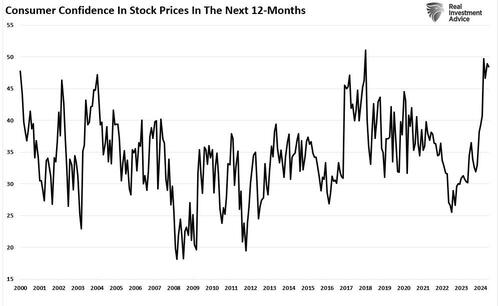
Of course, after a decade of 12% returns, why should they not be optimistic that the future will be much the same as the past? A good example came from a recent discussion with an individual wanting me to review the “financial plan” for their retirement goals. The plan was generated by one of the many “off the shelf” software packages that take all the inputs of income, assets, pensions, social security, etc., and then spits out assumptions of future asset values and drawdowns in retirement.
The problem is that the return assumptions were grossly flawed.
In the vast majority of these plans, the optimistic assumption is that individuals will have a rate of return of somewhere between 6-10% annually heading into retirement and 4-8% thereafter. The first major flaw in the plan is the “compounding” of annual returns over time, which does NOT happen.
“There is a massive difference between AVERAGE and ACTUAL returns on invested capital. Thus, in any given year, the impact of losses destroys the annualized “compounding” effect of money.
The chart below shows the difference between “actual” investment returns and “average” returns over time. See the problem? The purple-shaded area and the market price graph show “average” returns of 7% annually. However, the return gap in “actual returns,” due to periods of capital destruction, is quite significant.”

The second and most important is the future expectation of individual returns over the next 10-20 years.
This second point is what I want to address today.
There are two main reasons why returns over the next decade or two are currently overestimated. The first is a “you problem,” and the second is “math.”
It’s A You Problem
Back in 2016, I wrote an article discussing a Dalbar investor study explaining why investors consistently “suck” at investing. As I detailed in that article, one of the biggest impediments to achieving long-term investment returns is the impact of emotionally driven investment mistakes.
Investor psychology helps us to understand the thoughts and actions that lead to poor decision-making. That psychology drives the “buy high/sell low” syndrome and the traps, triggers, and misconceptions that lead to irrational mistakes that reduce returns over time.
As the Dalbar study showed, nine distinct behaviors impede optimistic investors based on their personal experiences and unique personalities.
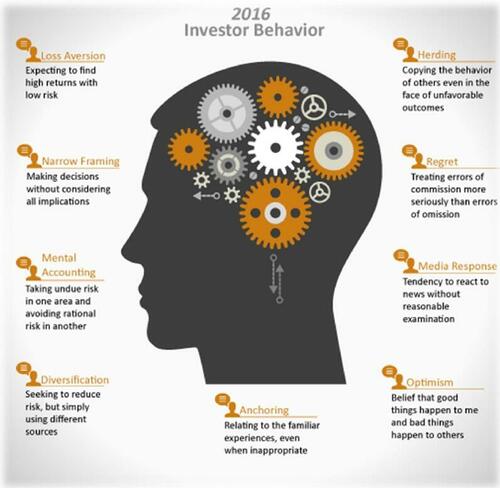
The most significant problems for individuals are the “herding effect” and “loss aversion.”
These two behaviors tend to function together compounding the issues of investor mistakes over time. As markets are rising, individuals are optimistic the current price trend will continue to last for an indefinite period. The longer the rising trend last, the more ingrained that optimistic belief becomes until the last of “holdouts” finally “buys in” as the financial markets evolve into a “euphoric state.”
As the markets decline, there is a slow realization that “this decline” is something more than a “buy the dip”opportunity. As losses mount, the anxiety of loss begins to mount until individuals seek to “avert further loss” by selling.
As shown in the chart below, this behavioral trend runs counter-intuitive to the “buy low/sell high” investment rule.”
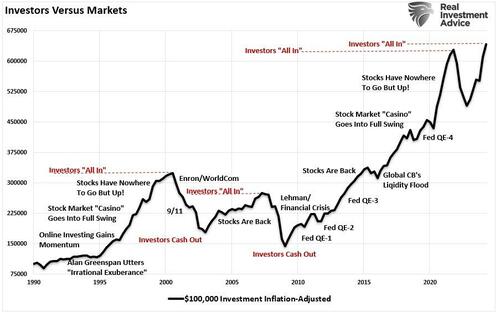
“In the end, we are just human. Despite the best of our intentions, it is nearly impossible for an individual to be devoid of the emotional biases that inevitably lead to poor investment decision-making over time. This is why all great investors have strict investment disciplines that they follow to reduce the impact of human emotions.
More importantly, despite studies that show that “buy and hold,” and “passive indexing” strategies, do indeed work over very long periods of time; the reality is that few will ever survive the downturns in order to see the benefits.”
The impact of these emotionally driven mistakes leads to long-term underperformance below those “goal-based” financial projections.
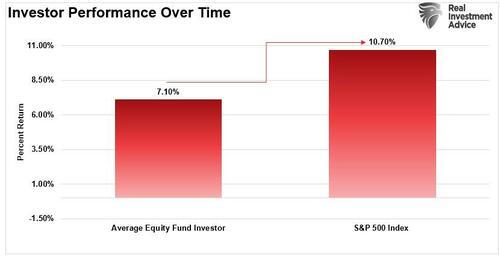
It’s Just Math
“But Lance, the markets has returned 10% on average over the last century, so I will probably be okay.”
True. If you can contract “vampirism,” avoid sunlight, garlic, and crosses, you can live long enough to achieve the “average annual rate of return” over the last 124 years.
For the rest of us mere mortals, and why “duration matching” is crucial, we only have between today and retirement to reach our goals. For the majority of us – that is about 15 years.
And therein lies the problem.
Despite much of the commentary that continues to suggest we are in a long-term secular bull market, the math suggests something substantially different. However, it is essential to understand that when low future rates of return are discussed, it does not mean that each year will be low, but the return for the entire period will be low.
The charts below show the 10- and 20-year rolling REAL, inflation-adjusted returns for the markets compared to trailing valuations.
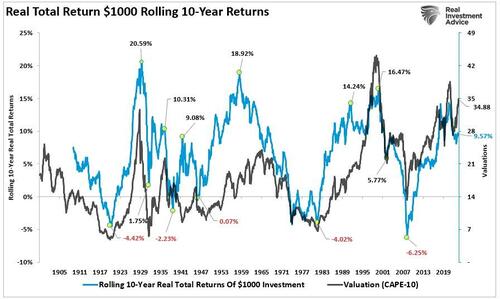
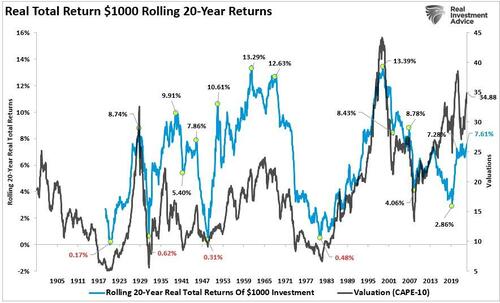
(Important note: Many advisors/analysts often pen that the market has never had a 10 or 20-year negative return. That is only nominal and should be disregarded as inflation must be included in the debate.)
There are two crucial points to take away from the data. First, there are several periods throughout history where market returns were near zero and negative. Secondly, the periods of low returns follow periods of excessive market valuations. Such suggests that betting “This time is not different” may not work well.
As David Leonhardt noted previously:
“The classic 1934 textbook ‘Security Analysis’ – by Benjamin Graham, a mentor to Warren Buffett, and David Dodd – urged investors to compare stock prices to earnings over ‘not less than five years, preferably seven or ten years.’ Ten years is enough time for the economy to go in and out of recession. It’s enough time for faddish theories about new paradigms to come and go.”
History shows that valuations above 23x earnings have tended to denote secular bull market peaks. Conversely, valuations at 7x earnings or less have tended to denote secular bull market starting points.
This point is proven simply by looking at the distribution of returns as compared to valuations over time.
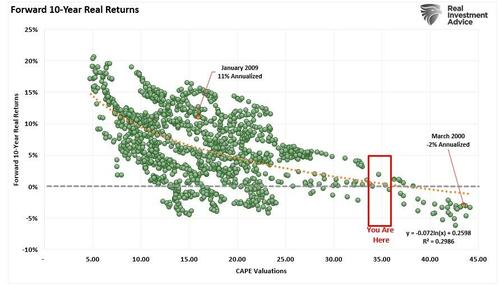
From current levels, history suggests that returns to investors over the next 10 and 20 years will likely be lower than higher. However, as I said, we can also prove this mathematically. As I discussed in “Rising Bullishness:”
“Capital gains from markets are primarily a function of market capitalization, nominal economic growth, plus dividend yield. Using John Hussman’s formula, we can mathematically calculate returns over the next 10-year period as follows:
(1+nominal GDP growth)*(normal market cap to GDP ratio / actual market cap to GDP ratio)^(1/10)-1
Therefore, IF we assume that GDP could maintain 2% annualized growth in the future, with no recessions ever, AND IF current market cap/GDP stays flat at 2.0, AND IF the dividend yield remains at roughly 2%, we get forward returns of:
(1.02)*(1.2/1.5)^(1/10)-1+.02 = -(1.08%)
But there are a “whole lotta ifs” in that assumption. Most importantly, we must also assume the Fed can get inflation to its 2% target, reduce current interest rates, and, as stated, avoid a recession over the next decade.”
In either case, these numbers are well below most financial plan projections, leaving retirees well short of their expected retirement goals.
Conclusion
While most analysis assumes that individuals should “buy and hold” indexed-based portfolios, the reality is quite different.
Retirement plans have a finite period for asset accumulation and distribution. The time lost “getting back to even” following a significant market correction should be a primary consideration.
Unfortunately, most investors remain woefully behind their promised financial plans. Given current valuations and the ongoing impact of “emotional decision-making,” the outcome will not likely improve over the next decade or two.
Markets are not cheap by any measure. If earnings growth slows, interest rates remain elevated, and demographic trends impact the economy, the bull market thesis will disappoint as “expectations” collide with “reality.”
Such is not a dire doom and gloom prediction or a “bearish” forecast. It is just a function of how the “math works over time.”
For optimistic investors, understanding potential returns from any given valuation point is crucial when considering putting their “savings” at risk. Risk is an important concept as it is a function of “Loss.“
The more risk taken within a portfolio, the greater the destruction of capital will be when reversions occur.
This time is “not different.” The only difference will be what triggers the next valuation reversion when it occurs. If the last two bear markets haven’t taught you this by now, I am unsure what will.
Maybe the third time will be the “charm.”
|
|
[Markets]
Oil prices remain lower amid Gaza ceasefire hopes, economic weakness in China
Oil declined Friday, contributing to a loss for the week, with prices weighed down by expectations of a Gaza ceasefire deal that would ease global supply concerns, as weakness in China’s economy implied a slowdown in energy demand.
Published:7/26/2024 9:35:30 AM
|
|
[Markets]
Consumer sentiment stuck at 8-month low on inflation angst
Published:7/26/2024 9:35:30 AM
|
|
[Markets]
What the CrowdStrike outage means for investors
Published:7/26/2024 9:10:42 AM
|
[Markets]
Sinaloa Drug Cartel Co-Founder Tricked Into Flying To Small US Airfield, Greeted With Handcuffs
Sinaloa Drug Cartel Co-Founder Tricked Into Flying To Small US Airfield, Greeted With Handcuffs
In a story destined to be dramatized on the big screen, a major Mexican drug lord was tricked on Thursday into flying aboard a small plane that landed near El Paso, Texas, where federal agents greeted him on the tarmac with handcuffs.
That big prize was 76-year-old Ismael "El Mayo" Zambada, who co-founded the infamous Sinaloa cartel with Joaquin "El Chapo" Guzman in the late 1980s. El Chapo was extradited to America in 2017 and is serving a life sentence at the federal supermax penitentiary in Florence, Colorado. El Chapo's son, Joaquín Guzman Lopez, may become his "so close and yet so far" neighbor at the Alcatraz of the Rockies, as he was also nabbed in the creative scheme -- and reportedly participated in it.
 Ismael "El Mayo" Zambada, now 76 years old, is said to have co-founded the Sinaloa Cartel three decades ago (Mexico Attorney General/AFP/Getty Images via Wall Street Journal) Ismael "El Mayo" Zambada, now 76 years old, is said to have co-founded the Sinaloa Cartel three decades ago (Mexico Attorney General/AFP/Getty Images via Wall Street Journal)
Attorney General Merrick Garland announced the arrests in a statement issued Thursday:
“The Justice Department has taken into custody two additional alleged leaders of the Sinaloa Cartel, one of the most violent and powerful drug trafficking organizations in the world...Both men are facing multiple charges in the United States for leading the Cartel’s criminal operations, including its deadly fentanyl manufacturing and trafficking networks."
According the Wall Street Journal's Homeland Security Investigations (HSI) sources, El Mayo was led to believe the small aircraft he was boarding would take him to survey covert airstrips inside Mexico. The scheme was months in the making, and was a joint project with the FBI.
Adding to the cinematic intrigue, a high-ranking cartel member is said to have tricked the two into boarding the US-bound airplane. Plot twist: The New York Times reports that it was Guzman Lopez -- El Chapo's son who was also aboard and arrested. Fox News' Bryan Llenas reports that a source tells him Guzman Lopez was said to have turned on El Mayo because he blamed him for his father's apprehension.
While the DOJ and DEA statements didn't identify the airstrip, reports from Reuters and KTSM indicate the plane landed at Santa Teresa International Jetport, which is located in New Mexico, just across the state line from El Paso. "One worker at the Santa Teresa airport...[said] that he saw a Beechcraft King Air land on the runway, where federal agents were already waiting," Reuters reports.
 The accused drug kingpins were flying in a Beechcraft King Air similar to this one (via AOPA) The accused drug kingpins were flying in a Beechcraft King Air similar to this one (via AOPA)
Since the Sinaloa Cartel is widely believed to be the foremost smuggler of illicit fentanyl, the twin-arrests represent a major triumph for federal law enforcement, and come at a time when Donald Trump and other Republican candidates are sharply criticizing the Biden administration's performance on that particular drug-war front.
Another of Chapo's sons, Ovidio Guzman, was extradited to the US in January 2023. El Chapo's four sons are known as "Los Chapitos," and the same name is used by the criminal organization they've run, which is one of four that comprise the Sinaloa Cartel. In October, the Sinaloa Cartel reportedly banned fentanyl production and trafficking, but the DEA dismissed the announcement as "probably a publicity stunt," noting that the volume of fentanyl seized at the border was undiminished.
"Fentanyl is the deadliest drug threat our country has ever faced, and the Justice Department will not rest until every single cartel leader, member, and associate responsible for poisoning our communities is held accountable," said Garland. Synthetic opioids -- including fentanyl -- were responsible for more than 74,000 deaths in the United States in 2023, according to the Centers for Disease Control and Prevention.
While the DEA crowed that the arrest of El Mayo represents an "enormous blow to the Sinaloa Cartel," don't count on it to have a material impact on the flow of drugs into the United States. "We aren’t talking about a structure that depends on a few kingpins — it’s very diffuse and resilient to these kinds of hits,” International Crisis Group senior analyst Falko Ernst tells the Times. In the near term, he adds, the principal result will likely be violence as the cartel's succession competition plays out.
It should also be noted that, in a grand example of unintended consequences of government market interventions, the rise of fentanyl is itself a product of the war on drugs. Per Richard Cowan's Iron Law of Prohibition, "As law enforcement becomes more intense, the potency of prohibited substances increases." That's because high-potency drugs are easier to smuggle -- giving a 10-pound parcel of fentanyl a far better risk/reward/ROI profile than a truckload of marijuana.
|
|
[Markets]
Watch the Vix for clues about where stocks may be headed
Published:7/26/2024 8:21:03 AM
|
|
[Markets]
Hedge funds stayed put during Wednesday market slide, Goldman says
Published:7/26/2024 8:02:09 AM
|
|
[Markets]
AMC’s summer box office set to ‘rebound notably’ says Wedbush
AMC Entertainment Holdings Inc. is set to benefit from an improved summer box office, according to analyst firm Wedbush.
Published:7/26/2024 8:02:09 AM
|
|
[Markets]
Charter’s stock could post best day in five years after earnings
Published:7/26/2024 7:53:34 AM
|
[Markets]
ChatGPT Launches AI-Powered Search Engine Prototype
ChatGPT Launches AI-Powered Search Engine Prototype
Authored by Turner Wright via CoinTelegraph.com,
According to OpenAI, SearchGPT will give users a more intuitive search experience, allowing them to ask questions to refine a search as they would using ChatGPT.
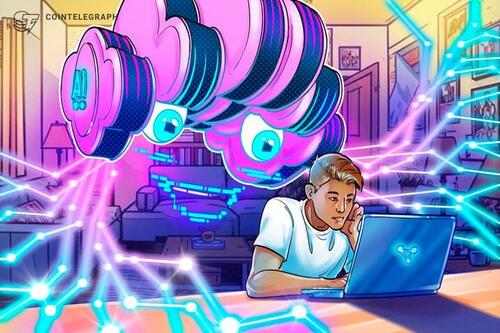
OpenAI’s ChatGPT has announced the launch of a search engine, presumably as a potential rival to Google.
In a July 25 notice, ChatGPT’s website included a page for ‘SearchGPT,’ a prototype “using the strength of our AI models to give you fast answers with clear and relevant sources.”
SearchGPT was not available for all users at the time of publication, as the platform is awaiting feedback from a small group before a full release.
According to the platform, results will be more visual than Google’s and allow follow-up questions to refine a search.
For example, SearchGPT has partnered with publishers and creators, citing sources in relevant search results.
“While this prototype is temporary, we plan to integrate the best of these features directly into ChatGPT in the future,” said OpenAI.
|
|
[Markets]
SEC accuses activist investor Andrew Left and Citron of making $20 million by misleading investors
SEC charges firm with selling stocks after allegedly recommending readers to buy them.
Published:7/26/2024 7:45:00 AM
|
|
[Markets]
Breaking PCE inflation news: Prices rise 0.1% in June, core up 0.2%
Published:7/26/2024 7:36:30 AM
|
|
[Markets]
Apollo Global Management to acquire gaming companies IGT and Everi in $6.3 billion deal
Apollo to buy both companies after they had agreed to a merger deal in February.
Published:7/26/2024 7:25:29 AM
|
|
[Markets]
Money buys a better position. Just look at Southwest’s new seating.
Airline seating is much like America’s economic divide — the less room you have to be comfortable, the more likely you’ll get stuck in a miserable middle position.
Published:7/26/2024 7:25:28 AM
|
|
[Markets]
Market bubbles expand longer than many expect. But this metric shows valuations will matter.
Valuation may not matter in the short term but it eventually does, says this fund manager
Published:7/26/2024 6:54:17 AM
|
|
[Markets]
Royal Caribbean CEO explains why cruises are so popular
Royal Caribbean reported Thursday quarterly profit that beat expectations and raised its full-year outlook, citing continued strong demand for cruises into next year and increased onboard spending.
Published:7/26/2024 6:45:17 AM
|
|
[Markets]
Arson attacks paralyze French rail network hours before start of Olympics
Published:7/26/2024 6:19:42 AM
|
|
[Markets]
Bristol Myers Squibb results beat expectations as newer drugs deliver growth
Bristol Myers Squibb Co. on Friday reported second-quarter results that topped analysts’ estimates as some of the company’s newer drugs began to hit their stride.
Published:7/26/2024 6:11:25 AM
|
|
[Markets]
The life of two Boeing Starliner astronauts stuck indefinitely in space
Astronauts Butch Wilmore and Suni Williams blasted off for a short trip on June 5. Almost two months later, they’re still in space.
Published:7/26/2024 6:11:25 AM
|
[Markets]
African Countries Are Turning To Gold
African Countries Are Turning To Gold
Authored by Mike Maharrey via MoneyMetals.com,
A growing number of African countries are turning to gold to hedge geopolitical risk and protect against currency losses.

Nigeria, Uganda, Zimbabwe, Madagascar, and several other African nations have made moves to increase gold reserves, bring their gold home, and even back their currencies with the yellow metal.
South Sudan is the latest country to turn to gold. Last weekend, the country’s central bank governor said he plans to expand the country’s gold reserves.
“We are in the stage of preparing policy documents and studying examples of other countries and lessons drawn.”
Earlier this month, the Ugandan central bank announced a domestic gold-buying program to purchase gold directly from local artisanal miners to help “address the risks in the international financial markets.”
In June, Tanzania announced a plan to spend $400 million on six tons of gold. Tanzania Finance Minister Dr. Mwigulu Nchemba also issued a directive to curb the widespread use of the U.S. dollar in the country.
Nigeria has launched a domestic gold-buying plan to bolster its reserves. In addition to buying locally sourced gold, the Nigerian central bank has announced plans to bring its existing gold reserves back into the country “to mitigate risks associated with the weakening U.S. economy.”
“Economic indicators such as rising inflation, escalating debt levels, and geopolitical tensions have raised apprehensions among Nigerian policymakers about the stability of the U.S. financial system.”
Last year, the Central Bank of Madagascar implemented a domestic gold purchases program as income from vanilla exports declined.
As an analyst explained to Bloomberg, “Central banks can add gold to their official reserves using their local currency, allowing them to grow reserve assets without having to sacrifice other hard-currency reserves.”
Meanwhile, a presidential candidate in Ghana recently said he would back the country’s currency with gold if he wins the election.
“Ultimately, my goal is that we are going to back our currency with gold and that is where I want us to go, increasingly backing our currency with gold.”
This would follow the lead of Zimbabwe, which created a gold-backed currency earlier this year. The ZiG (Zimbabwe gold; ZiG; ZWG) replaced the Zimbabwean dollar (RTGS; 1980-2008: ZWL). The currency is a “structured currency” backed primarily by gold but also by other forex reserves including U.S. dollars (USD).
To some degree, African leaders and central bankers are trying to fix problems they created by printing too much money and running up dollar-denominated debt.
But they are also concerned about America’s weaponization of the dollar and other risks associated with the greenback including the profligate spending and growing national debt.
A Tellimer (Dubai) emerging market equity strategy told Bloomberg the move makes sense.
“For countries taking a view that either the price of gold is going to go up, the price of the U.S. dollar is going to go down, or their access to U.S. dollars may be compromised by sanctions then increasing the allocation of gold in their reserves might make sense.”
|
|
[Markets]
Liquidation of crowded trades is healthy but levels must hold: Bank America
Published:7/26/2024 5:56:09 AM
|
|
[Markets]
Hedge-fund giant Man says assets reach record levels
Man Group, the world’s largest publicly traded hedge fund manager, on Friday said investment gains helped its assets under management grow by 17.5% in the first half to record highs of $178.2 billion.
Published:7/26/2024 5:56:09 AM
|
|
[Markets]
Who’s most likely to adopt — or get adopted
This week, we do a deep dive into your many, many — oh so many! — questions about adoption.
Published:7/26/2024 5:22:10 AM
|
|
[Markets]
Dow futures rise after worst three-day stretch for S&P 500 in nine months
Published:7/26/2024 4:40:10 AM
|
|
[Markets]
Buy the dip on Nvidia and other chip stocks? Not quite yet, says this analyst.
Should investors use the recent weakness in semiconductor stocks as a buying opportunity? Not quite yet, according to one analyst.
Published:7/26/2024 4:24:56 AM
|
[Markets]
Artificial Intelligence Is Sparking A Copper-Boom In Zambia
Artificial Intelligence Is Sparking A Copper-Boom In Zambia
Authored by Felicity Bradstock via OilPrice.com,
-
Zambia's copper reserves, boosted by AI-driven exploration, are set to play a crucial role in meeting the surging global demand for electric vehicles and renewable energy.
-
The country has the potential to become a major supplier of copper, reducing reliance on other nations and contributing significantly to its economy.
-
To maximize the benefits of this mining boom, Zambia needs to invest in downstream industries and improve its investment climate to attract further foreign investment.
Zambia is attracting the attention of the world’s energy and mining companies as it shows significant potential for critical mineral extraction. Innovative technologies have helped uncover massive deposits of copper in Zambia, which could help massively expand the country’s mining industry over the next decade. This discovery could help provide the resources needed for the massive clean tech pipeline and make Zambia a critical minerals hub for years to come.

The digital exploration company KoBold Metals has spent several years developing complex artificial intelligence (AI) technology to enhance mineral exploration activities around the globe. This month, KoBold announced it had likely made the largest copper discovery in over a decade thanks to this technology. The find in Zambia could contribute to the production of 300,000 tonnes of copper annually, worth billions of dollars. When developed, two decades of production in KoBold’s discovery region could provide enough copper to manufacture around 100 million electric vehicles (EVs). A third-party company corroborated KoBold’s claims, agreeing there is significant potential for using AI technology for exploration activities. KoBold hopes to develop a $2.3 billion copper mine in Zambia to commence production by the early 2030s.
The demand for copper and other critical minerals has been rapidly growing in recent years, a trend that shows no sign of slowing as countries around the globe increase their renewable energy capacity and roll out clean technologies. In 2023, the total copper mine production was estimated at around 22 million metric tonnes, marking a significant increase from 16 million metric tonnes in 2010. Production is expected to increase to around 30 million metric tonnes a year by 2036 as the global demand grows. However, there are fears that this increase in supply will not be enough to meet the rapidly rising demand for the critical mineral.
In addition to renewable energy development, the demand for copper is expected to increase significantly with the rollout of new technologies, such as AI. Data centres will require vast amounts of copper and other critical minerals in the coming years. This is expected to boost the value of copper substantially. According to Bank of America, supply shortages and the growth in demand could increase the price of copper by 11 percent, to $5.44 per pound by 2026. This is bad news for renewable energy producers but great news for countries with untapped copper deposits, just as Zambia.
New exploration technologies are helping mining companies improve their prospects, advancing exploration practices that have remained relatively unchanged over the last century. In addition, as the U.S. is concerned about its heavy reliance on China for critical minerals, new technologies could help American companies boost their mining capacity and ensure the country’s energy security. Connie Chan, a partner at venture capital firm Andreessen Horowitz, stated, “The more you realize how dependent we are on these technologies, the more you ask: How the hell were we so slow to the fact that we needed vast amounts of raw material to make it all possible?”
Recent estimates suggest that Zambia was the world’s 10th largest copper producer in 2023, producing around 4 percent of the world’s copper and increasing its output by 4 percent between 2022 and 2023. Production in the southern African country increased at a CAGR of 2.68 percent between 2017 and 2022 and is expected to grow at a CAGR of 2 percent between 2023 and 2027. Chile, Peru, the Democratic Republic of the Congo (DRC) and China are currently the world’s biggest copper producers, but there is major potential for Zambia to further develop its resources. First Quantum Minerals, Barrick Gold and Glencore are among the major producers operating in Zambia.
Copper exports contribute over $6 billion of Zambia’s annual revenue. However, there is great potential for growth according to a recent report from the London School of Economics' International Growth Centre (IGC). The industry mainly centres around extraction and early-stage refinement at present, but greater value could be added through the development of Zambia’s downstream activities. Most of Zambia’s copper comes from 10 mines in its Copperbelt province, with new discoveries slowly expanding production to other areas of the country. The IGC suggests that Zambia could attract higher levels of foreign investment in its minerals industry by improving its tax regime, which is currently unstable, and has deterred investors in the past. The IGC report also encourages Zambia to deepen ties with neighbouring DRC to establish a special economic zone (SEZ) to attract investment and create a manufacturing sector to add greater value.
Zambia’s copper mining industry is expected to grow significantly in the coming years, following several successful production years. New technologies, like the AI tech being used by KoBold, could help enhance exploration activities in Zambia to boost production as the global demand for copper rises. In addition, there is significant potential to add value to the sector through the development of its downstream activities and greater collaboration with neighbouring producers the DRC.
|
|
[Markets]
OpenAI announces SearchGPT in challenge to Google
OpenAI has announced it’s going into the search business in a direct challenge to Google’s dominance.
Published:7/26/2024 3:58:56 AM
|
[Markets]
To Hell With The Will Of The People...
To Hell With The Will Of The People...
Via ReMix News,
The globalist left is increasingly unscrupulous in its disregard for the voters’ choice.
The third-strongest faction, the Patriots for Europe, will not have a single official in the European Parliament. It won’t happen, because the globalist-Jacobin majority —which, for the sake of simplicity, is mostly called “the left” — is violating all written rules and customary law and ignoring the will of the people and has now prevented it. The Ursulas announced that, in their opinion, the sovereigntist faction — largely created by Viktor Orbán— is far-right and, as such, anti-Europe, anti-progress and anti-humanity, and therefore should be quarantined, isolated and suffocated.
There is no talk of their deportation yet, but based on the dynamics of events, this may even happen in a few years.

Germany's Manfred Weber, of the group of the European People's Party listens during a press briefing at the European Parliament in Strasbourg. (AP Photo/Jean-Francois Badias)
So the Patriots get nothing, let alone positions — perhaps even eventually a few bullets, like Fico and Trump. This is how people’s representation “works” for the champions of democracy in Brussels.
In fact, one of the pillars of Ursula von der Leyen’s forthcoming five-year EU commission presidency will be to break down resistance to the imperialism of the EU, to remove the veto of small states, especially the meddling Hungary. If there is no veto, everyone will do what the big ones want. In other words: “Shut up!”
Now, imagine for a moment that in the Hungarian parliament, opposition parties could not nominate vice-presidents to head the House, could not have committee chairs and vice-chairs. Obviously, the problem is with the Hungarian conception of democracy, but in this country such a thing has not even been thought of — neither during the period of left-wing nor right-wing governments did anyone think of such a despicable act, such disregard for the will of the electorate. But Brussels has done so without scruples. They take part in this disgusting act and in the meantime, act as if nothing had happened, as they continue lecturing us about democracy, the rule of law, checks and balances.
Where is the respect for the will of the voters? The rule of the people? The principle of popular sovereignty? Of course, we Hungarians have a dictatorship on the rampage, where even with a two-thirds majority from Fidesz, there is always an opposition leader (this time Zoltán Sas, a Jobbik member of the National Security Committee), not to mention the opposition deputy speakers of the National Assembly and many other officials.
So goes the trampling of voters by the European People’s Party (EPP). In order to give the globalists a majority, Manfred Weber, with the spine of a snail, has teamed up with the Bolsheviks — as if he had just been ordered to do so by text message. He lured the more naive right-wingers to his side with blatant lies and nationalist promises, only to be swept away by the left’s agenda.
Even though his voters are fed up with illegal migrants, Weber and his crew do not care — with their approval they will continue to fly and ship millions of Africans and Asians into the continent because the population replacement must continue. Weber is like a hijacker: He has hijacked the right-wing vote. If I say that this figure is a fraud, a scoundrel traitor, a moral lunatic, I am certainly putting it too mildly.
But it’s not just the will of the voters that globalists ignore. A few years ago, during one of the hearings of the show trials against Hungary, the European Parliament failed to get the necessary number of votes for the next “yes” vote, so the vote was repeated the next day, citing “technical reasons.” So it was done. Ursula can roll her dice all she wants at home until she gets the position she wants, it’s a private matter. But the Union is not a flea circus, and we didn’t join it to be the playthings of evil villains who wipe their muddy boots on us every day.
The same was done when the Sargentini report was adopted: Abstentions were not taken into account, in violation of the EU treaties and the European Parliament’s Rules of Procedure, because that was the only way to force through the opening of Article 7 proceedings against our country. Of course, the European Court of Justice later legalized this breach of the law, but there is nothing surprising in that. The law is just a front for them; they are in fact the people’s commissioners of the open society. See their latest gigantic penalty against Hungary in the quota case.
The Ursulas are just puppets, doing whatever the Democratic puppet masters in Washington want them to do. It is therefore theoretically impossible for them to carry out what the majority of European voters want and what they are supposed to have been entrusted with. They are not interested in, and are even irritated by, the fact that the majority of Europeans do not want population replacement, multiculturalism, war, sanctions and war inflation.
In the autumn of 2022, German Foreign Minister Annalena Baerbock summed up perfectly the Western elite’s view of democracy: “But if I promise the people of Ukraine that we will be on their side for as long as they need us, I intend to deliver. No matter what my German voters think.” Really, what do the voters’ opinions matter, right? The will of the people. The people are stupid, but the clever Baerbocks will do it for them. And if all these “smart” Baerbocks happen to start a world conflagration (apparently that’s their goal), so be it. We would have liked to have launched these half-wits into space in time.
Even in the supposed home of democracy, the United States, much is made of the opinion of the electorate, respecting the will of the people. For months, for years, people have been saying how healthy, how fresh and fresh in spirit President (Biden) is. Their soapboxes have been slamming the table, repeating that Biden is not lost in his own backyard, that he is not dozing off during a meeting, that it is all a lie of right-wing propaganda.
My favorite is the “fact-finding” by the Soros group Lakmusz, in which they proved, even in the moments before the fall, that footage of the president wandering around was manipulated.
Then Biden was pushed back from the presidential nomination like a draft. But the operators of the Biden remote control are betting big that millions of Americans put their faith in this old man in the Democratic primaries this spring after all. And when he was put in the Democratic seat, they knew exactly what a desperate state he was in: He was no less stammering and rambling then than he is now. So they had to have it, and the will of the people should be respected. By the way, if Biden is as unfit to run for president as he is now said to be — and as he was in 2020, by the way, but his caretakers denied it then — is he not unfit to run for president for the remaining six months?
It is getting more and more hypocritical, more and more shabby, both over there and here in Brussels. The way they blather on about democracy, the rule of law, diversity and solidarity.
The way they try to make you believe that they are democrats, while if you dare to say anything different from them, they threaten you, blackmail you, take your money and send you to Kyiv. Lately they’ve been talking about expelling us.
Elina Valtonen, the Finnish foreign minister, recently predicted that “Hungary should think about whether it is right for it to be a member of the EU, given its different values.”
OK, we will think about it.
There can be only one thing of value: what they have.
Only one opinion: theirs.
And only one party: the socialist-green-communist-democratic-rainbow coalition.
The future Party.
Everyone else is a Nazi. The cheeky people too, because despite the brainwashing they no longer applaud enthusiastically enough.
|
|
[Markets]
Mercedes lowers margin guidance for cars as quarterly profit falls 16%
Mercedes-Benz Group on Friday reiterated its financial goals for the year, but with a better margin for vans and a worse one for cars.
Published:7/26/2024 3:22:35 AM
|
[Markets]
Georgia Is The Next Country That Might Face A High-Profile Assassination Attempt
Georgia Is The Next Country That Might Face A High-Profile Assassination Attempt
Authored by Andrew Korybko via substack,
Georgia’s State Security Service (SSS) informed the public that they’re investigating a criminal group linked to the former government which plotted to assassinate the founder of the ruling Georgian Dream party. According to RT, Prime Minister Irakli Kobakhidze claimed that these are the same forces that were behind the attempted assassinations of his Slovak counterpart Robert Fico and former US President Donald Trump, while Politico cited local media to report that the Georgian Legion is under suspicion.

It was explained in early May why “The Georgian State Security Service & The Georgian Legion Are On The Brink Of War”, namely because that pro-US armed group can play a crucial role in catalyzing a spree of urban terrorism ahead of, during, or right after fall’s parliamentary elections. The preceding analysis followed the failed attempt by rioters to storm the parliament over a week prior in protest of their country’s FARA-inspired foreign agents legislation, which readers can learn more about here.
In brief, although the ruling conservative-nationalist party aspires to join the EU and NATO, it doesn’t want to surrender the country’s sovereignty to the West in exchange and that’s why it’s been targeted for regime change over the past year and a half. The replacement of Georgian Dream with Western puppets would lead to “NGO”-propagated liberal-globalist values destroying their traditional society, hence the need for the foreign agents law, but there are also geopolitical consequences too.
The authorities warned last year that the prior attempt to overthrow them was aimed at opening up a second front against Russia, while there’s also the chance that a puppet regime would allow Georgia to be used by NATO to send more armed aid to Armenia in preparation of another war against Azerbaijan. Georgian Dream wants to stay out of all regional conflicts, so much so that it hasn’t even sanctioned Russia, which is yet another argument against their continued rule from the West’s perspective.
Speaking of Russia, its foreign intelligence service released a statement in early July warning that the West is preparing to exploit fall’s parliamentary elections as the pretext for another regime change attempt, and it’s possible that they shared information about this with their Georgian counterparts. That could explain why the local media cited by Politico said that some Georgian Legion members have been detained for questioning, while their leader claimed that 300 others have been added to the wanted list.
Although comparatively small in number, this pro-US armed group could play a similar role in Tbilisi later this year as the Azov Battalion did in Kiev a little more than a decade ago during “EuroMaidan”, which was explained in the earlier hyperlinked analysis about why they’re on the brink of war with the SSS. The most effective “Democratic Security” policy that Georgian Dream can promulgate right now is banning the Georgian Legion as a terrorist group if the ongoing investigation ties them to the assassination plot.
Allowing them to continue operating inside the country with impunity would constitute an enormous risk to Georgia’s national model of democracy considering the likelihood that they’ll catalyze a spree of urban terrorism ahead of, during, or right after the upcoming elections at the US’ regime change behest. Cracking down on this group ahead of the vote would greatly neutralize their ability to disrupt the democratic process and make associated Hybrid War threats much more manageable for the authorities.
Aware that the window of opportunity for destabilizing their country might soon close, the Georgian Legion might desperately try to carry out a high-profile assassination attempt in the near future, even if it isn’t against the ruling party’s founder but someone else like the Prime Minister and they use a patsy instead of their own members. Everyone should therefore keep a very close eye on Georgia since it’s still a major New Cold War battleground given its geostrategic significance in the broader region’s dynamics.
|
[Markets]
Civil Unrest Is The Next Most Predictable Crisis For America Now
Civil Unrest Is The Next Most Predictable Crisis For America Now
Authored by Brandon Smith via Alt-Market.us,
For the past six months I’ve been writing about the clear uptick in civil war rhetoric within the establishment media in the US, and we all know that the coming presidential election is the reason for it. The bottom line is that no matter who ends up in the White House in 2025 there will be mass violence, but most of this violence will be reserved for the possibility of Donald Trump’s return.
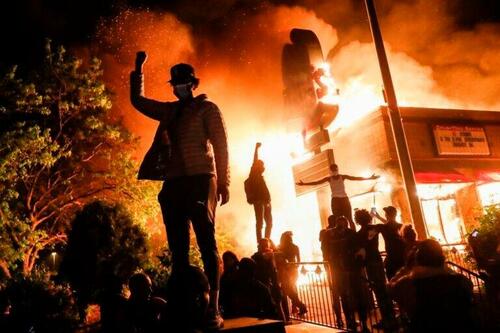
Set aside the recent attempted assassination (and how the Secret Service made it possible) for a moment and let’s consider the common leftist response to it – Around 30% of Democrats believe the attack was “staged” (virtually impossible given the circumstances and evidence). The rest are enraged that the shooter missed. No event has exposed the political left for what they truly are more than the near-murder of Donald Trump. We are dealing with bloodthirsty mental deficients that will do anything to win.
The “false left/right paradigm” is dead, at least when it comes to average American citizens. The political left is not just an innocent subset of the population being led astray by false leadership – They are a big part of the problem. They are willing participants in the destruction of the west. Globalists would get nowhere on economic centralization, the DEI agenda, the trans agenda, carbon taxation, anti-2A legislation, open borders, etc. without help from a large portion of leftists.
I have long cautioned that the political left is slowly but surely becoming a happy cannon fodder army in service to globalism. And sadly, leftists tend to engage in warfare while conservatives tend to engage in politics. Leftists use any means necessary and feel thoroughly justified. Conservatives color within the lines for fear of being accused of “fascism.” We don’t have to abandon our moral compass, but the sooner we realize that war is being waged on us the sooner we can defend ourselves against it.
As we have seen in Europe (in France the past month), any perceived shift towards conservative influence in government will undoubtedly result in riots and chicanery from socialists. The media has so infected the minds of progressives that they truly believe they are the “good guys” and that conservatives intend to “end democracy.” Thus, in their view all violence or sabotage against conservatives (and independents) is justified.
In the long run the left’s violence and hysteria is only inspiring conservatives to respond with aggression in kind. This is where the potential for civil conflict arises. Leftists argue that only they are virtuous enough to be allowed to dictate policy and law. Yet, their ideology also embraces moral relativism, so you can see where this thing is headed…
They will continue to press for the erosion of western heritage and principles and, eventually, regular people are going to fight back; they have no choice. Leftists and globalists expect resistance, to a point. I believe part of their strategy is a classic communist provocation; for patriots to react with violence thereby giving the establishment fuel for a demonization campaign (much like January 6th). It’s not going to go the way they think it will next time and the response will be far larger and more swift than they anticipate.
Meanwhile, if Trump enters office again the rioting America dealt with in 2020 will be a cakewalk compared to 2025.
Progressives claim they are “protecting democracy” but you will see very quickly that as soon as democracy doesn’t go their way they will abandon it in a heartbeat and seek to prevail using other methods.
This means a campaign of “monkey wrenching” followed by riots, looting and disruptions in major cities.
One rising trend that should have all business owners and preppers on alert is the use of social media apps to coordinate seemingly spontaneous riots. These events can be organized within hours, encouraging some of the worst people to congregate and strike a business block without ever meeting each other before. What I worry about is that these methods will expand beyond business districts and local government buildings.
Travel routes will come under threat, freight could be targeted and we may even see looters and rioters move into residential areas further away from the city center. Supply chain issues will surely arise. At the very least there will be concerns among freight drivers that they are taking a risk carrying truckloads of goods into places where they could be surrounded by an angry mob and hijacked (or worse).
Large scale crime in general is bad for the economy. As we’ve witnessed in cities like Chicago and San Francisco, unchecked crime forces companies to move out of a region and leave those places barren. They call it a “food desert” – A place where tens of thousands of people have no close access to groceries or retail goods. Looting and rioting are an accelerating catalyst for this scenario. Once stores are looted or burned, they may never try to rebuild.
What I am describing is a much larger number of incidents with a longer duration than 2020. I’m talking about prolonged civil unrest and I predict this will become the norm going into next year. Don’t count on the government to provide sufficient aid. Don’t count on FEMA rations or a national guard response that does anything other than exacerbate the problem. Don’t rely on outside help – You’ll regret it.
There are different levels of civil unrest. Sometimes it starts as a less malicious redress of grievances, but often it becomes a vehicle for random destruction. The best way to counter indiscriminate violence is with directed and focused self defense, along with the proper supplies to keep you going until things calm down.
Also, don’t think just because you live in the suburbs or a rural town that these threats don’t concern you. In Argentina during their economic collapse in 2001, gangs of looters stalked rural areas with impunity while cities ground to a standstill. Once the cities are hollowed out, where do you think the worst people will go next?
In the US we have similar circumstances to Argentina in which economic crisis has the ability to feed directly into preexisting divisions. Politically motivated bad actors could be inspired to sabotage normal services in the face of limited law enforcement opposition. There are people who will do anything to get their way.
Organize accordingly and keep your own supplies ready. There are plenty of people out there that think they are owed something. They think they are owed a political win, or social power, or maybe they just think they’re owed access to other people’s stuff.
Right now the US is a powderkeg waiting to go off and the coming election period will be the fuse.
* * *
If you would like to support the work that Alt-Market does while also receiving content on advanced tactics for defeating the globalist agenda, subscribe to our exclusive newsletter The Wild Bunch Dispatch. Learn more about it HERE.
|
[Markets]
An Empire Of Lies
An Empire Of Lies
Authored by Brian Maher via DailyReckoning.com,
Why does government lie so repeatedly — and so atrociously?
Why does it fear truth as the vampire fears garlic?
The answer, we hazard, reduces to its desperate quest for prestige.
Government equals authority. And an authority is an authority.
Its word must be the final word. Its word must be the ultimate word.
A supreme authority cannot withstand rivals — else its authority falls into question.
It cannot endure mockery, ridicule or derision.
And if its undeniable incompetence is exposed, its back goes up… and its dukes go up.

Consider for example Monday’s congressional testimony of a certain Kimberly Cheatle…
The Greatest Sin Against Government
Ms. Cheatle directed the United States Secret Service when an aspiring assassin made a mockery of the lady’s organization.
How can a murderous fellow scale a low rooftop with a rifle — some 140 yards from a former and potentially future United States president — and let eight projectiles loose — before being scotched?
Here he was… placing his thumbs in his ears… wiggling his fingers… and putting out his tongue at Ms. Cheatle and the organization she bosses.
And in the private opinion of Ms. Cheatle, that is the highest sin. It is not act itself.
Is greater professional incompetence scarcely conceivable? We do not believe it is.
“It’s an Ongoing Investigation”
Yet the lady donned her armor, barricaded herself within fortress walls and deflected all questions concerning her agency’s abominations.
She could not answer this question or that question because it is an “ongoing investigation.”
“Was July 13 a Saturday, madam?”
“It’s an ongoing investigation.”
“What time did the attempted assassination take place? What was the local temperature?”
“It’s an ongoing investigation.”
“What color blazer was the former president Trump sporting?”
“It’s an ongoing investigation.”
“In which hemisphere of Earth did the incident occur?”
“It’s an ongoing investigation.”
“What color is the sky?”
“It’s an ongoing investigation.”
Governing Means Never Saying You’re Sorry
Could the lady openly and candidly concede her organization’s botchwork? What government functionary ever does?
Imagine her arguing, for example, that her sniper may have failed to shoot first because his scope was trained not on the rooftop — but on the fetching young lady in the third row with the cropped top and the shortest shorts.
Imagine her arguing that the 5’4” female agent lacked the height to cover adequately her 6’3” protectee.
Furthermore, that the identical female agent was admitted to the United States Secret Service on a sliding scale — that she did not satisfy the physical standards required of men.
Imagine her conceding that her personnel were snoozing on the job.
Have you imagined these potentialities? Then you have imagined impossibilities.
Ms. Cheatle would never concede any of them even if true.
That is because she fears for her (former) agency’s prestige.
The Bigger the Organization, the Bigger the Lies
“Why are you stating the obvious?” comes your retort.
“Every organization, from the smallest business concern to the largest business concern, from any local government to the federal government, fears for its prestige.
“No organization wants to be publicly embarrassed.”
You are of course correct.
Yet the larger the organization, the larger its scope. Thus the greater number of lies — and scale of lies — it must tell to cling to its prestige.
Imagine you are the proprietor of a local business concern.
You quake in fear of the competition. And you are hot to scotch it.
Imagine the lengths to which you proceed… the fibs you tell… to defend and expand your localized little empire.
What misdemeanor — indeed, what felony — wouldn’t you execute if it advantaged you?
Yet your enterprise maintains a very constricted reach. It represents a nearly absolute insignificance to the world beyond.
Who cares if you claim to be the most superior plumber in Springfield when you manifestly are not?
A Local Government Can Manage Its Lies
Next imagine that you are not a business concern. You are instead a local government concern.
You are its mayor.
You must tell your lies to glitter before your captives, your residents.
The business may be difficult at times — yet it is manageable.
You must lie about the efficiency of the Motor Vehicle Department or the Highway Department, for example.
You must lie about the bribes you have accepted. You may therefore maintain your prestige.
Yet the scope of your lies is contained with your narrow borders.
A nation — a normal nation — must likewise tell its lies to hold up its prestige.
It may be difficult at times. Yet if the nation is reasonably sized and has little ambition, it is, again, possible.
In highest contrast stands the government of the United States…
The Burden of Maintaining Global Prestige
This is an empire that exerts dominion over each individual, over each local municipality, over each state municipality within these shores — from oceans Atlantic and Pacific, from the border with Mexico to the border with Canada.
Imagine the impossibility of managing such a vast space.
The United States government manages the job very poorly.
Yet by its nature it must maintain its prestige among the American people. It must therefore inform you that it performs the job very well.
It will stare you in the eyes… and lie to you… even if it knows that you know it is lying to you.
Yet the United States is the world’s reigning kingpin, its dominant power.
Its wingspan therefore covers the entirety of planet Earth. Does a single sparrow fall outside its awareness?
Imagine — then — the lies it must tell to maintain its prestige among all the nations of Earth…
Lies of Commission and Omission
Who detonated the Nord Stream pipeline transmitting natural gas from the Russian Federation to the German republic?
The answers reduce to the United States itself, one of its European allies or the nation of Ukraine.
Do you believe the United States government is unaware of the answer?
Yet imagine the catastrophic damage to its reputation if it revealed the answer.
It would concede that the United States itself executed the largest act of environmental sabotage in all of history — and heavily wrecked the economy of its central NATO ally — or that another NATO ally did the deed.
Or that the nation it stands impassionedly behind, Ukraine, did the deed.
It must therefore shrug its shoulders in befuddlement or inform you that Russia blew holes in its own pipeline.
It is a lie of omission or a lie of commission.
We’re the Good Guys Here
Imagine if the United States government conceded that Russia’s unprovoked aggression was very much provoked?
And that it was the saboteur of peace talks between Russia and Ukraine that would have ceased the bloodletting one month after it commenced.
Public support for the Ukrainian cause — in the United States and abroad — would collapse in a heap.
United States government prestige would absorb a fatal blow.
It must therefore babble lies.
It must tell you that Mr. Putin’s aggression was not provoked. It must inform you that he will be at the English Channel within no time if he is not heaved out of Ukraine.
It must inform you that it is battling on behalf of democracy.
From the Middle East to East Asia, from South America to Africa, the identical dynamic obtains.
If the Antarctic continent were sufficiently populated, it would extend there too.
Empire of Lies
Our co-founders Bill Bonner and Addison Wiggin once labeled the United States an empire of debt.
It is an empire of debt, yes. It is certainly an empire in debt.
Yet in the more fundamental sense it is an empire of lies.
The emperor in charge of it is presently being exposed — he is well and truly nude before a gaping world.
Yet this emperor will never concede his nudity…
|
[Markets]
Major American Cities Facing 'Day Zero Water' Crisis, Say Experts
Major American Cities Facing 'Day Zero Water' Crisis, Say Experts
Authored by Autumn Spredemann via The Epoch Times (emphasis ours),
The term “day zero water” has become synonymous with a worst-case scenario for public water resources. It refers to a moment in which a city or region’s water supply is almost depleted and officials cut tap supply to communities.
 A buoy that reads “No Boats” lays on dry waterbed at Lake Mead, Nev., on July 23, 2022. Water levels in Lake Mead are at the lowest level since April 1937 when the reservoir was first filled with water, according to NASA. (Frederic J. Brown/AFP via Getty Images) A buoy that reads “No Boats” lays on dry waterbed at Lake Mead, Nev., on July 23, 2022. Water levels in Lake Mead are at the lowest level since April 1937 when the reservoir was first filled with water, according to NASA. (Frederic J. Brown/AFP via Getty Images)
This crisis was narrowly averted in 2018 in Cape Town, South Africa, which approached the threshold of a day zero event after rationing was almost not enough.
Subsequently, environmental researchers and resource insiders have voiced concern over the possibility of water running out in U.S. cities after years of drought have reduced groundwater in places such as the Great Plains and the Southwest.
In a recent study published in Nature, researchers noted “rapid groundwater-level declines” globally in the 21st century of more than 0.5 meters (20 inches) per year across 170,000 monitoring wells and 1,693 aquifer systems.
This includes water resources in the United States.
The study authors further observed groundwater declines have accelerated over the past four decades, highlighting an “urgent need for more effective measures to address groundwater depletion.”
The U.S. Environmental Protection Agency (EPA) has also expressed concerns over national water assets.
The agency highlights on its website a Government Accountability Office report from 2014 that stated that 40 out of 50 state water managers “expected shortages in some portion of their states under average conditions in the next 10 years.”
Groups such as the United Nations Environment Programme (UNEP) attribute much of the groundwater loss to climate change.
“The conditions in the American West, which we’re seeing around the Colorado River basin, have been so dry for more than 20 years that we’re no longer speaking of a drought,” Lis Mullin Bernhardt said in a statement in May.
Ms. Bernhardt, an ecosystems expert at the UNEP, called it “aridification” and a “new very dry normal.”
However, some experts say poor water management and aging pipe infrastructure also play a significant role in depleting groundwater reserves.
“Given current consumption patterns and the increasing strain on water resources due to factors like climate change and population growth, a Day Zero water crisis is certainly a possibility for some U.S. cities,” Natalya Holm told The Epoch Times in an email.
Ms. Holm is a U.S. senior project manager for the Climate Risk & Water Stewardship Services Lead at Antea Group, an international environmental consulting firm.
She explained the cities most at risk include a combination of high population density, limited water sources, and inadequate infrastructure to manage supply challenges.
“For instance, cities like Los Angeles, Las Vegas, and Miami face significant water stress due to their geographical location, reliance on limited local water sources, and high water demand caused by urbanization,” she said.
 Park visitors look at the bleached “bathtub ring” visible on the banks of Lake Mead near the Hoover Dam in Lake Mead National Recreation Area, Ariz., on Aug. 19, 2022. (Justin Sullivan/Getty Images) Park visitors look at the bleached “bathtub ring” visible on the banks of Lake Mead near the Hoover Dam in Lake Mead National Recreation Area, Ariz., on Aug. 19, 2022. (Justin Sullivan/Getty Images)
The Israel-based company Watergen, which makes water from the air, also identified Los Angeles and Miami—along with Atlanta, Phoenix, and El Paso—as urban centers at risk of a Day Zero event due to drought and saltwater contamination.
“Water supply sustainability and security can present a risk to communities if they are not proactively addressing these risks,” Barbara Martin, director of engineering and technical services at the American Water Works Association, told The Epoch Times via email.
Ms. Martin said that communities face risks over water sustainability and security if officials aren’t proactive with infrastructure planning, asset management, and emergency preparedness.
She said that while nothing can eliminate the risk of a Day Zero water crisis, public educational resources will help, as well as water asset managers bolstering their resilience planning.
Down the Drain
Water pipe infrastructure in the United States is in desperate need of repair.
Moreover, the agency expects necessary replacements to cost $500 billion.
In a May press release, the Biden administration announced a $3 billion initiative to replace toxic lead pipes in U.S. waterworks.
The funding is part of a more than $50 billion spending package already approved to upgrade American water infrastructure.
The White House statement called the initiative “the largest investment in clean and safe water in American history.”
However, the number falls drastically short of the EPA’s estimated need for shoring up water loss due to leakage.
“Among the 2.2 million miles of pipe that comprise our drinking water infrastructure ... the EPA estimates that 240,000 water main breaks occur in the U.S. each year,” Ms. Martin pointed out.
She stressed that it’s critical to ensure utilities have strong programs for asset management, capital improvement planning, condition assessment, and water loss control in addition to “supporting effective and timely infrastructure renewal and replacement.”
Ms. Martin emphasized that continued investment in U.S. water infrastructure is needed to address this challenge.
Ms. Holm called the U.S. water pipe network “unique” in its high number of water systems per capita. She says this creates distinctive challenges.
“What that means is, especially in rural areas, there are a lot of very small water systems serving a very small population ... it leads to fragmentation and inefficiencies in water management, preventing coordinated efforts for sustainable water use and infrastructure upkeep.”
This fragmentation complicates regulatory oversight and equitable access to safe and reliable water, according to Ms. Holm.
 Wastewater undergoes the microfiltration treatment process at the Groundwater Replenishment System, the world's largest wastewater recycling plant, in the Orange County Water District in Fountain Valley, Calif., on July 20, 2022. (Mario Tama/Getty Images) Wastewater undergoes the microfiltration treatment process at the Groundwater Replenishment System, the world's largest wastewater recycling plant, in the Orange County Water District in Fountain Valley, Calif., on July 20, 2022. (Mario Tama/Getty Images)
Ongoing water loss through pipe leakage is also a money hemorrhage for those working in resource management, according to Ms. Holm.
She said that some systems have reported water losses exceeding 60 percent. That kind of loss to pipe leakage is referred to as “non-revenue water.”
“The utility [company] brought it up from the ground or pulled it from a river, treated it, pumped it out into the system, used the energy to bring it out to the system, and got no revenue back from it.
“Nobody used it, and the water supplier lost out on 60 percent of the revenue, which means less money going into their infrastructure repair, improvement, and expansion funds,” she said.
In its latest infrastructure report card, the American Society of Civil Engineers observed a water main break in the United States every two minutes, resulting in an estimated loss of 6 billion gallons of treated water every day.
“Addressing this issue requires substantial investment in infrastructure renewal and maintenance,” Ms. Holm said.
“This includes adopting modern technologies for leak detection and repair, prioritizing infrastructure upgrades in vulnerable areas, and enhancing coordination between federal, state, and local agencies to ensure effective management of water distribution networks.”
Read more here...
|
|
[Markets]
Skechers shares rise on $1 billion buyback, more upbeat outlook
Shares of Skechers USA Inc. rose after hours on Thursday after the comfort-footwear maker announced a $1 billion buyback and bumped its full-year profit outlook higher, as retailers stocked up on Skechers shoes and the company made gains abroad.
Published:7/25/2024 7:15:35 PM
|
[Markets]
Utah Attorney Catches FBI Deception In OKC Bomb Records Case
Utah Attorney Catches FBI Deception In OKC Bomb Records Case
Authored by Ken Silva via Headline USA,
Last month, the Justice Department asked a judge to pause a lawsuit seeking records about the FBI’s involvement with the Oklahoma City bombing. But in doing so, the DOJ and the FBI made statements so misleading they merit sanctions, according to the plaintiff in that case, Utah attorney Jesse Trentadue.
 PHOTO: Rick Bowmer/AP/Shutterstock PHOTO: Rick Bowmer/AP/Shutterstock
The deception spotted by Trentadue stems from a Freedom of Information Act lawsuit he filed against the FBI in February, seeking records about Roger Edwin Moore, who was a CIA asset, an FBI informant and a business associate to OKC bomber Tim McVeigh; as well as for records about the Aryan Republican Army, a neo-Nazi bank-robbery gang also involved in the attack.
Trentadue filed the lawsuit after waiting nine years for the FBI to process his FOIA request for those records. Despite that long wait, the FBI then asked a federal judge for another nearly 12 years to release the records he seeks.
Then, last month the bureau represented to a federal judge that many of the records Trentadue wants are already on the FBI’s website. But according to Trentadue, that’s a lie.
“That statement is so misleading as to merit sanctions. The BOMBROB records posted by the FBI, for example, consist of just 5,514 pages, not the 36,795 pages of responsive documents that the Bureau claims to possess,” Trentadue said in a Tuesday court filing, responding to the FBI’s request to pause his lawsuit. BOMBROB was FBI’s investigation of the ARA.
“More importantly, of these 5,514 pages, only 51 pages reference McVeigh. Similarly, the FBI’s website contains just 229 pages of records on Roger Edwin Moore, not the 31,129 pages of responsive records that the Bureau claims to have located, and none of these records involve Moore’s participation in Operation Punchout,” Trentadue added, referencing the FBI operation in which Moore served as an informant.
Trentadue also took issue with the FBI telling the judge that he agreed to receive records at a rate of 500 pages per month, which would mean it would take about 12 years to receive them all. Trentadue explained that he initially was OK with receiving 500 records per month on a rolling basis nearly a decade ago—as opposed to waiting for the FBI to gather all the records and send them in one batch.
“Plaintiff agreed to receiving the document sin 500-page increments on a CD as they were processed, whereby he would not have to wait until all of the records were processed before receiving them,” he explained in his Tuesday filing. “Plaintiff NEVER agreed to the FBI processing the documents at the rate of only 500-pages per month.”
For Trentadue, dealing with DOJ/FBI deception is nothing new. For instance, in a separate lawsuit seeking surveillance footage of the OKC bombing, a federal judge is investigating allegations that the FBI tampered with one of his witnesses. Trentadue referenced that ongoing scandal in his Tuesday response to the FBI.
“It can fairly be said that the only difference between the FBI and Russian KGB is that the KGB never claimed to be a legitimate law enforcement agency. It can also be fairly said that in cases such as this involving an overarching specter of government malfeasance, the FBI has been and will be anything but honest and candid with the court,” he said.
Trentadue wants the presiding judge to order the FBI to give him records at the rate of 5,500 pages per month.
In his Tuesday filing, he noted that the 30th anniversary of the OKC bombing is this April. He argued that there’s immense public interest in that case, and attached two articles written by this reporter as evidence of that. To Trentadue’s point, Headline USA’s article about his initial lawsuit in February is currently the third-most viewed story on the site in 2024.
“The court should deny the FBI’s motion to stay and commence with the BOMBROB request because of the upcoming anniversary of the Oklahoma City Bombing … The court should also order the FBI to process the records at the rate of 5,500 pages per month with interim month-end releases of the documents processed during each month, which will result in Plaintiff receiving all of the records in about 13 months instead of 11-plus years,” he said.
It’s not clear when the judge might decide on the matter.
Ken Silva is a staff writer at Headline USA. Follow him at twitter.com/jd_cashless.
|
|
[Markets]
Norfolk Southern got more efficient in Q2 despite derailment settlement, shareholder fight
Shares of Norfolk Southern Corp. rose after hours on Thursday, after the railroad operator reported second-quarter results that beat expectations and tightened up a key efficiency metric as the company emerges from a fight with an activist shareholder and deals with the fallout from last year’s derailment in Ohio.
Published:7/25/2024 6:50:17 PM
|
[Markets]
To Join California's Top 1-Percent, A Household Must Earn More Than $1 Million Per Year
To Join California's Top 1-Percent, A Household Must Earn More Than $1 Million Per Year
Authored by Travis Gillmore via The Epoch Times (emphasis ours),
To rank in the upper echelon of income earners in California, individuals need to bring home more than $1 million annually, a study released July 17 by financial website Go Banking Rates found.
 From 2017 to 2022, the average income of the top 5 percent of households in California spiked more than 37 percent, from slightly less than $450,000 to more than $613,000. (CNN) From 2017 to 2022, the average income of the top 5 percent of households in California spiked more than 37 percent, from slightly less than $450,000 to more than $613,000. (CNN)
With a population of slightly more than 39 million people, and nearly 20 million income tax returns filed in 2022 for the 2021 tax year, about 200,000 California households make more than $1 million per year, according to the study—which adjusted the amounts earned to 2024 dollars to account for inflation.
Researchers expected the West Coast to rank the highest, but said that “surprisingly,” two Northeast states had a higher threshold for reaching the top 1 percent: Connecticut and Massachusetts.
The top 1 percent of earners in five states nationwide—including Connecticut, Massachusetts, California, Washington, and New Jersey, in order of ranking—bring home seven-figure incomes.
New York was hot on the heels of the top five, coming in $253 shy of joining the million-dollar club.
On the lower end of the scale, the top 1 percent of workers earn less than $500,000 in three states—New Mexico, Mississippi, and West Virginia.
In a separate study published July 2, Go Banking Rates found that incomes needed to qualify as “rich”—defined in the report as the top 5 percent of salaries in the state—are increasing across the country.
Between 2017 and 2022—the latest filing data available from the Internal Revenue Service—the average income of the top 5 percent of households in California spiked more than 37 percent, from slightly less than $450,000 to more than $613,000.
Every state experienced an increase over the same period, with Washington’s average jumping the most—nearly 44 percent from more than $378,000 to almost $545,000—while North Dakota’s nearly 15 percent bump from about $365,000 to approximately $419,000 was the lowest in the nation.
Workers in 12 states need to earn at least a half-million dollars annually to be classified as “wealthy,” according to the study, a sharp increase from 2017 when only those in Washington, D.C., and Connecticut needed to have such high salaries.
Some Californians say they’re feeling the pinch, with cost-of-living increases putting pressure on their families’ finances.
“No matter how much I make or how many hours I work, it’s still difficult to pay for everything,” Mary Smith, a Sacramento-based customer service representative, told The Epoch Times.
One Northern California resident said the findings were shocking, while commenting on a perceived need to earn large salaries just to make ends meet in the Golden State.
“I had no idea so many people were making that much money,” Juan Hernandez, a laborer in the East Bay, told The Epoch Times July 22. “But with the housing prices in the Bay Area, if you’re not a millionaire, it’s impossible to afford anything.”
Homes in the Bay Area cost on average $1.2 million, according to research from Zillow, an online real estate company.
The median price of homes sold in California hit nearly $860,000 in June 2024, according to online real estate listing firm Redfin.
|
|
[Markets]
Podcast: What the CrowdStrike outage means for investing in cybersecurity
Published:7/25/2024 5:35:41 PM
|
|
[Markets]
DexCom shares tumble nearly 40% after company cuts sales forecast
DexCom Inc., a maker of monitoring devices for diabetes patients, cut its full-year sales outlook on Thursday — a move that surprised some analysts and investors and sent its stock tumbling after hours — as the company deals with a shortfall in new patients and weaker trends abroad.
Published:7/25/2024 5:04:28 PM
|
|
[Markets]
The CrowdStrike chaos will happen again. Here’s why.
Published:7/25/2024 4:53:39 PM
|
[Markets]
Illinois' Out-Migration Losses: Measuring The Destructive Impact On The State's Tax Base
Illinois' Out-Migration Losses: Measuring The Destructive Impact On The State's Tax Base
Authored by Ted Dabrowski and John Klingner via Wirepoints.org,
One of the most damaging impacts of Illinois’ people loss to other states is the destruction of Illinois’ tax base. When people leave in a given year, they take their incomes (adjusted gross incomes, or AGI) with them, and that means the state’s tax base suffers.
A smaller tax base, everything else equal, means less tax revenues for safety, education, road repair and every other core government service – or, as is typically the case in Illinois, more debts and more tax hikes.
Unfortunately, Illinois’ out-migration problem is much bigger than just a one year loss: the state has lost people and AGI every single year since at least 2000, the first year of Wirepoints’ out-migration analysis. The AGI losses pile up on top of each other year after year, slashing Illinois’ tax revenue growth and destroying Illinois’ overall prosperity.
In all, the cumulative impact of out-migration for the last 23 years means the state budget lost out on about $3.6 billion in income tax revenue in 2022 alone. (Said another way, had Illinois not lost all those people over the last 23 years, the state would have had $3.6 billion more in income tax revenues in 2022 alone.)
The revenue losses for 2022 are even bigger when you take into account all the other revenues foregone – sales taxes, gas taxes, fees, etc. – due to the loss of taxpayers.
Thanks to the state’s failed spending and pension policies, Illinoisans are paying the price.
A breakdown of the numbers
The latest 2021-2022 migration data from the IRS shows Illinois reported $9.8 billion in lost adjusted gross income as a result of losing a net 87,000 residents to other states. Read our full report here.
That $9.8 billion in AGI, after taking into account exemptions of $1.6 billion*, could have become $400 million in income taxes for the state (calculated at 4.95%). That in itself is a significant amount of lost income tax revenues.
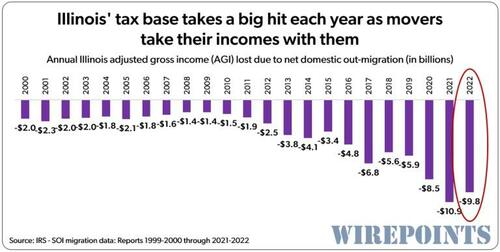
But the cumulative impact of the AGI losses are much more dramatic. Let’s build out how state’s 2022’s income tax revenues were impacted by the cumulative AGI losses since 2000.
In 2000, Illinois suffered a net loss of $2 billion in AGI as a result of outmigration, meaning the state lost out on being able to tax $2 billion that year.
The next year, 2001, Illinois lost another $2.3 billion in AGI due to outmigration. Pile on top of that the $2 billion in AGI lost in 2000 and, overall, the state lost out on being able to tax a cumulative $4.3 billion in AGI in 2001.
In 2003, Illinois lost another $2 billion in AGI, putting the cumulative AGI losses for that year at $6.3 billion.
You get the picture. When Illinois loses a taxpayer, his income isn’t just lost for tax that year. It’s lost for every subsequent year, as well.

So when you carry the above exercise all the way through to 2022, it totals nearly $88 billion in AGI that the state couldn’t tax in 2022 because of all the cumulative losses. Subtract exemptions*, and it results in about $74 billion in net income. Multiply that by Illinois’ 4.95% flat tax and you get $3.6 billion in income tax revenues the state could have had in 2022 alone if Illinois had not bled residents for 23 years.
The same tax-revenue-loss calculations can be done for all prior years.
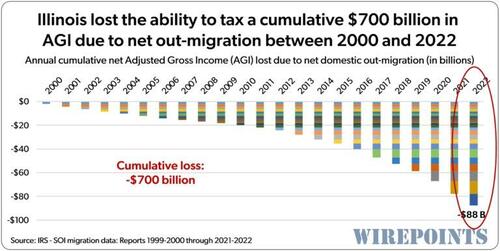
In all, Illinois has lost – counting every single year’s cumulative loss – $700 billion in AGI, that it could have taxed over the entire 2000-202 period. It’s one of the big reasons Illinois is in such a fiscal mess and why it has the worst credit rating of any state in the country.
The positive impact of in-migration
The opposite of what’s happened to Illinois is true for the nation’s big winner of people and their incomes: Florida.
Gains in people and income pile on top of each other each year, building an ever-growing tax base. In 2022 alone, the state’s tax base was some $272 billion higher compared to 2000 because of the state’s 23 straight years of net in-migration.
And while the state of Florida doesn’t directly take advantage of that income because it doesn’t have an income tax, it’s understandable why the government is swimming in cash when you take into account all the other tax revenues – sales, gas, fees, etc. – that the state’s growing number of taxpayers pay.
In all, Florida has gained– counting every single year’s cumulative gain – $2.14 trillion in AGI, that it could have taxed over the entire 2000-2022 period.
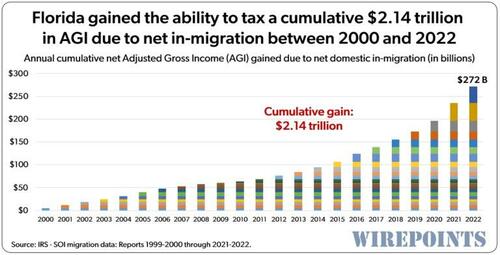
Reversing the flow
More than anything, Illinois’ lost revenues represent the fundamental crisis this state faces because of chronic out-migration.
Illinois is stuck in a vicious downward spiral it can’t hope to escape from without fundamentally changing how it governs.
|
|
[Markets]
This real-estate ETF is trouncing S&P 500 in July with big gains
Stock market’s real-estate sector posts big gains in July, even as the S&P 500 stumbles with a third straight day of losses on Thursday
Published:7/25/2024 4:42:39 PM
|
|
[Markets]
These tips for investing in mutual funds and ETFs steer you through the market’s ‘great rotation’
Housing-sector and value funds are looking more attractive.
Published:7/25/2024 4:29:06 PM
|
|
[Markets]
Lawsuits and fines cost wrongdoing companies big money — but look who gets stuck with the bill
Stockholders pay the price when executives and directors choose profits over ethics.
Published:7/25/2024 4:19:28 PM
|
[Markets]
Kamala Harris Receives Bipartisan Condemnation For Her Handling Of The Border
Kamala Harris Receives Bipartisan Condemnation For Her Handling Of The Border
Authored by Matt Margolis via PJ Media,
In a stunning move on Thursday, the House of Representatives strongly condemned "the Biden Administration and its Border Czar, Kamala Harris’s, failure to secure the United States border" in a bipartisan vote.
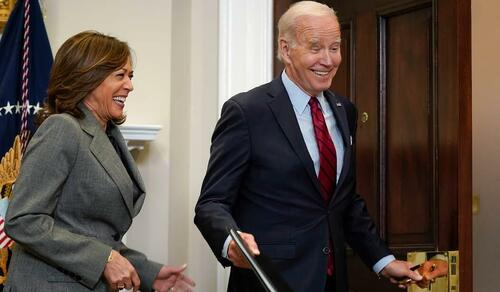 AP Photo/Patrick Semansky AP Photo/Patrick Semansky
All Republicans supported the resolution, as did six Democrats: Reps. Yadira Caraveo (D-Colo.), Henry Cuellar (D-Texas), Donald Davis (D-N.C.), Jared Golden (D-Maine), Mary Peltola (D-Alaska), and Mari Gluesenkamp Perez (D-Wash.).
Their condemnation of their party's presumptive presidential nominee represents a stark departure from the typical unity we see within the Democratic Party in Congress and underscores a growing discontent regarding the handling of immigration, which has become a key issue in the 2024 presidential race.
The resolution detailed how President Biden appointed Harris as border czar in March 2021 to address the root causes of illegal immigration — something the mainstream media has been desperately trying to pretend never happened.
The resolution further explained how Harris took 93 days to visit the southern border and chose to visit El Paso, Texas, which is roughly 800 miles from the worst border crossing.
The text of the bill quoted former Border Patrol Chief Raul Ortiz, who said, “I’ve never had one conversation with the president [Biden] or the vice president [Harris], for that matter. I was the Chief of the Border Patrol, I commanded 21,000 people. That’s a problem.” It also cited current Border Patrol Chief Jason Owens, who also reported no direct communication with Harris since his appointment in July 2023.
Since Biden and Harris took office, there have been over 9.7 million illegal immigrant encounters nationwide, with 7.9 million at the southern border and roughly 2 million gotaways who evaded Border Patrol. The resolution notes that May 2024 saw a 185% increase in illegal immigrant encounters compared to the average monthly totals under President Trump. This marked the 39th consecutive month where encounters were higher than any month during the Trump administration.
The resolution also detailed the migrant crime crises that the Biden-Harris administration's border crisis has caused, including murders of Americans like Laken Riley, Jocelyn Nungary, and Rachel Morin. It also mentioned national security threats, with the Biden administration reportedly releasing over 50 illegal immigrants with ties to ISIS and over 350 individuals on the terrorist watch list who authorities have stopped at the southern border.
Additionally, agents encountered a record-breaking 31,077 Communist Chinese nationals at the southwest border in fiscal year 2024. The resolution estimates that the border crisis is costing the U.S. approximately $150.7 billion annually, translating to $1,156 per taxpayer each year.
The bill also criticized the Biden administration for ending former President Trump’s successful "Remain in Mexico" program in August 2022, attributing the historic border crisis to the administration's far-left open border policies.
The implications of the partisan nature of this resolution are huge. For one thing, it casts doubt on Harris’s leadership at a time when she's attempting to define herself to the entire nation after taking the baton from Biden. The willingness of these Democrats to publicly condemn their party’s presumptive nominee underscores the significance of the border crisis as an issue in this election and as a key weakness of Kamala's candidacy.
|
|
[Markets]
Upbeat sales in Hoka, Ugg brands prompt a boost to outlook at Deckers
Deckers upped its profit forecast for the year and mentioned “robust full-price demand” for its Hoka and Ugg brands.
Published:7/25/2024 3:58:41 PM
|
|
[Markets]
ServiceNow’s stock logs best day since 2022 upon ‘unique’ AI traction
ServiceNow has a “solidifying position as one of the few true AI beneficiaries in software,” an analyst says.
Published:7/25/2024 3:24:52 PM
|
|
[Markets]
Dow ends higher, Nasdaq logs 3-day drop on Big Tech retreat
Published:7/25/2024 3:07:42 PM
|
[Markets]
The Future Of Bitcoin In America Will Be Decided At The Ballot Box
The Future Of Bitcoin In America Will Be Decided At The Ballot Box
Authored by Senator Bill Hagerty via BitcoinMagazine.com,
As Americans head to the polls this fall, their decision regarding who will lead our country will also determine the fate of crypto here in the United States, and our security, prosperity, and freedom are at stake.
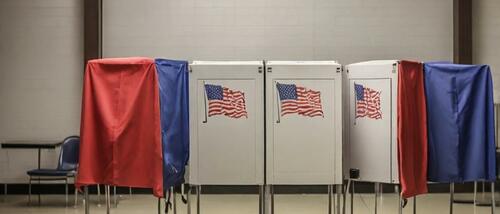
This week, I will join President Trump and thousands of crypto market participants in Nashville for Bitcoin 2024, the world's largest Bitcoin conference.
This year, the conference is held in my home state at a time that is clearly the tipping point for the future of crypto technology in the U.S. This fall, the future of crypto in America is on the ballot as our nation decides who will lead the Executive and Legislative branches of our nation. The contrast between Democrat and Republican approaches to crypto is stark. The Biden Administration has repeatedly demonstrated its hostility to crypto by refusing to provide a basic regulatory framework for the industry, while simultaneously taking enforcement actions against firms for allegedly violating nonexistent rules.
This combination of legal uncertainty and brass-knuckled enforcement has pushed many crypto innovators to the brink, leaving them little choice but to move their businesses overseas.
Meanwhile, Democrats have also taken extreme measures to stifle the adoption of crypto in the traditional financial system.
Biden’s regulators have forced crypto-engaged banks like Signature Bank into receivership while imposing crypto-hostile policies like the SEC’s Staff Accounting Bulletin (SAB) 121, which makes it prohibitively expensive for financial institutions to hold customers’ crypto assets. Altogether, the Biden Administration’s record makes clear what another four years of Democrat political control would bring: more political persecution of the industry on a scale reminiscent of Obama’s Operation Chokepoint.
In contrast, Republicans have taken concrete steps to develop constructive crypto policies that exemplify the party’s longstanding commitment to the principles of innovation, free enterprise, and individual liberty. House Republicans have passed promising bills that would provide legislative clarity for crypto market structure and for U.S.-Dollar-denominated private stablecoins. Republicans in both chambers have worked together to try to overturn Biden’s most egregious policies, address concerns about illicit finance, promote private-sector innovation in stablecoins, and prevent the development of a central bank digital currency. Republican control of Congress and the White House would enable the GOP to expand and implement these efforts, finally delivering constructive rules of the road for crypto and ending Biden’s oppressive regime of regulation by enforcement.
If Republicans don’t stop Democrats from trying to crush crypto in America, the consequences could be dire.
Four more years of hostility will force even more crypto innovators offshore. Prominent U.S. exchanges have already started opening businesses in other countries, seeking licenses in foreign jurisdictions, and shuttering their U.S. operations. In recent years, lawmakers in Washington have realized how allowing another critical industry—semiconductors—to go offshore has weakened our nation’s competitive edge and geopolitical leverage. We would be foolish to allow crypto—this generation’s new cutting-edge technology—to follow the samCryptoe path. Republicans understand that keeping innovation onshore is essential for our global competitiveness and for the creation of wealth and jobs for Americans.
All too often, voters dismayed with Washington’s dysfunction feel that their vote—and national politics more broadly—does not matter. That’s not true here.
No matter how much the status quo may frustrate us, the truth is that elections offer us the best opportunity to change course and get our country’s policies back on track.
In the case of crypto, the vote at the ballot box this year could quite literally decide its fate.
This November, Americans must make their voices heard and send their elected representatives to Washington with a mandate: secure a future for crypto in America.
|
|
[Markets]
The CrowdStrike chaos will happen again. Here’s why.
As tech companies get bigger, they create more “single points of failure” that can lead to cascading catastrophes across our connected world.
Published:7/25/2024 2:37:13 PM
|
[Markets]
Trump: Israel Needs To End War Quick & Have Better 'Public Relations'
Trump: Israel Needs To End War Quick & Have Better 'Public Relations'
The day before Republican presidential nominee Donald Trump is expected to meet with Prime Minister Benjamin Netanyahu at Mar-A-Lago, the former US president has a message for Israel: end the war quickly and bring the hostages home as soon as possible.
Trump is urging a quick end the conflict, and in a rare moment of criticism said that Israel must better manage its "public relations." The war should stop quickly "because they are getting decimated with this publicity, and you know Israel is not very good at public relations," Trump said a new Fox interview.
 Via AP Via AP
Trump has repeatedly blamed Biden's foreign policy weakness for enabling the whole crisis in the first place, having previously asserted that the Hamas terror attack on Israel that killed 1,200 people and resulted in full-blown war would not have happened if he had been in the White House.
In the fresh interview Trump also lashed out at yesterday's anti-Netanyahu protests in Washington which included shocking scenes of people burning the American flag.
"You should get a one year jail sentence if you do anything to desecrate the American flag," Trump said. "Now, people will say, 'Oh it’s unconstitutional.' Those are stupid people. Those are stupid people that say that," he continued.
"We have to work in Congress to get a one-year jail sentence. When they’re allowed to stomp on the flag and put lighter fluid on the flag and set it afire, when you’re allowed to do that — you get a one-year jail sentence and you’ll never see it again," Trump added.
Meanwhile, the White House also reacted on Thursday to the scenes of chaotic protests and flag burnings, saying "Identifying with evil terrorist organizations like Hamas, burning the American flag, or forcibly removing the American flag and replacing it with another, is disgraceful."
The statement by deputy press secretary Andrew Bates continued, "Antisemitism and violence are never acceptable. Period." He added: "Every American has the right to peaceful protest. But shamefully, not everyone demonstrated peacefulness today."
Netanyahu is expected at the White House on Friday, after which he'll travel to Florida to meet with Trump. A visit with Vice President Kamala Harris is also on the agenda.
|
|
[Markets]
PCE to affirm inflation is slowing — but watch out for revisions
Published:7/25/2024 1:40:39 PM
|
|
[Markets]
NASA ‘not quite ready’ to bring Boeing Starliner astronauts home
Published:7/25/2024 1:23:22 PM
|
|
[Markets]
Real-estate manager CBRE rallies on earnings beat as New York office properties rebound
The company sees signs of stabilization as its office-advisory business reports revenue jump with a push from the Big Apple
Published:7/25/2024 1:23:22 PM
|
|
[Markets]
No, CrowdStrike didn’t send $10 gift cards to customers after its outage
Published:7/25/2024 12:59:48 PM
|
[Markets]
Newsom Issues EO For California Cities To Remove Homeless Encampments After Supreme Court Ruling
Newsom Issues EO For California Cities To Remove Homeless Encampments After Supreme Court Ruling
After years of encouraging rampant crime and degeneracy among the homeless population, and just in time for an election talking point, California Governor Gavin Newsom issued an executive order on Thursday for the removal of homeless encampments across the state.
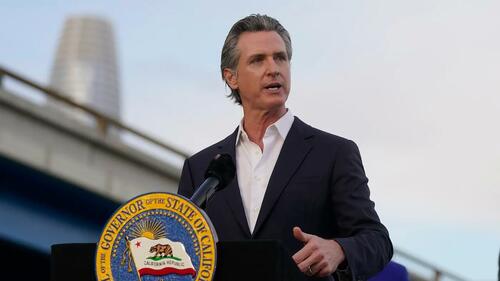
The order directs state agencies to remove thousands of tents and makeshift shelters along freeways, shopping center parking lots, and city parks - and puts the decision in the hands of local authorities.
Newsom's EO comes after a decision by the Supreme Court earlier this summer which allows cities to enforce bans on sleeping outside in public spaces, AP reports.
The case was the most significant on the issue to come before the high court in decades and comes as cities across the country have wrestled with the politically complicated issue of how to deal with a rising number of people without a permanent place to live and public frustration over related health and safety issues.
"We must act with urgency to address dangerous encampments," Newsom said in a statement.
The Supreme Court's decision is related to a lower court's ruling on a case known as Grants Pass, which blocked cities from clearing encampments.
Earlier this week we noted that San Francisco has already taken steps to craft policies which allow officials to begin sweeping encampments, according to Mayor London Breed. As the Epoch Times reports, officials are contemplating options with the city attorney’s office and more information will be shared soon, according to Ms. Breed.
“This decision by the Supreme Court will help cities like San Francisco manage our public spaces more effectively and efficiently,” Ms. Breed said in a June 28 press release. “This decision recognizes that cities must have more flexibility to address challenges on our streets.”
She said discussions underway aim to reduce homelessness while finding people mental health treatment and services to improve the quality of life for all San Franciscans.
“[Illegal camping] is not healthy, safe, or compassionate for people on the street, and it’s not acceptable for our neighborhoods,” Ms. Breed said.
One San Francisco local said he supports increased enforcement because of what he described as “filthy” conditions in some areas.
“The city has become known for feces on the sidewalks and dirty streets,” John Walker told The Epoch Times July 22. “Something needs to be done.”
After the high court’s ruling was announced in June, the state’s Ninth Circuit Court of Appeals quickly moved to discontinue the injunction blocking homeless camp sweeps.
San Francisco City Attorney David Chiu said the legal changes will allow the city to better manage its streets and improve public safety.
|
|
[Markets]
NASA ‘not quite ready’ to bring Boeing Starliner astronauts home
Boeing’s Starliner spacecraft carrying NASA astronauts Butch Wilmore and Suni Williams reached the International Space Station on June 6
Published:7/25/2024 12:50:49 PM
|
|
[Markets]
The stock market’s cruel summer is about to get much worse
Published:7/25/2024 12:50:49 PM
|
|
[Markets]
Tractor Supply Co.’s stock flat as sales fall short of estimates and shoppers rein in spending
Tractor Supply Co.’s stock erased early losses to trade flat Thursday after the retailer, which is geared toward rural living, posted weaker-than-expected second-quarter sales and narrowed guidance to lower the top of its profit and sales ranges.
Published:7/25/2024 11:37:04 AM
|
|
[Markets]
This bond-market signal of impending recessions went on a wild ride
Published:7/25/2024 11:37:04 AM
|
|
[Markets]
This bond-market signal of impending recessions went on a wild ride. Here’s its message.
The spread between 10- and 2-year Treasury yields reached its least-negative level in two years on Wednesday, helped by traders’ expectations that the Federal Reserve needs to start cutting interest rates.
Published:7/25/2024 11:18:24 AM
|
[Markets]
93% Of Top-Ranked University Presidents Donate To Democrats
93% Of Top-Ranked University Presidents Donate To Democrats
Authored by Kate Roberson via The College Fix,
About 93 percent of the 25 top-ranked U.S. universities’ presidents donated to Democrat campaign funds, according to a College Fix analysis of federal and state political campaign donation data.

Of the 15 presidents that The Fix found data on, 14 gave to Democrats, including 12 who gave exclusively and two who gave primarily to Democrats but also donated smaller amounts to Republicans; only one donated only to Republicans. That amounts to about 93 percent donating to Democratic campaigns, according to the analysis.
Information for the analysis came from the Federal Election Commission and the nonpartisan campaign research group Open Secrets, as well as individual state government campaign finance reports. Searches were conducted using the individuals’ names, including maiden and middle names, and current and past employers.
The Fix’s analysis includes donations records from 2002 to 2024. Donations were classified according to the listed party of the candidate or campaign.
The presidents included in the analysis were based on the top 25 universities listed in U. S. News and World Report’s Best National University Rankings, as they were ranked in June.
Chance Layton, spokesperson for the National Association of Scholars, told The Fix in a phone interview Tuesday the analysis is consistent with their research findings showing professors in the liberal arts and humanities also tend to skew strongly left politically.
“The numbers do not surprise me whatsoever, it’s just a further piece of evidence that shows the lack of diversity on college campuses,” Layton said.
And personal politics do affect how universities are run, he said, pointing to administrations “run amuck” with “hard-core leftist policies” that push out conservative and moderate scholars with things like diversity statements in hiring practices.
The largest set of donations came from Brown University President Christina Paxson, who collectively gave $26,750 to Democrat candidates and fundraising platforms, The Fix found.
Her largest individual donation went to the Democratic Congressional Campaign Committee in the amount of $15,000 in 2014, according to FEC data. Paxon also donated to Democratic presidential candidates Barack Obama and John Kerry.
The second largest came from Princeton University President Christopher Ludwig Eisgruber, who gave $19,550 to various Democratic congressional candidates’ campaigns, and $3,500 to former President Obama.
The only university president who donated exclusively to Republican campaigns was Lee H. Roberts at the University of North Carolina Chapel Hill, who gave $17,650 to Republican candidates, including U.S. Sen. Ted Budd of North Carolina.
Two of the presidents gave to mostly Democratic candidates and funds but also made some donations to Republicans.
Paul Alivisatos of the University of Chicago donated $50 to the Republican platform WinRed in 2024 and $125 in 2023. The remaining $5,688 of Alivisatos’ donations went to Democratic candidates and funds including $200 to the Democrat fund ActBlue in 2024.
Carnegie Mellon University President Farnam Jahanian also gave to both, including $2,000 to Democrat Pennsylvania Congressman Mike Doyle in 2019 and $3,400 to a campaign fundraiser for former Republican Michigan Gov. Richard Dale Snyder in 2010.
The Fix emailed Paxson, Eisgruber, Roberts, Alivisatos, and Jahanian asking about their reaction to the analysis’ findings twice this week, but none responded.
Other presidents who gave to Democratic campaigns were Martha Pollack of Cornell University, Sally Kornbluth of Massachusetts Institute of Technology, J. Larry Jameson of the University of Pennsylvania, and Thomas Rosenbaum of California Institute of Technology.
Ronald J. Daniels of Johns Hopkins University, Carol Christ of University of California Berkeley, Santa Ono of the University of Michigan Ann Arbor, Daniel Diermeier of Vanderbilt University, Gregory Louis Fenves of Emory University, and James E. Ryan of the University of Virginia also gave exclusively to Democratic campaigns.
The findings are consistent with past College Fix analyses as well. In a 2022 analysis of public election donations records, The Fix found that 96 percent of approximately $2.5 million in political donations from Ivy League professors went to Democrats.
Meanwhile, only 4 percent of donations from a larger sample of U.S. colleges went to Republicans, according to another 2022 College Fix analysis of campaign contributions.
|
|
[Markets]
20 value stocks scoring highest for long term returns on invested capital
Published:7/25/2024 11:04:30 AM
|
|
[Markets]
Lineage leads busy day for IPOs with a strong price and increased number of shares
Chilled-warehouse company raised $4.4 billion in the largest IPO so far this year.
Published:7/25/2024 11:04:30 AM
|
|
[Markets]
American Airlines’ stock bounces sharply, even after a big profit warning
American Airlines’ stock sank Thursday toward the lowest prices seen in four years, after the air carrier warned of a big third-quarter profit miss, citing both company specific and industry challenges.
Published:7/25/2024 10:02:21 AM
|
|
[Markets]
These ‘zombie’ student-loan organizations still have power over borrowers’ lives
Published:7/25/2024 10:02:21 AM
|
[Markets]
Israel Warns That 'Iranian Terrorist Proxies' Plotting Attack On Israelis At Olympics
Israel Warns That 'Iranian Terrorist Proxies' Plotting Attack On Israelis At Olympics
The 2024 Paris Olympics will officially open on the night of Friday, July 26 - but already there are warnings that terrorists are looking to disrupt the games. Israel is now loudly warning that its athletes are prime targets.
Israeli Foreign Minister Israel Katz on Friday has sent an alarming letter to his French counterpart, Stéphane Séjourné, informing the French side of an alleged Iranian-backed plot to attack the Israeli delegation of athletes.
 Image source: Olympic Committee of Israel Image source: Olympic Committee of Israel
"There are those who seek to undermine the celebratory nature of this joyous event," wrote Katz in the message. "We currently have assessments regarding the potential threat posed by Iranian terrorist proxies and other terrorist organizations who aim to carry out attacks against members of the Israeli delegation and Israeli tourists during the Olympics."
Katz did acknowledge the "unprecedented security measures" put in place by French security forces to protect Israelis attending the games. He also noted that French authorities rejected some calls among the Left to ban all Israeli participants from the Olympics.
In total 88 Israeli athletes are at the games, and they have reportedly been given unprecedented, around-the-clock protection from both French and Israeli security services. At this point Israeli has not presented any evidence publicly to back its assertion that Iranian proxies are plotting an attack.
Just the night prior to this new warning, Prime Minister Benjamin Netanyahu addressed Congress in a nearly hour-long speech which had a heavy focus on the 'Iran threat'. He claimed that Tehran is behind "all the terrorism" and "all the killing" in the Middle East while making a case that it is the biggest backer of Hamas and Hezbollah.
Worrisomely, police in Belgium have just announced the arrest of seven people on Thursday on suspicion they were preparing a "terrorist attack." Federal prosecutors indicated it was the result of 14 raids and counter-terror monitoring nationwide.
However, a government spokesman said there is yet no evidence of any link to the 2024 Paris Olympics. There are "no details at this time as to the locations or targets but what was found leads us to believe an attack was being prepared," a statement issued to AFP said.
It said all of them "are suspected of participation in a terrorist group’s activities, financing of terrorism and preparation of a terrorist attack."
Already there have been reports of groups of protesters threatening the Israeli delegation in Paris...
At this moment while the Gaza war is raging and Palestinian death toll in soaring, Israel is wary of the potential for a repeat of the 1972 Munich Olympic games massacre.
It involved affiliates of the Palestinian militant group Black September kidnapping and killing a group of Israeli athletes. Twelve victims died - almost all of them members of the Israeli Olympic team - in an attack which shocked the world.
|
|
[Markets]
The great rotation continues in Wednesday trading
Published:7/25/2024 9:38:32 AM
|
|
[Markets]
Stock-market drop offers reminder that rate cuts can alarm investors
Published:7/25/2024 8:30:35 AM
|
|
[Markets]
Pool’s stock climbs on second-quarter top- and bottom-line beat
Pool Corp. shares rose 2.4% in premarket trading Thursday after the swimming-pool equipment company reported better-than-expected second-quarter revenue and earnings.
Published:7/25/2024 8:30:35 AM
|
|
[Markets]
RTX stock rises on Q2 sales and earnings beat, raised guidance
Shares of RTX Corp. rose 3.2% in premarket trades Thursday after the owner of Collins Aerospace Systems and Pratt & Whitney beat analysts’ top and bottom-line estimates and raised its full-year guidance.
Published:7/25/2024 8:03:49 AM
|
|
[Markets]
Jobless claims retreat in latest week, erasing some of gain from Hurricane Beryl
Published:7/25/2024 7:49:42 AM
|
[Markets]
Q2 GDP Unexpectedly Soars To 2.8%, Crushing Estimates As Core PCE Prints Hot
Q2 GDP Unexpectedly Soars To 2.8%, Crushing Estimates As Core PCE Prints Hot
After yesterday's panicked oped by idiot Bill "recession is here, so cut rates before Trump is elected" Dudley, expectations were for a Q2 GDP print this morning at zero if not outright negative to greenlight a July rate cut. Of course, that oped is all that was needed for Kamala's Census Bureau to release a blowout print (because we now have just 100 days to establish Kamalanomics as the next sliced bread) and that's precisely what happened moments ago when the first estimate of Q2 GDP came in at a whopping 2.8%, double the final Q1 print of 1.4% (which was already the lowest print since the technical recession in Q2 2022)...
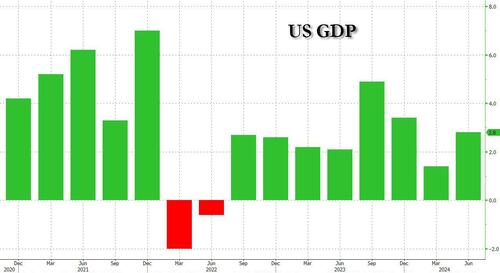
... and also came in more than 2-sigma higher than the consensus estimate of 2.0%; in fact, there was just one analyst estimate that was higher at 3.0%.
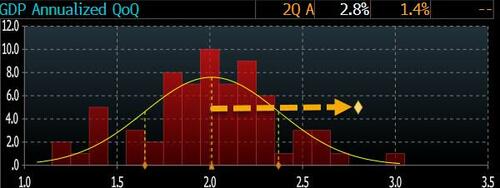
The increase in real GDP primarily reflected increases in consumer spending, private inventory investment, and nonresidential fixed investment, according to the BEA.
According to UBS, details suggest very strong growth: investment rose 8.4% q/q SSAR, the highest since Q3 2023. It looks like AI-related investment supported the growth as information processing equipment rose 10.2% q/q. Personal consumption rose 2.5% in Q2, better than the decline of 2.3% in Q1. Government spending rose 3.1% q/q, higher than 1.8% in Q1.
Meanwhile, core PCE index fell to 2.9% y/y from 3.7%, but higher than 2.7% consensus.
Developing
|
|
[Markets]
Japanese yen surges to fresh two-month high as carry-trade confidence crumbles
The Japanese yen early Thursday strengthened more than 1% to below 152 per U.S. dollar for the first time since early May.
Published:7/25/2024 7:32:33 AM
|
|
[Markets]
U.S. economy grows 2.8% in second quarter
Published:7/25/2024 7:32:32 AM
|
|
[Markets]
Dow’s stock dives as a weak economic recovery leads to rare earnings miss
Published:7/25/2024 6:56:40 AM
|
|
[Markets]
Southwest Airlines to shift to assigned seats, offer red-eye flights
The carrier will end its longtime practice of open seating and offer “premium” options that have more legroom.
Published:7/25/2024 6:48:21 AM
|
|
[Markets]
Corporate insiders are dumping stock at the fastest rate in more than a decade
Published:7/25/2024 6:48:21 AM
|
[Markets]
The Percentage Of Americans That Worry They Won't Be Able To Pay Their Bills Is Higher Than It Was During The Great Recession
The Percentage Of Americans That Worry They Won't Be Able To Pay Their Bills Is Higher Than It Was During The Great Recession
Authored by Michael Snyder via The Economic Collapse,
Do you remember how painful the Great Recession was? 2008 and the years immediately following were definitely a very dark chapter in our history, but a new study has actually found that the percentage of Americans that worry they won’t be able to pay their bills is actually higher today than it was back then. Slowly but surely, our economic strength has been fading and our standard of living has been falling. Unfortunately, now we have reached a point where a very large portion of the U.S. population is really struggling.

According to a CNN poll that was just released, almost 40 percent of all U.S. adults “say they worry most or all of the time that their family’s income won’t be enough to meet expenses”…
Many Americans regularly worry they won’t be able to make ends meet.
Nearly four in ten (39%) of US adults say they worry most or all of the time that their family’s income won’t be enough to meet expenses, according to a new CNN poll. That’s up from 28% who expressed those concerns in December 2021, and it’s similar to the numbers seen during the Great Recession (37%).
To cope, significant shares of Americans said they are adding side jobs, cutting down on driving and putting more expenses on credit cards.
If you would have asked me before I saw the results, I would have been quite confident that the number during the Great Recession would have been higher than the number in 2024.
Just like everyone else, I remember the Great Recession as such a painful time.
Sadly, the economic pain that we are experiencing now is just beginning.
Ordinary Americans from coast to coast are being absolutely crushed by rising prices, and that isn’t going to change any time soon.
In an article that CNN posted about this new survey, one woman that works for the CDC admitted that she was recently forced to move because costs have risen so aggressively…
“The grocery store is just outrageous right now. But it’s not just that. Everything has gone up. Clothing. My insurance,” said Angela Russell, an Ohio resident who works as a program analyst at the Centers for Disease Control and Prevention (CDC).
Russell, who has two adult children and three grandkids, said she recently moved out of her rental home in Cincinnati in favor of one in a rural area where the rent is cheaper.
Other recent surveys have come up with results that are even more alarming.
For example, one discovered that a whopping 71 percent of Americans are stressed out about their “ability to afford everyday expenses”…
71% of Americans say they’re stressed by their ability to afford everyday expenses.
Americans most regularly spend money on groceries, phone bills, utilities, gasoline and rent/mortgage payments.
Grocery bills frustrate Americans more than any other regular expense. Utilities, rent/mortgage payments, gasoline and insurance payments round out the top five most annoying expenses.
That is most of the country.
Unsurprisingly, younger generations are being hit particularly hard by the pain of inflation…
Financial stress levels are highest among millennials (77%), followed by Generation Z (75%) and Generation X (74%). Baby boomers reported experiencing the least financial stress, although at 59% it was still more than half of those surveyed.
Those that follow my work regularly know that I tend to rant about rising prices at the grocery store.
Sometimes it is hard for me to believe that prices have gotten so high, and it appears that a lot of people out there agree with me.
Another recent survey found that 80 percent of Americans have observed a “notable increase” in grocery store prices…
According to a study by Qualtrics on behalf of Intuit Credit Karma, 80% of Americans say they have felt a “notable increase” in grocery costs in recent years. More than a quarter of respondents said the increased cost has led them to occasionally skip meals, while about one-third said they spend more than 60% of their monthly income on mandatory expenses such as food, utilities and rent.
Food has certainly become ridiculously expensive, but we actually spend far more money on housing.
Today, the typical household spends about 12 percent of total income on food and about 33 percent of total income on housing…
According to data from the Bureau of Labor Statistics, the top three annual expenses for the average American household in 2022 (the most recent data available) were housing (33.3%), transportation (16.8%) and food (12.8%).
For most Americans, spending money in these areas is unavoidable.
Housing costs have been rising much faster than the overall rate of inflation, and we just learned that home prices reached yet another new all-time record high last month…
Home prices hit a new high in June for the second straight month, the latest sign that the housing market is unaffordable to millions of Americans.
The spring home-buying season, usually the busiest time of year for the housing market, was a dud this year. Home sales declined in June for the fourth straight time on a monthly basis. The combination of high prices and elevated mortgage rates has made homeownership less attractive to renters and deterred current homeowners from moving.
Meanwhile, homelessness in the United States is at the highest level ever recorded and it has been growing at the fastest pace ever recorded.
We just can’t keep going on like this.
Something has to give.
It appears to be inevitable that all of this economic pain will have a dramatic impact on the upcoming election. At this point, approximately three out of every five Americans believe that we are already in a recession right now…
You don’t need to be a financial genius to know that times are tough for plenty of Americans. With that in mind, a majority of people actually think the economy is doing even worse than the “experts” say it is. Three in five people believe that the U.S. is currently in a recession, even though we’re not officially in one according to the financial definition.
The survey of 2,000 Americans explored what’s driving this lack of consumer confidence in the economy. Inflation and the rising cost of living (68%) top the list of reasons why respondents believe the U.S. is in a recession, followed by friends and family members complaining about money (50%).
It is not an accident that this has happened.
For more than a decade, people like me have been relentlessly warning that the decisions that our leaders were making would have disastrous consequences, and that is exactly what has happened.
And if we stay on the path that we are on, it won’t be too long before we witness a meltdown of absolutely epic proportions.
* * *
Michael’s new book entitled “Chaos” is available in paperback and for the Kindle on Amazon.com, and you can subscribe to his Substack newsletter at michaeltsnyder.substack.com.
|
|
[Markets]
AbbVie’s quarterly results top estimates as newer drugs cushion Humira’s slide
AbbVie on Thursday reported second-quarter sales and profit that beat expectations as newer immunology drugs delivered the rapid growth needed to offset plunging sales of blockbuster Humira.
Published:7/25/2024 6:39:51 AM
|
|
[Markets]
Work Advice: My co-worker is cheating on his wife. Should I tell her?
A reader walked in on a married co-worker and another woman in the supply closet. What’s the best course of action to help the co-worker’s wife?
Published:7/25/2024 6:04:42 AM
|
|
[Markets]
As Teamsters praise Trump, here’s what’s going on in the fight over blue-collar voters
Teamsters President Sean O’Brien’s speech at last week’s GOP convention is still generating reactions this week.
Published:7/25/2024 6:04:42 AM
|
|
[Markets]
Southwest Airlines to change to assigned seating and premium seating options
Published:7/25/2024 5:49:43 AM
|
[Markets]
Mexicans Work More Hours Than Anyone... Germans Not So Much
Mexicans Work More Hours Than Anyone... Germans Not So Much
Do you feel like you work too much?
Curious about how long people work in other countries?
In this graphic, Visual Capitalist's Marcus Lu ranked OECD countries based on average working hours per year, as of 2023.
It reveals a wide gap between the longest and shortest-working countries, to the tune of 864 hours (36 days).
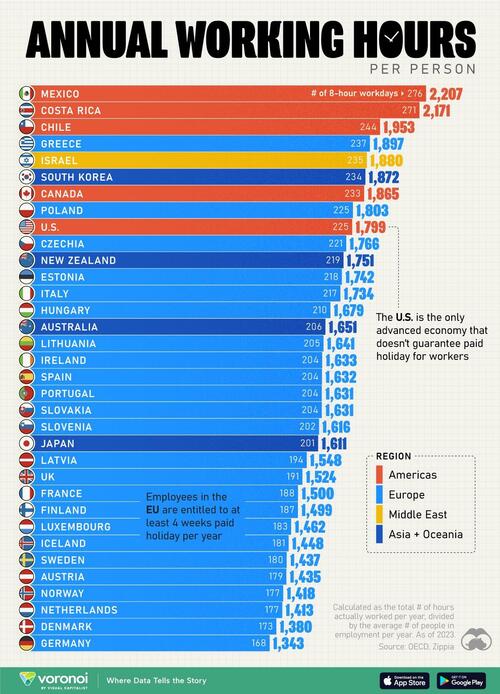
Note that this data is based on the average number of people in employment in each country, meaning it includes full- and part-time workers.
Data and Key Takeaways
All figures were sourced from the OECD (Organisation for Economic Co-operation and Development), an international organization that promotes policies to improve economic and social well-being. It has 38 member countries, though in this instance, data for all of them was not available.
For additional context, hourly figures were also converted to the number of eight-hour workdays.
| Country |
Annual Hours
Worked per Person |
# of 8-hour
Workdays |
|---|
| ???? Mexico |
2207 |
276 |
| ???? Costa Rica |
2171 |
271 |
| ???? Chile |
1953 |
244 |
| ???? Greece |
1897 |
237 |
| ???? Israel |
1880 |
235 |
| ???? Korea |
1872 |
234 |
| ???? Canada |
1865 |
233 |
| ???? Poland |
1803 |
225 |
| ???? U.S. |
1799 |
225 |
| ???? Czechia |
1766 |
221 |
| ???? New Zealand |
1751 |
219 |
| ???? Estonia |
1742 |
218 |
| ???? Italy |
1734 |
217 |
| ???? Hungary |
1679 |
210 |
| ???? Australia |
1651 |
206 |
| ???? Lithuania |
1641 |
205 |
| ???? Ireland |
1633 |
204 |
| ???? Spain |
1632 |
204 |
| ???? Portugal |
1631 |
204 |
| ???? Slovakia |
1631 |
204 |
| ???? Slovenia |
1616 |
202 |
| ???? Japan |
1611 |
201 |
| ???? Latvia |
1548 |
194 |
| ???? UK |
1524 |
191 |
| ???? France |
1500 |
188 |
| ???? Finland |
1499 |
187 |
| ???? Luxembourg |
1462 |
183 |
| ???? Iceland |
1448 |
181 |
| ???? Sweden |
1437 |
180 |
| ???? Austria |
1435 |
179 |
| ???? Norway |
1418 |
177 |
| ???? Netherlands |
1413 |
177 |
| ???? Denmark |
1380 |
173 |
| ???? Germany |
1343 |
168 |
At the top of this ranking are three countries from the Americas: Mexico, Costa Rica, and Chile.
This could be due to several reasons, including:
-
Economic structure: Labor-intensive industries like agriculture play a large role in their economies
-
Social policies: These countries may have less extensive social safety nets, meaning workers work more to compensate for the lack of government support
-
Lower wages: Lower average wages in these countries can lead people to work longer hours to improve their living standards
At the lower end of this ranking are a large number of European countries, particularly those with advanced economies. It should be noted that in the European Union (EU), all employees are entitled to at least four weeks paid holiday per year.
This is a stark contrast from the U.S., which is the only advanced economy in the world that does not guarantee paid holiday for workers.
One major outlier in this dataset is Greece, which ranked fourth at 1,897 average annual hours. The country has been struggling to boost economic growth, and more than 500,000 people have left the country since its debt crisis in 2009.
It was recently announced that Greece would be allowing certain employers to introduce a six-day work week.
If you enjoyed this post, be sure to check out Ranked: The Cities with the Best Work-Life Balance in the World.
|
|
[Markets]
Economy expected to extend two-year growth streak in second quarter
Fresh data from the Commerce Department this morning is expected to show that gross domestic product grew at a 1.9 percent annualized rate, according to economists’ forecasts.
Published:7/25/2024 5:17:49 AM
|
|
[Markets]
‘We’re still paid less and do more unpaid child care’: What have Kamala Harris and Hillary Clinton done for working women like me? Not much.
“I’m doubtful whether more women and women of color in senior positions is moving the needle.”
Published:7/25/2024 5:17:49 AM
|
|
[Markets]
Gucci owner Kering downgraded by UBS as stock price sputters
Published:7/25/2024 4:13:59 AM
|
|
[Markets]
How four U.S. presidents unleashed economic warfare across the globe
U.S. sanctions have surged over the last two decades and are now in effect on almost one-third of all nations. But are they doing more harm than we realize?
Published:7/25/2024 4:13:59 AM
|
|
[Markets]
Actor Gary Sinise just sold this palatial SoCal mansion for $6.9 million
Nestled on 28 lush acres in a gated development, the residence features a media room, pool, a pool house with a kitchen, and tennis court.
Published:7/25/2024 4:13:59 AM
|
|
[Markets]
Ackman holding Universal Music sees stock-price nosedive of 28%
Published:7/25/2024 3:13:37 AM
|
|
[Markets]
Universal Music Group, a massive holding of Bill Ackman, sees stock-price tumble on streaming worries
Shares in Universal Music Group, a big holding of Bill Ackman’s Pershing Square Capital Management, lost more than a quarter of its value on Thursday on concerns over streaming revenue.
Published:7/25/2024 3:05:12 AM
|
[Markets]
Kiev Mayor Klitschko Speculated That Zelensky Might Agree To Territorial Compromises With Russia
Kiev Mayor Klitschko Speculated That Zelensky Might Agree To Territorial Compromises With Russia
Authored by Andrew Korybko via Substack,
Kiev Mayor Vitaly Klitschko, who’s emerged as one of Zelensky’s top rivals over the past year, speculated in an interview with Italy’s Corriere Della Serra over the weekend that the Ukrainian leader might agree to territorial compromises with Russia. In his words, “Will he…consider a territorial compromise with Putin?...Zelensky will probably have to resort to a referendum. I don't think he can reach such painful and important agreements on his own without popular legitimacy.”

Klitschko also echoed Atlantic Council senior fellow Adrian Karatnycky’s demand from mid-December for Zelensky to create a “government of national unity” by suggesting that this could help disperse responsibility for unpopular decisions like mobilization and thus ease their implementation. His interview couldn’t have been more perfectly timed since it coincided with the signals that Ukraine sent over the past week about its newfound semi-seriousness in reviving peace talks with Russia as explained here.
To summarize for the reader’s convenience, the US’ political uncertainty, the Ukrainian Conflict’s military-strategic dynamics continuing to favor Russia, and the growing attractiveness of China as a mediator combined to influence Zelensky to send his top diplomat to Beijing. This will be Kuleba’s first trip there since 2022, which followed the first such trip to Kiev by the Vatican’s top diplomat during this same period, thus advancing the scenario of China and the EU (via the Vatican) jointly hosting peace talks.
This is precisely what Orban proposed in his peace mission report for the EU, but since he’s considered by the Eurocrats to be too toxic to associate with, they’d prefer relying on the Vatican as their backchannel for exploring Kiev’s interest in this possibility instead. Zelensky knows that China doesn’t support his maximalist objectives in this conflict, but it’s also not in favor of Russia’s either, so his decision to dispatch Kuleba to Beijing hints at an emerging interest to have it broker a compromise.
Accordingly, this could take the form of freezing the conflict along the Line of Contact (LOC), but without rescinding Kiev’s claims to Russian-controlled territory within Ukraine’s pre-2014 borders. He couldn’t realistically agree to this though without a referendum after the enormous costs that his country already paid. Klitschko sensed that something of the sort might soon be afoot even before Kuleba’s trip to Beijing was announced (his interview’s publication narrowly preceded it) and that’s why he shared what he did.
Nobody should have any false expectations about this happening anytime soon, let alone assuming that Russia would agree to it after President Putin said last month that no cessation of hostilities is possible without Ukraine first withdrawing from all the territory that Moscow now claims as its own. Even in the event that Kiev voluntarily complied, which is unlikely, then the Kremlin would likely also want other aspects of its national security interests to be ensured as well such as demilitarization and the like.
In any case, it could form a starting point for resuming dialogue with Russia, even if it’s only initially conducted via mediators like China and/or the EU (albeit via the Vatican instead of Orban). Zelensky knows that he won’t reconquer his country’s lost territory no matter what he says for the purpose of keeping morale high, hence the need to informally explore a compromise for ending the conflict in the most politically “face-saving” way possible, thus explaining Klitschko’s referendum speculation.
|
[Markets]
These NATO States Are Embracing Conscription, Eyeing Future War With Russia
These NATO States Are Embracing Conscription, Eyeing Future War With Russia
Authored by Connor Freeman via The Libertarian Institute,
As NATO escalates its proxy war in Ukraine and inches closer to fighting directly with Russia, the Washington-led bloc is embracing mandatory military service. Many European members of NATO have expanded or reintroduced conscription as part of large-scale preparations for such a war, CNN reports. Already outpaced in terms of military industrial capacity by Russia, the alliance’s new battleplans will see an attempt to beef up weapons production and form 35-50 brigades of 3,000-7,000 battle ready troops.
Outgoing NATO Secretary General Jens Stoltenberg has insisted, “Today, we have 500,000 troops on high readiness, combat-ready battlegroups in the eastern part of the Alliance for the first time.” But the bloc is struggling to meet its goals of assembling 300,000 soldiers prepared to be activated within a month and another half a million in six months. There is also a question of whether the bloc can filed a military fit for a protracted war akin to the Ukraine conflict.

Following the end of the Cold War, several European states ceased conscripting their citizens. Although increasing numbers of NATO member countries have resorted to the draconian practice during recent years, especially in the Baltics and Scandinavia. Roughly a third of the NATO alliance practices some form of compulsory military service.
This year, for the first time since it was abolished in 2006, Latvia reimplemented its draft. Male citizens are subject to conscription within a year of turning 18 years old. Additionally, Norway has unveiled a long-term plan to increase its ranks of mandatorily conscripted troops, employees, and reservists by 20,000 as well as double the military budget. In 2015, Oslo became the first NATO government to establish a gender-neutral draft.
Lithuania brought back mandatory military service in 2015, each year drafting 3,500 to 4,000 men between the ages of 18-26 for a nine-month period. Although the Finnish Defense Forces employ only 13,000 people during peacetime, Helsinki claims it has the ability to activate over 900,000 reservists with 280,000 combat-ready troops. Sweden conscripts both men and women, Stockholm drafted 7,000 its citizens and the military expects to conscript 8,000 next year. The Swedes have had conscription since 1901.
Citing the supposed Russian threat to Europe, Robert Hamilton, the head of Eurasia Research at the Foreign Policy Research Institute, said “It is tragically true that here we are, in?2024, and we are grappling with the questions of how to mobilize millions of people to be thrown into a meatgrinder of a war potentially.” For 30 years, Hamiliton served as a US Army officer. “Meatgrinder” is a term often used by frontline troops in Ukraine, particularly during the battle of Bakhmut where the average life span of such a soldier was only a few hours.
In the United Kingdom, conscription is currently being pushed by Conservative MPs. The 2025 National Defense Authorization Act, the annual military spending bill, may include provisions which inter alia will seek to automatically register all eligible men and women for Selective Service, a form of conscripted labor, which could inevitably include military service.
Former Supreme Allied Commander of Europe General Wesley Clark echoed Hamilton’s hawkish sentiments, emphasizing “whether this is a new Cold War or an emerging hot war is unclear.” He added that NATO “must rebuild our defenses,” including with mandatory military drafts.
“I think young people in Europe and the US will come to realize that this generation, like the generation that fought WWII, it didn’t ask to be the ‘Greatest Generation’ but the circumstances thrust that burden on them,” Clark added.
The risk of direct war with Russia is growing by the day amidst the Ukraine proxy war, as the alliance has largely approved NATO missiles to be used for attacks against the Russian mainland. The bloc will soon provide Kiev with F-16s and an explicit green light for the warplanes to carry out direct strikes against Russian territory as well. Without irony, Stoltenberg claimed this should not be viewed by Russia as an escalation.

As NATO considers increasing its nuclear weapons deployments, the US is also planning to deploy previously banned, medium-range, nuclear capable missiles in Germany which has caused Russia to hint it could similarly retaliate. Pointing to the massive US-led buildup for war with China, President Vladimir Putin accused NATO of creating major security threats for Russia in Asia.
NATO set its sights on China four years ago, identifying Beijing as a military threat to European security. China maintains a “no limits” partnership with Russia. “NATO is already ‘moving’ there (to Asia) as if to a permanent place of residence. This, of course, creates a threat to all countries in the region, including the Russian Federation. We are obliged to respond to this and will do it,” Putin vowed earlier this year. That same month, Stoltenberg cited China as a reason the bloc is considering an “adaptation” of its nuclear arsenal.
|
[Markets]
Escobar: China Designs An Economic Road Map All The Way To 2029
Escobar: China Designs An Economic Road Map All The Way To 2029
Authored by Pepe Escobar,
There can hardly be a better place to track the four-day, twice-a-decade plenum of the Communist Party of China than dynamic, “one country, two systems” Hong Kong.

Hong Kong is right at the heart of East Asia – halfway between Northeast Asia (Japan, the Koreas) and Southeast Asia. To the west is not only China but the Eurasia landmass, linking it to India, Persia, Turkiye and Europe. To the east, sailing forward, is the Pacific and the US’s West Coast.
Moreover, Hong Kong is the ultimate multipolar, multi-nodal (italics mine) hub: a frenzied global metropolis forged by trade routes going back centuries, attracting people from every latitude keen on interconnecting commerce, ideas, technologies, shipping, commodities, markets.
Now, reinvented for 21stcentury Eurasia integration, Hong Kong has all it takes to profit as a key node of the Greater Bay Area, the southern hub propelling China to economic superpower status.
The plenum in Beijing was a quite serious/sober affair – trying to strike a balance between sustainable economic growth and national security all the way to 2029, when the PRC celebrates its 80th anniversary.
The proverbial comprador elites, 5th columnists and outright Sinophobes across the West have gone bonkers on the current slowdown of the Chinese economy – complete with slumps in the financial and property fronts – running in parallel to all hybrid war strands of Chinese containment emanating from Washington.
Fact: China’s GDP grew roughly 5% in the first semester; and the final plenum communique, released at the end of the four-day meeting, stressed that this should remain the “unwavering” target for the second semester.
The official rhetoric of course was heavy on stimulation of domestic consumption, and “new momentum” to drive exports and imports.
This key passage in the final communique breaks it all down when it comes to the new iteration of “socialism with Chinese characteristics”:
“We must purposefully give more prominence to reform and further deepen reform comprehensively with a view to advancing Chinese modernization in order to better deal with the complex developments both at home and abroad, adapt to the new round of scientific and technological revolution and industrial transformation, and live up to the new expectations of our people.
It was stressed that, to further deepen reform comprehensively, we must stay committed to Marxism-Leninism, Mao Zedong Thought, Deng Xiaoping Theory, the Theory of Three Represents, and the Scientific Outlook on Development and fully implement Xi Jinping Thought on Socialism with Chinese Characteristics for a New Era.
We must thoroughly study and implement General Secretary Xi Jinping’s new ideas, viewpoints, and conclusions on comprehensively deepening reform and fully and faithfully apply the new development philosophy on all fronts.”
And to make it more simple, Xi actually explained it all in some detail.
Those Pesky ‘Markets’
Nowhere around the world one finds a government focused on devising five-year plans for economic development (Russia now seems to be engaged in its first attempts) – encompassing development of rural land, tax reform, environmental protection, national security, the fight against corruption, and cultural development.
When the term “reform” appears no less than 53 times in the final communique, that means – contrary to Western proselytism – that the CPC is dead set on improving governance and increasing efficiency. And all those targets must be met – otherwise heads will roll.
Science and technology will once again have pride of place in China’s development, a sort of follow-up to the Made in China 2025 strategy. The emphasis predictably will be on better integration of the digital economy into the real economy; infrastructure upgrading; and boosting “resilience” in the industrial supply chain.
It’s fascinating to watch how the communique emphasizes the necessity to “correct market failures” – which is a euphemism for reigning in turbo-neoliberalism. What is stressed is “unswerving support and guidance” to the development of the “non-state sector”, with Beijing ensuring “all forms of ownership” in the economy competing fairly and lawfully “on an equal footing”.
The plenum could be easily interpreted as a calculated exercise in Taoist patience. According to Xie Maosong, from the China Institute for Innovation and Development Strategy at the Chinese Academy of Sciences, “Xi said many times that the easy part of the reform is over, and now we are in uncharted waters. The party must watch its step, particularly as the external risks build. We are also touching the vested interests of many groups.”
Of course turbo-capitalist Hong Kong’s main obsession is “markets”. Conversations with British traders scouting Asia for their clients reveal they are not so keen on investing in China – yet that does not faze Beijing’s planners. What matters for the Politburo is how to meet the economic, social, environmental and geopolitical targets set by Xi for the next five years. It’s up to the markets to adapt to it.
Of course Beijing planners are already factoring Trump in the overall equation. The Western mantra that China’s economy is struggling to stabilize may be debatable. Yet China’s economy may be in fact in a more precarious position now than when Trump unleashed his trade war in mid-2018. The yuan may seem to be under more pressure because of the gap between US and Chinese borrowing costs.
According to a JPMorgan estimate, every 1% tariff hike during the 2018-2019 period of the US-launched trade war was linked to a 0.7% rise of the US dollar versus the yuan.
Trump plans to impose a 60% tariff on virtually all Chinese products.
That would lead to an exchange rate of roughly 9 yuan to the dollar, 25% weaker than now.
Now Read the Whole Thing and Get to Work
It’s enlightening to check what Hong Kong’s chief executive, John Lee, said about the plenum. He encouraged “all sectors of the community” to read the communique. And the Hong Kong business elite did get the drift: they interpreted it as Beijing betting once again on Hong Kong’s key role for the development of the Greater Bay Area.
It would not be any other way. Hong Kong, Lee stressed, is a “superconnector” and “super value-adder”, linking mainland China with the Global North and the Global South, and still attracting all sorts of foreign investment to China.
Now compare it with the predominant view on Hong Kong in US business circles. The American Chamber of Commerce in Hong Kong is appalled, stressing how US businessmen in fact don’t understand the Safeguarding National Security directive approved last March, which complemented the National Security Law installed by Beijing in 2020.
For Beijing, these are very serious matters of national security – which range from a crackdown on money laundering to preventing the proverbial 5th columnists from launching a color revolution such as the one that nearly destroyed Hong Kong in 2019. No wonder so many American investors cannot get it. Beijing couldn’t care less.
Now let’s see what China’s top mutual fund manager has to say about it.
Zhang Kun, manager of Blue Chip Mixed Fund, runs four funds with combined assets of $8.9 billion. He prefers to set his sights on Beijing’s aim to boost per capita GDP to match the West by 2035.
If that happens, with or without a US trade war – and the Chinese won’t stop at nothing to achieve it – then per capita GDP could be around $ 30,000 (it was $12,300 last year, according to Chinese think tanks).
So foreign investment will continue to be welcomed in China, via Hong Kong or not. But on each and every front, what trumps everything is national security. Call it a practical exercise in sovereignty.
|
[Markets]
Blood Proteins Can Predict The Risk Of Developing More Than 60 Diseases
Blood Proteins Can Predict The Risk Of Developing More Than 60 Diseases
Authored by Marina Zhang via The Epoch Times (emphasis ours),
Over 60 diseases can be predicted just by looking at proteins in the blood, a study published Monday finds.
 (Connect world/Shutterstock) (Connect world/Shutterstock)
These proteins provided more accurate predictions for 52 out of 67 diseases than current clinical tests.
“Measuring one protein for a specific reason, such as troponin to diagnose a heart attack, is standard clinical practice. We are extremely excited about the opportunity to identify new markers for screening and diagnosis from the thousands of proteins circulating and now measurable in human blood,” lead author professor Claudia Langenberg, director of the Precision Healthcare University Research Institute at Queen Mary University of London, said in a press release.
Postdoctoral researcher Julia Carrasco-Zanini-Sanchez, who is also the study’s first author, told The Epoch Times that the study was prompted by her team’s prior research on a disease related to impaired glucose control.
“[The condition] is basically a form of prediabetes that you can only detect when you do what’s called an oral glucose tolerance test, but not through HBA1c (blood glucose testing) or fasting glucose testing,” she said.
“We started working with proteomics (large-scale study of proteins) to try to develop a test ... to predict the outcome of this oral glucose tolerance test without having to perform it because it’s routinely not done in clinical practice.”
Ms. Carrasco-Zanini-Sanchez said that their prior study led them to wonder if other diseases could be predicted using proteins.
She said that their current model predicts disease development in 10 years’ time.
“[Ten years] is kind of a long time frame for some of the diseases that we’re studying … a three- or five-year prediction timeline would be a bit more relevant. However, the data is still not large enough, which is why ... all of them are trained for 10-year incidents,” the first author said.
Ms. Carrasco-Zanini-Sanchez, who did her doctorate research on proteomics, told The Epoch Times that she hoped the study’s proteomics tests would be used to screen specialized populations most at risk for the disease in question rather than the entire population.
52 Diseases Identified
The study, published in Nature Medicine, used data from the UK Biobank and analyzed over 3,000 different blood proteins for 218 different diseases.
Over 40,000 people were recruited to have a sample of their blood taken for proteomics analysis.
These people were then followed for 10 years through their electronic health records to see what diseases they would develop.
For those who did end up developing various diseases, by studying the protein levels they had 10 years ago, researchers determined protein signatures for over 60 diseases.
Each protein signature is made up of five to 20 different proteins.
The researchers developed a clinical model to predict the risk for various diseases, which included information such as age, sex, and body mass index, among other factors.
On top of that model, they added the protein signature, disease biomarkers, or genetic risk scores to make three other models and compared the results.
With the protein signature model, the authors found significant improvements to the predictions for 52 diseases. They include celiac disease, dilated cardiomyopathy, liver cirrhosis, multiple myeloma, COPD, dementia, Sjogren’s disease, and prostate cancer, among others.
The authors highlighted that the biomarker model for prostate cancer, which is currently screened for by measuring a person’s prostate-specific antigen, was outperformed by their protein signature model.
They also identified certain proteins that only predicted one disease; for example, TNF receptor superfamily member 17, a protein responsible for B-cell development, was highly specific for predicting multiple myeloma.
Model Based on One-Time Sample
Participants’ blood samples were only taken once at the start of the study. Their health outcomes were followed through their electronic health records for 10 years.
Ms. Carrasco-Zanini-Sanchez said it is unlikely that blood protein levels would change too drastically.
“There are not that many studies with repeated proteomic sampling. But the ones that exist do show that there are quite stable levels or stable measurements of the proteins. Very large variations are mostly associated with changes in risk factors or the environment that may, on itself, predispose you to a different disease.”
Ms. Carrasco-Zanini-Sanchez envisioned that their test may help doctors make better judgments on diagnosing and treating high-risk groups.
“If we think about screening the entire population [for celiac disease] ... about one person in 100 people will basically go on to develop celiac disease,” she said, adding that many people may need to be tested to only help one person.
However, in specific population groups, like those with autoimmune disease, their risks of developing celiac disease are higher.
“This is kind of the general framework in which we envision,” she said, “It’s just about finding the right population in which you would apply this sort of test realistically.”
The first author said that doctors in the United States may also use the proteomics test to screen their own patients for diseases during checkups.
|
[Markets]
"We Don't Live In Dictatorship": Black Lives Matter Blasts Democrats For 'Anointing' Harris Without Vote
"We Don't Live In Dictatorship": Black Lives Matter Blasts Democrats For 'Anointing' Harris Without Vote
The radical left-wing Black Lives Matter group demanded on Tuesday that the Democratic National Committee host an informal, virtual snap primary across the country ahead of the DNC convention in August because the installation of Vice President Kamala Harris as the presumptive Democratic nominee, without any public voting process threatens "the integrity of our democracy and the voices of Black voters."
"The current political landscape is unprecedented, with President Biden stepping aside in a manner never seen before," BLM wrote in a statement, explaining how the "Democratic Party elites and billionaire donors are attempting to manipulate Black voters by anointing Kamala Harris and an unknown vice president as the new Democratic ticket without a primary vote by the public."
On Sunday, President Biden announced he would be exiting the presidential race and endorsed VP Harris to replace him at the top of the Democratic ticket to face former President Trump in the November presidential elections. Democrats have hemorrhaged all other talking points, such as the miracles of 'Bidenomics,' and resorted to this race is all about 'defending democracy.'
Notice how Trump's rising election odds via PredictIt data prompted an immediate response from leftist corporate media outlets, resulting in a surge of articles about how Democrats were "defending democracy" from Trump.
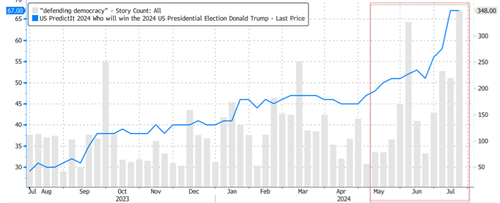
Meanwhile, BLM articulated very strongly that picking Harris without a public vote is a "blatant disregard for democratic principles" and "unacceptable."
"We have no idea where Kamala Harris stands on the issues, now that she has assumed Joe Biden's place, and we have no idea of the record of her potential vice president because we don't even know who it is yet," the leftist group said.
BLM emphasized:
"We do not live in a dictatorship. Delegates are not oligarchs. Any attempt to evade or override the will of voters in our primary system—no matter how historic the candidate—must be condemned. We demand an informal, virtual snap primary now that the incumbent president is no longer in the running."
It gets better...
"For the past few years, the Democratic Party has proclaimed that "democracy is on the ballot" in an effort to persuade Black voters to participate in the upcoming general election. They have presented this as the most serious election for democracy in our lifetimes. However, democracy isn't just an ideal to be protected against Republicans; it must also be safeguarded from erosions within the Democratic Party."
And better.
"Installing Kamala Harris as the Democratic nominee and an unknown vice president without any public voting process would make the modern Democratic Party a party of hypocrites."
Again, better.
"Imagine our first Black woman president not having won some sort of public nomination process. The pundits would immediately label it as affirmative action or a DEI move, and any progress made by a President Harris would be on shaky foundations. If Kamala Harris is to be the nominee, it must be through a process that upholds democratic principles and public participation."
Shalomyah Bowers, one of BLM's leaders, said:
"This is about the nominating process. Those of us who care about the principles of democracy cannot be serious about installing Kamala Harris and an unknown vice president as the Democratic nominee without any semblance of a people-powered process. Not delegates and party elites, but actually asking communities across the country if they believe this should be the democratic ticket. Anything less is unserious in the quest for democracy. Democracies are stronger when political parties operate with primary systems that allow for genuine participation."
Oh, the irony: the Democratic Party, once the champion of voter rights and freedom of speech, now finds itself accused of voter suppression and disenfranchisement. Like BLM said, "Democratic Party elites and billionaire donors"...
Soros.

Are attempting to install Harris, all in the name of "saving democracy" against Trump. Yet, in doing so, they undermine the principles they claim to protect.
Here is what X users are saying about this:
Let's not forget.
This is entertainment indeed.
|
|
[Markets]
Lineage raises $4.4 billion in year’s largest IPO to date
Published:7/24/2024 8:12:06 PM
|
|
[Markets]
Biden says he’ll keep fighting to lower costs as he passes the torch
President Joe Biden on Wednesday said he’ll continue to focus on combatting inflation, while describing his decision to exit the White House race as a way to get unity.
Published:7/24/2024 7:47:17 PM
|
|
[Markets]
Biden says he’ll keep fighting to lower costs as he passes the torch
Published:7/24/2024 7:47:17 PM
|
[Markets]
Pentagon's New Arctic Strategy Aims To Counter China–Russia Partnership
Pentagon's New Arctic Strategy Aims To Counter China–Russia Partnership
Authored by Andrew Thornebrooke via The Epoch Times (emphasis ours),
Pentagon leadership is unveiling its latest strategy for the Arctic region as competition for geopolitical advantage heats up with China and Russia.
 The Russian "50 Years of Victory" nuclear-powered icebreaker is seen at the North Pole on Aug. 18, 2021. (Ekaterina Anisimova/AFP via Getty Images) The Russian "50 Years of Victory" nuclear-powered icebreaker is seen at the North Pole on Aug. 18, 2021. (Ekaterina Anisimova/AFP via Getty Images)
The strategy takes aim at the increasing militarization of the region by Beijing and Moscow amid an expanding race for natural resources.
“The Arctic is strategically vital to U.S. security,” Deputy Secretary of Defense Kathleen Hicks told reporters during a July 22 briefing.
Ms. Hicks added that it’s imperative to national security that the United States ensure the Arctic “remains a secure and stable region” in the face of increasing aggression by the Chinese regime and Russia throughout the world.
The strategy directs the U.S. military to adopt a “monitor and respond approach” while “exercising [a] calibrated presence” in the region by coordinating with Arctic allies on issues pertaining to strategy, training, and equipment.
Ms. Hicks described the strategy as part of a “whole of government” effort to round out U.S. deterrence and readiness in the Arctic through regular training and exercises with allies, as well as investments in new systems, space capabilities, and cold weather gear.
Among the efforts outlined is a directive to modernize the North American Aerospace Defense Command, through which the United States and Canada respond to emergent threats in North American airspace.
The strategy is the Pentagon’s first since 2019 and follows the Biden administration’s National Arctic Strategy unveiled in 2022. It further outlines the U.S. objective to maintain an Arctic that is “peaceful, stable, prosperous, and cooperative,” while confronting communist China’s “pacing challenge” in the region.
The Arctic houses vast reserves of natural resources, including oil, natural gas, rare earth metals, diamonds, and pristine fishing grounds. For the last decade, the Chinese regime has increased its efforts to project power into the region, in part to seize those resources for itself.
The Chinese Communist Party (CCP), which rules China as a single-party state, declared China a “near-Arctic state” in 2012, although its nearest territory is some 900 miles away.
The Chinese regime has more than doubled its investment into Arctic projects since then and is focused on pursuing mineral extraction and scientific engagements, which could help to improve its military capabilities.
China also is attempting to build out a new economic corridor through the region. The so-called Polar Silk Road would link Asia and Europe by traversing the opening waterways of the Arctic along Russia’s northern coast rather than going through the more densely patrolled Indo-Pacific.
The subsequent flow of commercial, scientific, and military vessels into the region has increased, altering a geographic and strategic reality that had long seen little disturbance.
“We’ve seen an uptick in their [China and Russia’s] cooperation over the last several years,” Deputy Secretary of Defense for Arctic and Global Resilience Iris Ferguson said.
“We’ve also seen military exercises ... off the coast of Alaska.”
 U.S. Deputy Secretary of Defense Kathleen Hicks addresses the U.S. Chamber of Commerce in Washington on July 9, 2024. (Drew Angerer/AFP via Getty Images) U.S. Deputy Secretary of Defense Kathleen Hicks addresses the U.S. Chamber of Commerce in Washington on July 9, 2024. (Drew Angerer/AFP via Getty Images)
Ms. Hicks described China and Russia’s continued strategic cooperation as “concerning” and said it’s likely China’s scientific research in the Arctic that would have military applications.
“We always have concerns that there’s a military aspect to that,” she said.
“It is imperative that the joint force is equipped and trained with what they need to succeed in the Arctic.”
As such, Ms. Hicks said that the United States is investing in cold weather equipment just as it had previously invested in specialized gear for deployments in the Middle East.
Foremost among those investments is the development and deployment of polar icebreaker ships, which are required to break through the softening ice of Arctic trade routes in the summer months.
At present, the United States has just two diesel icebreakers, both of which are nearing the end of their life. Likewise, U.S. ally Finland maintains 12, and Canada maintains nine.
Russia, meanwhile, boasts some 30 diesel-powered and seven nuclear-powered icebreakers.
The White House announced earlier this month that the United States would work with Canada and Finland to jointly build up their icebreaker fleets as they look to bolster their defenses in the Arctic.
The Icebreaker Collaboration Effort (ICE Pact) will facilitate collaboration in producing polar icebreakers and enhance information sharing on related issues. It also will allow workers and experts from each country to train in shipyards across all three.
Ms. Hicks described the ICE Pact as “yet another example of the type of cooperation that we can leverage.”
“It’s about making sure we’re ready to execute missions there,” she said.
Likewise, Ms. Ferguson said, “This is the type of cooperation we should be leaning into more.”
|
|
[Markets]
Chipotle says it’s trying to avoid smaller portions and price increases this year
Shares of Chipotle Mexican Grill launched higher in after-hours trading on Wednesday, after the fast-casual Mexican chain reported second-quarter results that beat expectations and stuck with its its sales outlook, as a discount war brews elsewhere in the restaurant industry.
Published:7/24/2024 6:18:09 PM
|
|
[Markets]
‘Magnificent Seven’ stocks see worst drop since launch of ChatGPT — with $1.7 trillion in value erased in 2 weeks
The wheels appeared to be coming off the artificial-intelligence trade on Wednesday as members of the “Magnificent Seven” booked their worst daily drop since the launch of ChatGPT.
Published:7/24/2024 5:31:23 PM
|
|
[Markets]
Stocks see worst wipeout since 2022. Here’s what might happen next.
Published:7/24/2024 5:31:23 PM
|
|
[Markets]
These S&P 500 stocks fell the most on Wednesday — led by Lamb Weston and Tesla
Published:7/24/2024 4:47:19 PM
|
[Markets]
Florida Housing Downturn "Keeps Getting More Intense By The Day"
Florida Housing Downturn "Keeps Getting More Intense By The Day"
The housing market is shifting from a shortage of homes for sale to one with increasing inventory levels. Supply is rising for both new and existing homes. This added supply and high mortgage rates will likely put pressure on sky-high home prices.
Drilling down into the inventory story, Nick Gerli, CEO and Founder of real estate analytics firm Reventure Consulting, pointed out on X that all eyes should be on the "Florida housing downturn" because it "keeps getting more intense by the day."
Gerli noted housing inventory across the Orlando metro area has spiked to levels not seen since 2007.
"With active listings skyrocketing 82% over the last year. To 10,759 homes on the market. That's the highest level of supply since at least 2017. Suggesting: home prices will be going down in Orlando. And potentially by a lot," he said.
The analysts warned:
"This Florida housing downturn keeps getting more intense by the day. With a combination of investors, builders, and inflation-burdened homeowners off-loading houses at a historically fast clip. This increase in listings is now corresponding with a slowdown in demand, which is pushing inventory levels through the roof."
With inventory rising, he said home values in Orlando are 28% overvalued compared to their long-term averages using data from Reventure.
"That's a similar level of overvaluation to the previous peak in mid-2000s," he said, adding, "The more that inventory climbs, the greater the likelihood that prices fall."
He lists the ten most overvalued housing markets across the Sunshine State.
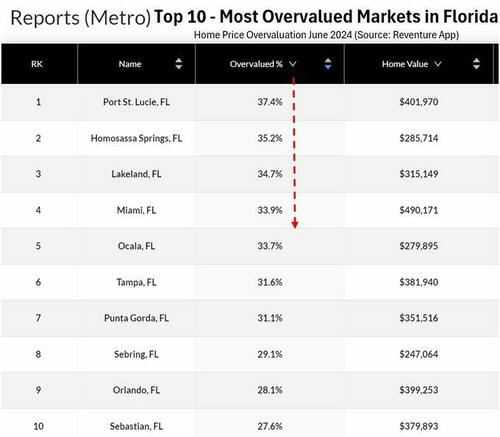
Last month, Gerli said Austin, Texas' housing inventory has "now spiked to the highest level on record. He said, "Values down nearly 20% already and could have another 15% decline to go."
Low inventory has plagued the overall US housing market in recent years, but the US existing home sales inventory shows a nearing reversal. This also comes as the number of news stories featuring 'housing inventory' in corporate media has spiked to record highs.
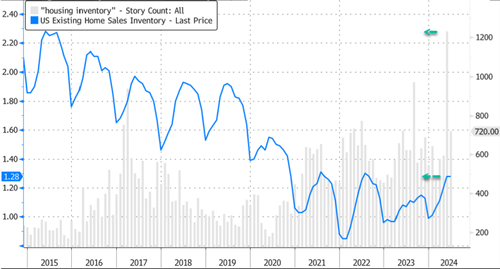
High mortgage rates and rising supply are needed in the second half to reverse sky-high housing prices. However, if the Federal Reserve's cutting cycle begins in September or the end of the year, a lower rate environment could drive demand, pushing prices higher. A continuation of higher rates for longer periods, with rising inventory, would likely begin to pressure home prices.
|
|
[Markets]
These S&P 500 stocks fell the most on Wednesday — led by Lamb Weston and Tesla
Some of the best performers of 2024 pulled back sharply.
Published:7/24/2024 4:23:42 PM
|
|
[Markets]
Invisalign’s maker says consumers downshifted to lower-priced clear braces
A stronger dollar also took its toll, Align said.
Published:7/24/2024 4:14:16 PM
|
|
[Markets]
Ford posts $1.1 billion loss in EV business, dragging Q2 profit below forecasts
Published:7/24/2024 4:14:16 PM
|
|
[Markets]
Chipotle’s stock rallies as renewed focus on quicker service helps Q2 earnings
Published:7/24/2024 3:50:00 PM
|
|
[Markets]
IBM logs a large earnings beat, sending its stock higher
The CEO called out growth in the company’s book of business for generative AI.
Published:7/24/2024 3:40:53 PM
|
|
[Markets]
ServiceNow’s stock pops after earnings beat as AI product sees swelling growth
Published:7/24/2024 3:40:53 PM
|
|
[Markets]
3 questions on Kamala Harris’s tax policies — and how close they are to Biden's
Published:7/24/2024 3:03:14 PM
|
[Markets]
Romania Scrambles Fighter Jets Amid Russian Attacks Near Its Border
Romania Scrambles Fighter Jets Amid Russian Attacks Near Its Border
In another dangerous close call with Russia on a NATO border, Romania scrambled fighter jets overnight in response to Russian military actions very close to the Ukraine-Romanian border.
Romania’s Defense Ministry said Wednesday that it scrambled the fighter jets in response to a series of Russian drone attacks near the border. It confirmed two F-16 aircraft took off just after 2am local time from the 86th Borcea Air Base, which lies east of the capital of Bucharest.
 F-16s/Illustrative, via NATO F-16s/Illustrative, via NATO
The Romanian fighter jets were given a mission to monitor "the aerial situation." The fighter jets returned to their base two hours later, and reportedly did not engage any targets or hostile cross-border threats.
There was a separate incident elsewhere in which Romanian authorities feared drone parts or debris may have fallen within Romania's sovereign territory:
Around the same time, Romania’s Tulcea County — which borders southern Ukraine’s Odesa region — was put on alert as Russian forces were said to have been carrying out drone attacks “against certain targets” near the NATO member’s border with Ukraine. Authorities did not specify where those attacks had taken place.
...“The Ministry of National Defence has ordered measures to conduct investigations in the field, in the vicinity of Plauru, to search for possible objects that have fallen on the national territory,” the defense ministry’s statement said, referring to a town located just 300 meters from the Ukrainian city of Izmail on the Danube River.
Romania has reported several times throughout the course of the war that drone debris fell on its territory. For example, last year in a very dangerous moment, Ukraine claimed that a Russian suicide drone attacked Romanian territory, something which Romania itself later rejected.
"This is yet another confirmation that Russia’s missile terror poses a huge threat not only to Ukraine’s security, but also to the security of neighboring countries, including NATO member states," Ukraine's foreign minister said at the time.

But this was widely seen as an attempt by Kiev to drag Romania directly into the conflict on its behalf: "The Ministry of National Defense categorically denies information from the public space regarding a so-called situation that occurred during the night of September 3 to 4 in which Russian drones allegedly fell on the national territory of Romania," Bucharest had responded at the time.
|
|
[Markets]
Retirement savers’ inflation concerns are easing, but their wallets may not be feeling the relief yet
The prices at supermarkets and on energy bills may not have decreased substantially yet, but retirement savers say inflation isn’t as big of an obstacle to reaching their long-term goals as it was last year.
Published:7/24/2024 2:29:44 PM
|
|
[Markets]
How financial ‘sextortion’ scams became a tragic epidemic on social media
Published:7/24/2024 2:12:45 PM
|
|
[Markets]
Election stress isn’t causing people to change their investing strategies — yet
Published:7/24/2024 1:31:32 PM
|
|
[Markets]
Kamala Harris vows to revive Biden’s defeated ‘care economy’ plans
Vice President Harris is set to revive key aspects of Biden's agenda, including housing assistance and child care.
Published:7/24/2024 1:23:07 PM
|
[Markets]
Watch Live: Netanyahu Addresses Divided Congress On Israel-Hamas Conflict
Watch Live: Netanyahu Addresses Divided Congress On Israel-Hamas Conflict
Watch Live:
* * *
Update (1358ET):
Israeli Prime Minister Benjamin Netanyahu is scheduled to address Congress at 1400 ET. The last time Netanyahu addressed Congress was in 2015. This address comes at a time of massive division between Republicans and Democrats and their approach to one of America's closest allies amid the ongoing war raging across Gaza.
House Speaker Mike Johnson has welcomed Prime Minister Benjamin Netanyahu to the Capitol, calling it a "very important time" for the Israeli leader's visit.
"This is a very important time," Johnson said, adding, "Our bipartisan congressional leadership recognized it as such and invited him here."
According to CNN, at least 50 Democratic lawmakers are planning to 'miss' Netanyahu's address to Congress.
"Dozens of members of Democrats are expected to skip Israeli Prime Minister Benjamin Netanyahu's address to Congress on Wednesday afternoon. Some are boycotting, others are attending a series of counter-programming events, and several cited scheduling conflicts as the reason." - CNN
Republicans are currently criticizing Vice President Harris for also planning to skip the event.

"The Vice President can't be bothered to show up at the nation's capital and the House chamber and to demonstrate the respect and courtesy that we thought was a given, but apparently not," Sen. John Cornyn (R-Tex.) said earlier.
Cornyn added, "I think it's absolutely disgraceful that the most senior members of the Democratic Party have chosen to give the Heisman to one of our closest allies in the Middle East."
Elon Musk is even attending.
Meanwhile, outside of the Capitol Building...
CNN notes that Hostages Families Forum has urged Netanyahu to open up to US lawmakers with the words: "There's a deal."
Without those words, "there will be neither victory nor revival," the forum expressed.
Netanyahu's speech comes at a critical juncture in the nine-month war. CNN cited US officials who expressed optimism about the potential for a deal that could free Hamas-held hostages and bring the conflict to the final chapter.
* * *
Israeli Prime Minister Benjamin Netanyahu arrived in Washington, DC, on Monday. Today, he plans to address Congress to strengthen American support for his multi-month war in Gaza to eliminate Hamas terrorists. Meanwhile, outside the Capitol Complex, thousands of pro-Palestinian protesters are set to participate in what organizers are calling a 'day of rage.'
On Tuesday evening, X user Andy Ngo said, "A large mob has flooded the US Capitol one day ahead of the planned "Day of Rage" against Netanyahu's visit to Congress."
Ngo said, "Far-left and Palestinian nationalist groups have announced plans to shut down Washington, DC in response to Israeli prime minister Benjamin Netanyahu speaking at the Capitol on July 24."
Ahmad Abuznaid, executive director of the US Campaign for Palestinian Rights and organizer of the event, told BBC News that protesters will "make the statement that war criminals like Netanyahu are not welcome" in Washington.
Republican House Speaker Mike Johnson invited Netanyahu to give his first address to Congress in nine years. He is scheduled to address lawmakers at 1400 ET. Johnson has warned against demonstrations inside the House chamber, saying there would be arrests "if we have to do it."
Another protest organizer said, "More people are willing to get arrested this time" compared to previous demonstrations.
"All the protests have shown a tone of rage, but this time is definitely different," said one of the organizers with the Palestinian Youth Movement, adding, "It is our enemy, our primary enemy, they are inviting into the White House."
Meanwhile, most leftist corporate media outlets are radio silent about the 'day of rage'... Most likely because protests would generate bad optics for the presumptive Democratic nominee, Vice-President Kamala Harris.
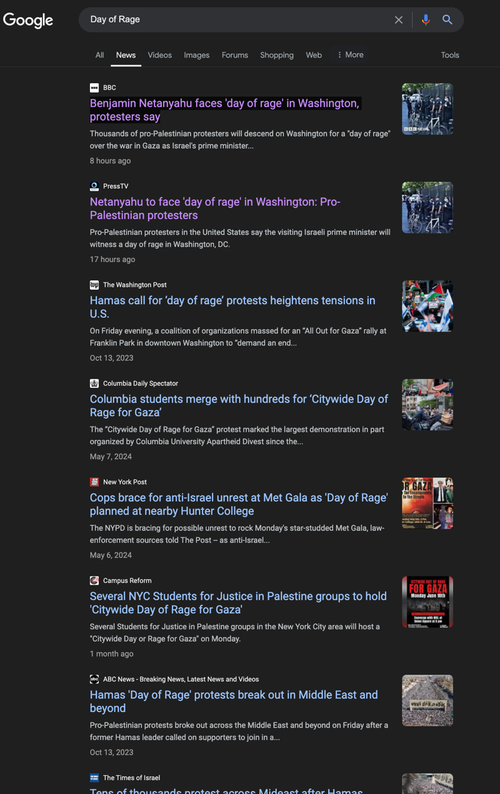
Netanyahu is also due to speak with President Biden and VP Harris at the White House. Former President Trump announced on Tuesday that he will talk with Netanyahu later this week at Mar-a-Lago in Palm Beach, Florida.
|
|
[Markets]
Why investors shouldn’t get caught up in the ‘seesaw’ of election volatility
Speculation about who might win the White House shouldn’t overshadow incoming economic data, says DWS head of fixed income.
Published:7/24/2024 1:23:07 PM
|
[Markets]
Watch: Bodycam Footage Of Trump Shooter On Sloped Roof Released
Watch: Bodycam Footage Of Trump Shooter On Sloped Roof Released
Authored by Steve Watson via Modernity.news,
New footage has been released showing local Beaver County police officers and a Secret Service agent on the roof with the neutralised shooter Thomas Matthew Crooks at the July rally where President Trump was almost assassinated.

The footage, obtained by Senator Chuck Grassley from the Beaver County Emergency Services Unit in compliance with congressional requests, shows police and the agent talking about what has transpired while standing over the dead and bloodied body of the shooter, with the rifle he used just a few feet away.
Grassley notes “July 13 Bodycam footage provides more info than Secret Service will share with America. We NEED detailed answers ASAP on security failures TRANSPARENCY BRINGS ACCOUNTABILITY.”
Here is the footage:
Here is a Rumble embed of the footage in case X blocks it on grounds of it being sensitive:
The biggest takeaway from the footage is that one of the county officers is heard saying that a police sniper in a building overlooking where Crooks was positioned was able to take multiple photos of Crooks before he began shooting.
This corroborates the timeline released by Senator Ron Johnson, chair of the Senate Homeland Security and Governmental Affairs Permanent Subcommittee on Investigations.
Another facet of the bodycam footage that is interesting is the Secret Service agent believes that two other people had been detained, but the local police don’t seem to know anything about it.
In addition, the fact that several people are standing on and moving around the roof completely rubbishes the excuse from the now former head of the Secret Service that the sloped roof was too hazardous to position personnel on.
Furthermore, close to the end of the video, someone says through one of the police radios “Do we have access to a drone to clear this water tower?”
The has been much speculation that a possible second shooter was seen on the water tower, however this has not been verified.
In addition to this video, a new eyewitness video of the moment the shooter fired on Trump has emerged. Crooks is also seen pointing his weapon at those filming him, while a former military eyewitness notes that the area was not secured and no one standing along the fence was vetted.
The new footage only serves to underscore the question, now also being asked by Trump himself, why on Earth was he on the stage when law enforcement knew there was a gunman on the roof?
* * *
Your support is crucial in helping us defeat mass censorship. Please consider donating via Locals or check out our unique merch. Follow us on X @ModernityNews.
|
|
[Markets]
Wine stocks move higher after California competitor files for bankruptcy and delists
The stocks of listed winemakers were mostly higher on Wednesday after Vintage Wine Estates Inc. filed for bankruptcy and said it is voluntarily delisting, removing one competitor from the fold.
Published:7/24/2024 12:26:45 PM
|
|
[Markets]
Three big questions on Kamala Harris’s tax policies — and how close they are to Biden’s
Harris once proposed taxing stock and bond trades, but there’s still much to learn about the presumptive Democratic nominee’s current policy ideas.
Published:7/24/2024 12:16:59 PM
|
|
[Markets]
OneStream IPO jumps 30% after pricing above its estimated range
KKR-backed cloud-services provider for chief financial officers raises $490 million.
Published:7/24/2024 11:15:37 AM
|
[Markets]
'She Wasn't Ackshually Border Czar': Media Gets Whiplash Rewriting History
'She Wasn't Ackshually Border Czar': Media Gets Whiplash Rewriting History
You knew it was coming. First, Reuters/Ipsos put their thumb on the scale in a new 'shock' poll showing Vice President Kamala Harris leading Donald Trump in the 2024 race - because they egregiously oversampled Democrats.

Now, the media is performing triage for Harris - who nobody likes. Especially her staff.
The problem? Harris was very publicly put in charge of the border crisis - which of course spiraled out of control (or went according to plan). At the time, the media dubbed her the "Border Czar."
Now, corporate media is claiming that was never actually true, and is just a right-wing talking point to smear their preferred candidate.
Behold:
 Screenshots via John Hasson Screenshots via John Hasson
Axios was even more egregious -
Except - the same exact outlet published this on April 14, 2021:

Oh...
This you girl?
|
|
[Markets]
Chicago Sky co-owner on the WNBA’s success, Angel Reese – and hotel minibars
Nadia Rawlinson spoke with MarketWatch about how working at Slack, Amex and Live Nation influenced how she runs the team
Published:7/24/2024 10:48:57 AM
|
|
[Markets]
AMC’s stock falls as movie-theater chain highlights weakness in its Q2 guidance
Earnings were hit by the lingering impact of the writers and actors strike last year, says CEO Adam Aron
Published:7/24/2024 10:28:21 AM
|
|
[Markets]
Kamala Harris has one thing many Americans covet: an ultralow mortgage rate
Six in 10 homeowners with a mortgage — including these two politicians — have a mortgage rate below 4%.
Published:7/24/2024 10:17:49 AM
|
[Markets]
DOJ Asks Supreme Court To Allow Some Blocked Title IX Rule Changes
DOJ Asks Supreme Court To Allow Some Blocked Title IX Rule Changes
Authored by Caden Pearson via The Epoch Times (emphasis ours),
The Department of Justice (DOJ) filed an emergency application on July 22 asking the Supreme Court to allow some parts of the changes the federal government made to Title IX rules related to sex discrimination, which were blocked by a lower court.
 The U.S. Supreme Court in Washington on June 30, 2018. (Charlotte Cuthbertson/The Epoch Times) The U.S. Supreme Court in Washington on June 30, 2018. (Charlotte Cuthbertson/The Epoch Times)
The DOJ is arguing that the wholesale pause to the rule changes was “more burdensome” than necessary, asking the Supreme Court to limit the district court’s injunction to 10 states and to only those changes related to gender identity.
In the emergency application, U.S. Solicitor General Elizabeth Prelogar argued that the more than two dozen states challenging the expansion of Title IX rules focused their objections on three provisions related to “gender identity,” leaving the vast majority of the Department of Education’s (DOE’s) expanded rules alone.
In April, the DOE issued guidance changing the scope of Title IX rules for educational institutions that receive federal funds. Title IX rules, which prohibit sex discrimination in schools, were expanded to include sexual orientation and “gender identity.”
The rule changes would mean that male students who identify as female could use women’s restrooms and spaces and join women-only organizations.
It would also expand the definition of “harassment” to include using a pronoun that aligns with sex at birth but conflicts with chosen gender identity. Schools that receive federal funding but refuse to comply risk losing that funding and facing lawsuits.
The expansion of the rules also included changes to recordkeeping requirements, grievance procedures, and protections for pregnant and postpartum students and employees. However, the changes at the heart of the lawsuits filed by Republican-led states and other groups related to the three provisions on gender identity.
On June 17, a federal district court in Kentucky blocked the new regulations in several Republican-led states while lawsuits were ongoing.
DOJ Asks For Narrowing of Injunction
On July 22, Ms. Prelogar asked the Supreme Court to narrow the district court’s injunction to the 10 states where the rule bans discrimination based on “gender identity”: Idaho, Indiana, Kentucky, Louisiana, Mississippi, Montana, Ohio, Tennessee, Virginia, and West Virginia.
“The district court held that respondents’ challenges are likely to succeed and issued a preliminary injunction. But the court refused to tailor the injunction to the two provisions of the Rule that are the source of respondents’ asserted injuries—or even to the three provisions they have challenged on the merits,” Ms. Prelogar wrote.
“Instead, the court enjoined the entire Rule, including dozens of provisions that respondents had not challenged and that the court did not purport to find likely invalid.”
The solicitor general has asked the Supreme Court for a partial stay of the district court’s order that would allow the unchallenged portions of the Title IX rule changes, such as provisions related to new mothers, to be implemented while the legal challenges play out.
The emergency application comes days after the Sixth U.S. Circuit Court of Appeals upheld the district court’s preliminary injunction.
Federal district court judges had ruled in favor of the states in three cases, blocking the rule from being implemented in 15 states and at schools attended by the children of members of two conservative groups: Moms for Liberty and Young America’s Foundation.
However, the regulation is still expected to go into effect in the remaining states by Aug. 1.
The rule change came after President Joe Biden issued an executive order on March 8, 2021, formally tasking the DOE with amending Title IX to include “discrimination on the basis of sexual orientation and gender identity.”
|
|
[Markets]
New-home sales fall to seven-month low in June as affordability remains strained
New home sales dipped in June, falling to the lowest level since November 2023.
Published:7/24/2024 9:13:21 AM
|
|
[Markets]
U.S. economy shakes off summer heat and expands faster, S&P finds
The U.S. grew faster in July, a pair of S&P surveys found, in a sign the economy is still holding up fairly well despite high interest rates and lingering inflation.
Published:7/24/2024 8:57:43 AM
|
|
[Markets]
U.S. stocks slide at the open, with Tesla shares diving 10%
Published:7/24/2024 8:49:04 AM
|
|
[Markets]
CrowdStrike blames global IT outage on bug in system for checking updates
A bug in the company’s testing software meant that a faulty update’s bad data wasn’t detected before going out to millions of machines.
Published:7/24/2024 8:49:04 AM
|
[Markets]
Blackstone Mortgage REIT Slashes Dividend By 24% As Distress Piles Up In CRE World
Blackstone Mortgage REIT Slashes Dividend By 24% As Distress Piles Up In CRE World
Blackstone Mortgage Trust, a real estate finance company that originates senior loans collateralized by commercial real estate across North America, Europe, and Australia, reported its second-quarter earnings on Tuesday. The report revealed a near-quarter reduction in its dividend due to rising defaults and increasing challenges with borrowers in making payments or refinancing office tower loans amid a worsening CRE downturn.
Bloomberg was the first to report that the $3.4 billion real estate investment trust BXMT slashed its dividend to 47 cents from 62 cents. BXMT has been distributing the 62-cent dividend to shareholders since late 2015.
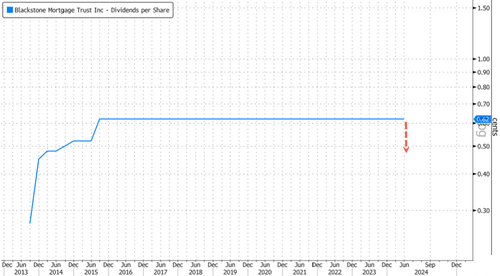
Shares of BXMT were down 6% in premarket trading in New York. If losses in premarket hold through the cash session, this would be the largest intraday decline in seven months.
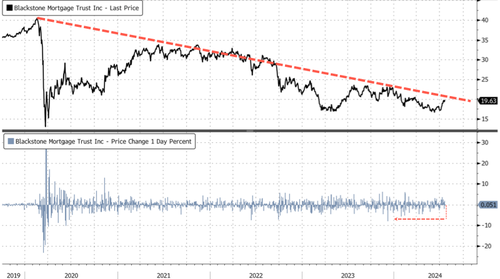
"Cutting the dividend will save about $100 million a year that can be reallocated to new loans or other investments," Bloomberg noted.
BXMT Chief Executive Officer Katie Keenan wrote in a statement:
"We believe stockholder return is well served by balancing current return with optimization of book value and long-term earnings potential through our strategic capital allocation decisions.
We assess the dividend with the Board each quarter, prudently considering a variety of factors, and our Board has declared a third quarter dividend of $0.47 per share, which we believe reflects a sustainable level relative to long-term earnings power.
With strong liquidity, accelerating repayments, and an emerging investment pipeline, BXMT is well positioned to deploy capital accretively in this environment and continue its forward trajectory through the cycle."
Most of the distress comes from BXMT's office portfolio, which makes up about 25% of its outstanding loans. Recent data from the Green Street Commercial Property Price Index shows US office tower values have plunged 37% from early 2022 peaks. Towers have been the worst hit in the CRE downturn. The rest of the commercial sector has slumped only 20%.
In recent quarters, short seller Carson Block has been vocal about his bearish BXMT bet.
"This kind of reminds me of 2007," the Muddy Waters founder told Bloomberg TV in mid-March, adding there was a period after the failure of Bear Stearns that the general market sentiment was that "'there's been deleveraging, everything's OK.' And it turned out not to be."
In recent weeks, Block was back on Bloomberg TV, warning:
"We got a hold of CLO data. So CLO loan data, which there's - that's apparently emblematic of BXMT's CLOs and what's on BXMT's balance sheet. So, a lot of these loans are in trouble. BXMT has not true them up in terms of the risk ratings. So we believe that as more and more of these loans are allowed to pick up in kind, in the second half of this year, BXMT is going to have to cut the dividend."
Well, Block was correct. He first unveiled the short thesis on BXMT in December and warned of a liquidity crisis.
In a note from analysts at Keefe Bruyette & Woods last week, BXMT modified three loans in California and Texas in June to provide extensions.
There are rumblings under the surface in the CRE world. Moody's recently offered a grim outlook that the CRE downturn is nowhere near the bottom and warned that hybrid working trends could result in around 24% of all US office towers standing vacant within the next two years.
|
|
[Markets]
Delta’s IT outage-related woes are costing airline $350 million and counting, analysts say
The IT outage caused by a CrowdStrike patch that led Delta Air Lines Inc. to cancel some 6,700 flights since Friday will cost the airline $350 million and shave 200 basis points off operating margins.
Published:7/24/2024 8:06:12 AM
|
|
[Markets]
Is Tesla’s stock having an identity crisis?
Automotive financials are weighing on Tesla shares Wednesday, but Elon Musk — and many bulls — are focused on the future potential in autonomy and robotics.
Published:7/24/2024 7:17:35 AM
|
[Markets]
Futures Slide As Ugly Mag 7, European Earnings Sour Trader Mood
Futures Slide As Ugly Mag 7, European Earnings Sour Trader Mood
Stock futures and global markets slumped, with tech dragging the indices lower, after disappointing results from Tesla and Alphabet were followed by lackluster reports from LVMH and Deutsche Bank in Europe. The first Mag7 earnings results were - as we warned in "Now Comes The Hard Part: AI Stocks Face Brutal Q2 Earnings Day Of Reckoning" - a flashing red warning with TSLA tumbling 7%, GOOG down -3%, and the rest of the Mag7 all lower. The yield curve is steepening with 2Y seeing follow-thru buying following yesterday’s strong auction. USD is stronger and commodities are weaker excluding energy. Today’s macro data focus is on Flash PMIs, New Home Sales/mortgage applications, and Inventories.
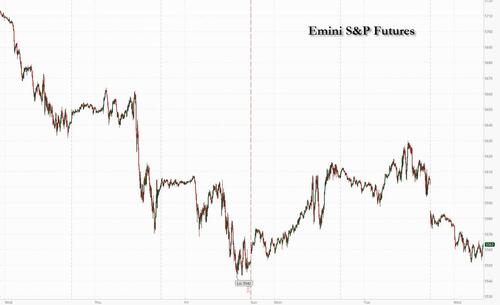
In premarket trading, it was all about the carnage in the first Mag7 reporters: Tesla shares plunged 8% in premarket trading after the company reported profit which missed estimates and postponed the unveiling of its highly anticipated autonomous robotaxis. Alphabet shares drop 3.4% as analysts highlight weakness in YouTube and higher capex spending. However, Google’s parent company reported second-quarter results that beat expectations on other key metrics. Here are some other notable US premarket movers:
- Enphase Energy shares jump 6.8% after the solar-equipment manufacturer reported second-quarter gross margin that was higher than estimates. Truist Securities said the third-quarter guidance, while below consensus estimates, should give investors confidence.
- Geron shares fall 6.7% after the biopharmaceutical company said Anil Kapur, its chief commercial officer, will depart on Aug. 31. Analysts note that the optics are not great as the reorganization comes shortly after Geron launched its highly-anticipated blood disorder drug, Rytelo.
- Seagate shares gain 4.9% after it forecast adjusted earnings per share for the first quarter that beat the average analyst estimate. The company also reported better-than-expected fourth-quarter adjusted EPS and revenue.
- Tesla shares fall 7.8% after the world’s most valuable automaker reported its fourth straight quarter of disappointing profits. Analysts noted that the stock might be pressured by the unexpectedly weak automotive gross margins in the second quarter.
- Texas Instruments shares rose 2.8% after the chipmaker reported its second-quarter results and gave a forecast that was largely in line with expectations, reassuring investors that a revival is underway in key markets.
- Visa shares fall 3.2% after the company reported third-quarter net revenue and payment volume that fell short of the average Wall Street estimate.
Almost a month after our warning that this earnings season will be ugly (see here), analysts are poring over this week’s raft of earnings for signs that the tech-driven rally of the first half of the year has longer to run.. and so far they aren't finding them. The market is facing pressure into the summer months, with volatility also likely to be heightened by uncertainty as the US presidential race gathers pace. Hopes for the so-called Magnificent Seven are lofty. Analysts project profits at these companies to have jumped 30% in the second quarter, compared with a 10% increase for the S&P 500 as a whole, according to data compiled by Bloomberg Intelligence.
“What we’re seeing during this earnings season is the growing gap between the rather optimistic profit consensus from analysts and slowing economic growth,” said Benoit Peloille, chief investment officer at Natixis Wealth Management. “With unemployment now on the rise, earnings disappointment is to be expected and that’s what we’re seeing this season. This is true for the US and to some extent for Europe.”
So far, about a fifth of S&P 500 companies have reported results. Analyst estimates slid ahead of the season as they usually do, but market strategists including Morgan Stanley’s Michael Wilson and Barclays’ Emmanuel Cau have warned that the downgrades have been milder on this occasion, setting the bar for positive surprises higher. Investors appear particularly worried about sales, with less than half of companies beating expectations.
“Mixed earnings, alongside softening activity data and high political uncertainty keep markets on edge,” said Barclays’ Cau.
Major European markets are all lower with most down at least 1 sigma: Spain is outperforming, and France is lagging. Eurozone PMIs were weaker than expected, missing Mfg, Services and Composite as well as printing lower MoM. The Stoxx 600 is down almost 1% led lower by consumer product names and banks: Deutsche Bank dropped on its first quarterly loss in four years and scrapped plans for a buyback Germany’s largest lender said trading slowed and that it would most likely refrain from conducting a second share buyback this year, after a €1.3 billion ($1.4 billion) litigation provision tied to its Postbank retail unit. LVMH tumbled 6.5% to a six month low after sales in China plummeted during the quarter, adding evidence that an economic slowdown is hurting European companies and that even the strongest brands are succumbing to a slowdown in demand for high-end items. Analysts flagged a hit from currency movements as well as weakness in China. Here are the other notable European movers:
- Nexans shares jump as much as 9.6% to their highest intraday level since July 2007, after the French cable manufacturer boosted its full-year adjusted Ebitda forecast above consensus expectations.
- Reckitt Benckiser shares rise as much as 5% with investors encouraged by the decision to sell non-core homecare brands and review options for its baby formula arm.
- Dassault Aviation shares gain as much as 11% after the French airplane maker reported 1H earnings that impressed on cash flows, reassuring investors after a selloff in recent months.
- EasyJet shares rise as much as 9.7% after the company reported in-line third-quarter results, quelling concerns about summer demand after Ryanair’s reduced fare outlook.
- Sodexo shares climb as much as 5.1% after the firm announced the sale of subsidiary Sofinsod, which analysts note simplifies the ownership structure and monetizes an illiquid asset.
- Aston Martin shares rise as much as 12% after the carmaker reported revenue for the second quarter that beat the average analyst estimate.
- LVMH shares drop as much as 5.2% to a six-month low after a disappointing set of results signals that even the strongest brands are succumbing to a slowdown in demand for high-end items.
- Bank stocks sink to be among the worst-performing sectors, weighed down by Deutsche Bank which slumped after posting a loss and saying it will most likely skip a second share buyback this year.
- Iveco shares drop as much as 12.5%, the biggest decline since January 2022, after the Italian truckmaker reported a free cash flow which “disappointed again,” according to Morgan Stanley.
- ASMI shares fall as much as 4.5%, giving back Tuesday’s pre-earnings gains. The chip equipment maker reported lower-than-expected profitability, likely due to weaker sales from China.
- Metso shares slide as much as 7.3% after the Finnish industrial machine group presented disappointing second-quarter earnings, affirming faltering investor confidence.
- Temenos shares decline as much as 5.9% after the financial software firm cut its sales growth guidance for the full-year, albeit with other targets maintained for now.
In FX, the dollar is steady. The yen is the best performer among G-10 FX, extending gains versus the dollar after a Reuters report said the BOJ will weigh raising interest rates at its meeting next week. The euro slipped as European data showed private-sector activity barely grew.
In rates, treasuries hold small gains in early US trading Wednesday, led by short maturities following record foreign demand for Tuesday’s 2-year note auction; 10Y yields edged lower to 4.23% as investors awaited US debt auctions and manufacturing PMI data, while yields in the 2-year sector are more than 2bp lower on the day near session lows, further steepening the yield curve. With 10- to 30-year yields lower by only ~1bp, key curve spreads are approaching year’s steepest (or least inverted) levels; new 2-year note’s yield is less than 20bp higher than 10-year note’s, the smallest margin since January. The supply cycle continues with $70b 5-year note sale at 1 p.m. New York time. German and French 10-year government bonds are little changed and the euro is slightly lower after soft PMI data from the bloc, most notably in manufacturing. Gilts are also steady after the UK figures were more encouraging while the pound has pared an earlier fall.
In commodities, oil prices advance, with WTI rising 0.9% to ~$77.70 a barrel. Spot gold is steady around $2,413/oz.
Today's US economic data calendar includes June preliminary wholesale inventories and June advance goods trade balance (8:30am), July preliminary S&P Global US manufacturing and services PMIs (9:45am) and June new home sales (10am). Fed Governor Bowman and Dallas Fed President Logan are slated to give opening remarks at an event on Texas community partnerships at 4:05pm, the only scheduled appearances until after the next FOMC meeting ends July 31
Market Snapshot
- S&P 500 futures down 0.8% to 5,554.00
- STOXX Europe 600 down 0.8% to 511.09
- MXAP down 0.5% to 181.88
- MXAPJ down 0.4% to 564.38
- Nikkei down 1.1% to 39,154.85
- Topix down 1.4% to 2,793.12
- Hang Seng Index down 0.9% to 17,311.05
- Shanghai Composite down 0.5% to 2,901.95
- Sensex down 0.7% to 79,843.44
- Australia S&P/ASX 200 little changed at 7,963.72
- Kospi down 0.6% to 2,758.71
- German 10Y yield -2bps at 2.42%
- Euro down 0.2% to $1.0833
- Brent Futures up 0.7% to $81.57/bbl
- Gold spot up 0.1% to $2,412.56
- US Dollar Index little changed at 104.52
Top Overnight News
- LVMH led a sell-off in global luxury stocks on Wednesday after the industry bellwether reported slower than expected sales from shoppers reining in spending on champagne and handbags. Other luxury stocks also declined as investors worried about demand from Chinese consumers and the outlook for a sector that is slowing down after several years of record growth. FT
- Deutsche Bank stock dropped after the lender posted its first quarterly loss in four years because of a legal provision and said it probably won’t buy back shares this year. Revenue from fixed-income and currencies fell about 3%, trailing the average 5% gain on Wall Street. IB income rose about 10%. BBG
- Europe’s flash PMIs fall short of expectations in Jul, with manufacturing coming in at 45.6 (down from 45.8 in June and below the Street’s 46.1) while services dips to 51.9 (down from 52.8 in June and below the Street’s 52.9), and inflation was mixed (with higher input costs but cooler selling prices). S&P
- Donald Trump filed a legal complaint against the transfer of Joe Biden’s $96 million campaign war chest to Kamala Harris. Elon Musk said he’s donating to a pro-Trump super PAC but at significantly lower levels than the $45 million per month previously reported. BBG
- Blackstone is doubling down on its international credit business and will target growth in a broader range of debt including local-currency investments. BBG
- US crude inventories fell by 3.86 million barrels last week, with a drop also seen at Cushing, the API is said to have reported. The fourth week of declines would be the longest stretch since September if confirmed by the EIA today. BBG
- CrowdStrike blamed a bug in a safety mechanism for allowing flawed data to go out to customers in a botched update, causing last week’s meltdown. BBG
- The Federal Trade Commission is seeking information about how artificial intelligence and other technological tools may allow companies to vary prices using data they collect about individual consumers’ finances and shopping habits. WSJ
Earnings
- Alphabet Inc (GOOG) Q2 2024 (USD): EPS 1.89 (exp. 1.84), Revenue 84.742bln (exp. 84.18bln). Revenue breakdown. Google Advertising rev 64.6bln (exp. 64.4bln).Google Cloud Revenue 10.35bln (exp. 10.158bln). Google Search & Other Revenue 48.51bln (exp. 47.65bln). Shares fell 2.2% after hours
- Tesla Inc (TSLA) Q2 2024 (USD): Adj. EPS 0.52 (exp. 0.62), Revenue 25.5bln (exp. 24.77bln). Co. said the focus remains on company-wide cost reduction. Shares fell 7.8% after hours.
- Visa Inc (V) Q3 2024 (USD): Adj. EPS 2.51 (exp. 2.43), Revenue 8.9bln (exp. 8.89bln). Shares fell 3.3% after hours.
A more detailed look at global markets courtesy of Newsquawk
APAC stocks were mostly rangebound with a negative bias seen following the lacklustre handover from Wall Street after risk appetite was dampened by underwhelming earnings results. ASX 200 was indecisive and briefly clawed back early losses with sentiment clouded by mixed Flash PMI data. Nikkei 225 retreated at the open amid headwinds from a firmer currency, while PMI data was also varied. Hang Seng and Shanghai Comp. were subdued with early pressure from demand concerns after China's slowdown weighed on luxury spending which was evident in the 14% decline in LVMH sales in the region, while Chow Tai Fook Jewellery was among the worst hit in Hong Kong after its quarterly group retail sales fell 20% Y/Y. However, the mainland bourse managed to recover losses to return to relatively flat territory after rebounding from a brief dip beneath the 2,900 level.
Top Asian News
- BoJ to weigh rate hike next week and have a detailed plan to halve bond buying in the coming years, according to Reuters citing sources. BoJ to taper bond buying gradually at pace near market consensus . July rate hike decision is a close call and consumption outlook is key; source describes it as a judgement call in terms of acting now or later in the year. BoJ sees no compelling reason to rush, given price rises remain moderate and inflation expectations are stable. Source adds the BoJ is likely to taper its bond purchases gradually and in several stages, at a pace roughly in-line with the markets dominate view, to avoid any yield spike.
European bourses, Stoxx 600 (-0.9%) began the session on a weaker footing, and sentiment has continued to dwindle as the morning progressed; as it stands indices resides at lows. Today’s European PMI releases have been poor, with Germany’s composite surprisingly falling into contractionary territory, whilst the EZ managed to stay in expansionary territory and noted that its GDP Nowcast still pointed towards growth in Q3. European sectors hold a strong negative bias, with only Travel & Leisure remaining afloat, which is assisted by post-earning gains in easyJet (+5.7%). Consumer Products is the clear underperformer, after LVMH (-4.7%) results, which has also weighed on peers. Banks are also towards the foot of the pile, given the significant losses in Deutsche Bank (-6.7%).
Top European News
- Deutsche Bank Scraps Buyback After First Loss in Four Years
- Temenos Drops on Guidance Cut, Hindenburg Report Hurts Sales
- Reckitt to Sell Some Homecare Brands, Review Formula Unit
- Informa to Buy Cannes Lions Owner Ascential for £1.2 Billion
- Atos Chair Mustier Becomes CEO as Restructuring Moves Ahead
- DWS Promises Better 2024 Despite Quarterly Client Outflows
- DSV Is Ready For Big M&A, CEO Says Amid DB Schenker Reports
FX
- DXY is steady around the 104.50 mark with the USD showing mixed performance vs. peers. The USD is softer against havens such as CHF and JPY whilst faring better against risk-sensitive currencies. 104.55 marks today's peak for the DXY with not much in the way of resistance until the 100DMA at 104.82.
- EUR is hampered by a soft set of PMI metrics with the German report a notable lowlight for the region; the release suggests a 0.4% Q/Q contraction for German GDP in Q3. As such, EUR/USD's journey to the low 1.08's has continued, currently around 1.0830.
- GBP is a touch softer vs. the USD with Cable extending its move below the 1.29 mark. GBP/USD saw some slight reprieve from mixed PMI metrics with the low for the pair currently at 1.2878.
- JPY is continuing to edge out gains vs. the USD. Price action has followed the recent broader trend but is also likely being aided by the current risk environment. USD/JPY has taken out support at the 155 level, which some desks had seen as a key test for the pair,slipping to a 154.31 base on a recent Reuters source piece.
- Antipodeans are both the G10 underperformers. AUD is extending its losing streak vs. the USD to an 8th consecutive session with the pair now below the 0.66 level for the first time since 17th June.
- CAD is steady vs. the USD in the run up to today's BoC policy announcement. Consensus is for a cut, however, analysts are not unanimous in this view and therefore there could be some choppiness on the decision itself.
- PBoC set USD/CNY mid-point at 7.1358 exp. 7.2795 (prev. 7.1334).
Fixed Income
- Bunds are firmer after a dismal German PMI series and, by extension, a poor EZ report. The French release earlier sparked some modest pressure in Bunds, but could ultimately be caveated by the impending Olympics. Bunds to a 132.66 new WTD peak but stalling before last week’s 132.77 best. Bunds were heading lower into the German auction, which then fuelled further weakness
- USTs are moving in-line with EGBs thus far with macro newsflow, but docket does pick up later on with the region's own PMIs and a 5yr auction both scheduled. Currently, at a 110-31 peak with yesterday’s best just above at 111-00.
- Gilts were bid their own PMIs, which were mixed, but had an overall hawkish skew, and as such, fell from 98.13 to a 97.94 base, before paring back towards the 98.00 mark, following a strong 2054 auction.
- UK sells GBP 2.25bln 4.375% 2054 Gilt: b/c 3.35x, average yield 4.636%, tail 0.2bps
Commodities
- Crude is trading with modest gains thus far following another slump yesterday. Weak Chinese demand is the factor cited for the recent persisting weakness in crude. Brent counterpart resides in a 81.12-67/bbl range.
- Overally mixed and contained trade across precious metals amid a lack of pertinent catalysts to drive price action overnight, whilst the morning saw the complex unreactive to Flash PMI data from Europe. Spot gold trades in a USD 2,419.26-2,405.01/oz parameter after topping resistance around USD 2,412/oz.
- Mixed trade for base metals with the complex awaiting the next catalysts after being unfazed by European Flash PMIs.
- US Private Inventory Data (bbls): Crude -3.9mln (exp. -1.6mln), Distillate -1.5mln (exp. +0.2mln), Gasoline -2.8mln (exp. -0.4mln), Cushing -1.6mln.
Geopolitics: Middle East
- IDF launched a new incursion into West Bank’s Tulkarem, according to a source cited by Times of Israel.
- Artillery shelling and Israeli tank fire was reported on east of Khan Younis, according to Al Jazeera.
- Islamic Resistance in Iraq said it conducted a drone attack on a vital target in the north of Eilat, according to Al Jazeera.
Geopolitics: Other
- French prosecutors said a Russian was arrested over 'destabilisation' plot during Paris Olympics, according to AFP.
- Japanese Chief Cabinet Secretary Hayashi said Russia's decision to restrict 13 Japanese individuals' entry including Toyota Motor's Chairman is "totally unacceptable" and they filed a complaint against Russia over their decision to restrict entry.
US Event Calendar
- 07:00: July MBA Mortgage Applications -2.2%, prior 3.9%
- 08:30: June Wholesale Inventories MoM, est. 0.5%, prior 0.6%
- June Retail Inventories MoM, est. 0.5%, prior 0.7%
- 08:30: June Advance Goods Trade Balance, est. -$98.7b, prior -$100.6b, revised -$99.4b
- 09:45: July S&P Global US Manufacturing PM, est. 51.6, prior 51.6
- July S&P Global US Composite PMI, est. 54.2, prior 54.8
- July S&P Global US Services PMI, est. 54.9, prior 55.3
- 10:00: June New Home Sales, est. 640,000, prior 619,000
DB's Jim Reid concludes the overnight wrap
The Olympics unofficially starts today in Paris ahead of Friday's opening ceremony. The five of us are going to Paris for a long weekend in two weeks' time to a) watch the synchronised swimming finals (artistic swimming as it's now called), and b) go to EuroDisney. I've refused to waste good money on tickets for the twins for the artistic swimming so we'll be roaming the streets in Paris while my wife and Maisie go. In addition I'll be also trying to find some urgent client meetings to do in Paris which means I can avoid two days at EuroDisney. Help!
The market’s torch has shone slightly less brightly in the last 12 hours with the S&P 500 (-0.16%) losing some late traction after Monday’s rebound with S&P (-0.65%) and Nasdaq (-0.95%) futures notably lower this morning after a soft start to Mag-7 earnings after the bell. At the close last night the S&P 500 declined for the fourth time in five sessions, the first such occurrence since April, and having seen its biggest 3-day fall since October at the back end of last week. These choppy markets come as the focus is now squarely on earnings season. Alphabet and Tesla last night will be followed by Apple, Meta, Microsoft and Amazon next week but with Nvidia the laggard on August 28th.
Those tech earnings started on an underwhelming note last night. Alphabet did post a modest revenue and earnings beat, boosted by cloud computing and advertising growth, but its shares slid -2.2% in post-market trading after the management call alluded to upcoming expense pressures. Meanwhile, Tesla fell by -7.7% after-hours as it missed earnings expectations for a fourth consecutive quarter and delayed its Robotaxi event until October. Both Alphabet and Tesla had earlier fallen by about 1% in the final 30 minutes of regular trading (they were +0.07% and -2.04% on the day respectively), contributing to a weak equity close.
Earlier yesterday, we had plenty of other results that dictated the market narrative. For instance, Spotify (+11.96%) had its best performance since January 2023 after announcing a record profit, along with growth in paid subscribers of 12% from the previous year. Other outperformers included General Electric (+5.68%), which had its best day since April after raising its guidance, whilst SAP (+7.15%) had its best day since January after their own results. That said, it wasn’t all good news, as UPS (-12.05%) saw the biggest daily decline in its share price since it first went public in 1999, after its earnings missed estimates.
Amidst all those results, equity indices had a mixed day across both sides of the Atlantic. In the US, both the Magnificent 7 (-0.05%) and the NASDAQ (-0.06%) saw marginal losses, but small caps had an excellent day, with the Russell 2000 up +1.02% and with the more cyclical sectors leading the upside. Over in Europe the STOXX 600 was marginally higher (+0.13%) amid strong gains for Germany’s DAX (+0.82%), itself helped along by the SAP advance mentioned above. But there were losses for the UK’s FTSE 100 (-0.38%) and France’s CAC 40 (-0.31%).
Meanwhile for sovereign bonds, there were gains on both sides of the Atlantic. In part, that came amidst a fresh decline in oil prices, which added to hopes that inflationary pressures were waning. Indeed, WTI crude was down -3.53% yesterday to a one-month low of $76.96/bbl. Alongside that, there was some weaker second-tier data out of the US, which cemented investors’ confidence that the Fed were on course to cut rates at their September meeting. The data showed existing home sales were down -5.4% in June (vs. -3.2% expected), taking them down to an annualised rate of just 3.89m, their lowest in six months. Separately, the Richmond Fed’s manufacturing index was down to -17 in July (vs. -7 expected), which is its lowest level since May 2020 during the Covid lockdowns.
With growing conviction about future rate cuts, that helped push yields on 2yr Treasuries down -2.6bps to 4.49%, whilst those on 10yr Treasuries were down - 0.2bps to 4.25%. Front-end outperformance was aided by a very strong 2yr auction which saw $69bn of bonds issued 2.3bps below the pre-sale yield as primary dealer take up fell to its lowest since the start of the data in 2003.
The bond gains were larger in Europe, but there was also a fairly sharp widening in sovereign bond spreads there, with those on 10yr bunds down -5.7bps, whereas those on 10yr OATs (-1.9bps) and BTPs (-2.6bps) saw much smaller declines. Indeed, the Franco-German spread moved back up to 69bps, which is its widest level since the second-round election results that led to gridlock in the National Assembly. On the topic of French politics, yesterday we heard that the left-wing New Popular Front alliance agreed to put forward Lucie Castets, an official for the city of Paris and relatively unknown, as their candidate for prime minister. As a reminder the left-wing finished first in the election but well short of a majority. It will now be up to President Macron whether to nominate her as PM. Last night he commented that he would not appoint a PM until after the end of the Paris Olympics (on August 11).
In terms of US politics, it’s become clear that Vice President Harris has all-but-won the Democratic nomination, setting up a November general election contest with Donald Trump. As mentioned yesterday, the Associated Press have surveyed the Democratic delegates, and found that a majority of them support Harris as the nominee. And even though they could change their minds in theory, no other challenger has emerged against Harris, who has received endorsements from right across the party. Tonight we’ll also hear from President Biden, who’s delivering an Oval Office address at 8pm Eastern Time.
Those overnight losses on Wall Street are echoing across Asian equity markets this morning. Across the region, the Hang Seng (-0.59%) is leading losses with the Nikkei (-0.22%), the KOSPI (-0.11%) and the CSI (-0.10%) all trading slightly lower while the Shanghai Composite (+0.01%) is holding in slightly better.
Early morning data showed that Japan’s flash manufacturing PMI fell to 49.2 from the previous month’s 50.0. However, the weakness in manufacturing sector was largely offset by the flash services PMI surging to 53.9 in July from 49.4 in June. The latter reading was the strongest expansion since April, and came amid improving consumer demand and confidence. As a result, the flash composite output index rose to 52.6 in July from 49.7 in June.
On the back of this, the Japanese yen (+0.44%) continues to gain ground for the third consecutive day trading at 154.91 against the dollar. Meanwhile, the Bank of Japan (BOJ) is scheduled to meet next week with around 30% of economists expecting a hike, albeit with pretty much all saying the balance of risks are biased towards a hike around their central case scenario.
To the day ahead now, and data releases include the flash PMIs for July from the US and Europe. Other US data includes new home sales for June, and the advance goods trade balance for June. From central banks, we’ll get a policy decision from the Bank of Canada. And we’ll also hear from ECB Vice President de Guindos, the ECB’s Lane, and the Fed’s Bowman and Logan. Finally, earnings releases include IBM, AT&T and Ford.
|
|
[Markets]
Oil prices bounce after industry data shows drop in U.S. crude inventories
Oil futures rose Wednesday morning, bouncing from the lowest finish in six weeks, after industry data showed a decline in U.S. crude and gasoline inventories.
Published:7/24/2024 6:51:18 AM
|
|
[Markets]
The lesson from 17 first cuts of the cycle is more sobering for the stock market than it appears
The stock market usually goes up after the first cut, but the reason why might not be as helpful this time around.
Published:7/24/2024 6:42:37 AM
|
|
[Markets]
Elections boil down to two things: Your money and your community
Which candidates on the ballot reflect your financial interests or the interests of those who face economic insecurity?
Published:7/24/2024 6:10:39 AM
|
|
[Markets]
Mortgage rates fall to 5-month lows
Published:7/24/2024 6:10:39 AM
|
|
[Markets]
Kamala Harris surges in the betting markets – and I bet ‘Kamalaphoria’ has more room to run
Bookies and gamblers are sharply raising their bets on a Kamala Harris win in November after the vice-president’s first full day as the presumptive Democratic nominee.
Published:7/24/2024 6:10:39 AM
|
|
[Markets]
AT&T matched expectations on earnings but beat on these two key measures
Published:7/24/2024 5:55:14 AM
|
[Markets]
Growing Power Needs Call For Grid-Enhancing Technologies
Growing Power Needs Call For Grid-Enhancing Technologies
Authored by Andrew Phillips via RealClearEnergy,
The rise of AI data centers, growing electrification, and industrial growth is heralding a new era of U.S. power consumption. As our country advances, so too must our power grid. Building new transmission lines can take a significant amount of time and investment. With America’s growing power appetite not slowing down and an increasing need for renewables to meet net-zero targets, interim steps can be taken to ensure continued reliable, affordable electricity to keep pace with our growing economy.

Grid-enhancing technologies (GETs) can promote efforts to increase the capacity, efficiency, reliability, and safety of existing transmission lines. GETs are hardware and/or software that can reduce congestion costs and improve integration of renewables while increasing capacity and reliability. According to the U.S. Department of Energy, GETs can defer or reduce the need for significant investment in new infrastructure projects and increase the use of renewables by maximizing the capacity of the current infrastructure.
Power companies are seeking all options for increasing delivery capacity to support energy transition objectives and large demand increases from AI and manufacturing growth. The recent Energy Future Forum, sponsored by RealClearEnergy, underscored the urgency of addressing these challenges (see the video linked above for the part from James Danly, previously Commissioner at FERC, on the subject).
As DOE noted in its October 2023 “National Transmission Needs Study,” there is a pressing need for additional transmission infrastructure in nearly all regions of the country. Specifically, the study projected regional transmission capacity will need to more than double to 20% by 2035 and interregional capacity will need to grow more than five-fold. According to the study, significant transmission deployment is needed as soon as 2030 in the Plains, Midwest, and Texas regions. By 2040, large deployments will also be needed in the Mountain, Mid-Atlantic, and Southeast regions.
To address the more immediate, interim steps, EPRI recently launched a new GETs-related initiative to expand and accelerate laboratory testing, research, and lessons learned to create a smarter and more resilient energy infrastructure. The Grid-Enhancing Technologies for a Smart Energy Transition (GET SET) initiative is focused on four potentially high-impact technologies that can increase capacity for transmission:
These technologies have the potential to reduce congestion costs, improve the integration of renewables, increase capacity, and provide grid service applications in new and existing transmission networks. GETs can maximize the capacity of existing assets now, while transmission providers build new capacity for the long term. How do they do that?
For example, advanced conductors are designed to operate at higher temperatures, can increase the power transfer capacity of existing transmission networks and fully utilize existing rights-of-way. While these conductors have been available for several years, uncertainty remains on some aspects of procurement, installation, inspection methods, and long-term performance. At our advanced laboratories in Lenox, Mass., and Charlotte, N.C., has been and will continue to perform extensive life expectancy and specifications testing of multiple carbon, ceramic, and ultra-high strength, steel-cored conductor systems.
Evaluating and vetting these technologies today as they are being deployed on a wider scale can reduce the risk upon full deployment. However, the scale to which these technologies have been studied vary widely between the four categories. These technologies can also be integrated into the new infrastructure that is built to maximize the capacity of the entire grid.
EPRI’s work cannot be done in a vacuum. As part of GET SET, we’re also collaborating with numerous organizations, including the North American Electric Reliability Corporation, Energy Systems Integration Group, the North American Transmission Forum, and more than two dozen electric utilities. EPRI is working with several companies and technology providers to deploy GETs now, while leveraging further research needed to deploy more broadly in the future.
Electricity is the backbone of the U.S. economy. As our country’s power needs grow while electricity companies balance affordability and reliability, we need all the tools in the toolbox at our disposal.
Andrew Phillips is Corporate Vice President of Transmission and Distribution Infrastructure at the Electric Power Research Institute (EPRI).
|
|
[Markets]
Salt Lake City to host Winter Games for second time
Published:7/24/2024 5:46:09 AM
|
|
[Markets]
LVMH shares slump on signs the post-COVID luxury boom is over
Published:7/24/2024 5:32:51 AM
|
|
[Markets]
J.D. Vance broke off talks on bipartisan childbirth plan amid VP search
Former president Donald Trump’s running mate pulled out of talks with Democrats around the time vetting began.
Published:7/24/2024 5:32:51 AM
|
|
[Markets]
German manufacturing slumps, eurozone economy listless in July
Published:7/24/2024 4:40:54 AM
|
|
[Markets]
Bond yields dip as investors seek safety after Tesla, Alphabet results
Published:7/24/2024 4:32:40 AM
|
[Markets]
French MP Sparks Uproar By Denouncing Israeli Presence Paris Olympics
French MP Sparks Uproar By Denouncing Israeli Presence Paris Olympics
Via Middle East Eye
The participation of Israel in the Olympic Games that will begin next Friday in Paris has aroused heated controversy in France after a left-wing MP said the country should be shunned over its war in Gaza. At a pro-Gaza rally on Saturday, France Unbowed (LFI) MP Thomas Portes was filmed saying Israel’s Olympic delegation was “not welcome in Paris”, and that there should be protests against its taking part in the games.
“Israeli athletes are not welcome at the Olympic Games in Paris,” Portes said, calling for using “the deadline” of the event and “all the levers that we have to create mobilizations and denounce the presence of a state which today massacres [the Palestinian] people.”
 Image: AP Image: AP
Portes represents Seine-Saint-Denis, the department that hosts the Olympic Village and the Stade de France. Later, he clarified his comments, saying that he was not opposed to the presence of Israeli athletes but wanted “French diplomacy to put pressure on the IOC [International Olympic Committee] so that the Israeli flag and anthem are not allowed during these Olympic Games, as is done for Russia”.
Despite his follow-up comments, the MP’s remarks sparked an outcry, with many political figures on the right and left denouncing them. Interior Minister Gerald Darmanin expressed the “disgust” he felt at Portes’s remarks, which he said “smack of antisemitism”, adding that the MP was putting “a target on the backs of Israeli athletes”.
Darmanin announced that the Israeli athletes would receive 24-hour protection from the GIGN, French elite forces, during the competition.
Reacting to Portes’ statements, Foreign Minister Stephane Sejourne told a meeting of European Union counterparts in Brussels on Monday: “I want to say that on behalf of France, to the Israeli delegation, we welcome you to France for these Olympic Games.”
On the left, Carole Delga, the socialist president of the southeastern Occitanie region, denounced the comments as “irresponsible and unworthy”.
“No one has forgotten Munich 72. A few days before the opening of the Olympic Games, the hateful remarks of Thomas Portes contribute to threatening the security of the Israeli delegation and that of Paris 2024,” she posted on X, in reference to the 1972 hostage-taking by the Black September Palestinian organisation during which 11 Israeli athletes were killed.
The president of the far-right National Rally (RN) party Jordan Bardella also drew a parallel with the infamous event, saying that it was “the same uninhibited and blind hatred that killed Israeli athletes at the Munich Olympics in 1972”.
Yonathan Arfi, president of the Representative Council of Jewish Institutions of France (CRIF), a pro-Israel organisation, described Portes’ comments as “irresponsible”. “Since 7 October, Thomas Portes has legitimised Hamas. He now puts a target on the backs of Israeli athletes, already the most threatened in the Olympic Games,” he wrote on X.
Yet the Palestinian Olympic Committee on Monday accused Israel of breaching the Olympic truce, set from 19 July to mid-September, by conducting “bombings on Gaza resulting in civilian casualties” and killing hundreds of athletes and sportspeople.
In an open letter addressed to the IOC chairman, the Palestinian Committee has formally requested “the immediate exclusion of Israel from the Paris 2024 Olympic Games”, saying that approximately 400 athletes had been killed since October and many sports facilities destroyed.
On social networks, Portes’ comments sparked an avalanche of criticism, as well as calls to prosecute the MP, who people accused of antisemitism. The hashtag #PortesAuTribunal (“Portes in the courthouse”) has been trending in France for several days.
Internet users notably re-shared a drawing by well-known cartoonist Plantu, where Portes is seen with a skull face, a green bandana around his head, crushing with his foot the decapitated head of an Israeli athlete lying nearby. The title reads: “Thomas-Portes-Ouvertes-A-l’Antisémitisme”, in a wordplay on the meaning in French of the MP's surname (“Thomas-Doors-Open-To-Antisemitism”).
Several organizations considered to be pro-Israel, such as Lawyers Without Borders and the European Jewish Organisation (EJO), said they would file a complaint against the MP, denouncing “dangerous calls to hatred”. Another organization, the International League Against Racism and Anti-Semitism (Licra), announced it would refer previous comments by Portes, calling for sanctions against “French-Israelis complicit in war crimes in the Gaza Strip”, to the prosecutor’s office.
Since October 7, the MP has made several appeals to take to court all dual nationals suspected of war crimes in Israel and Palestine. But this proactive stance, as well as his party’s support for Palestinians, particularly since the start of Israel’s war on Gaza in October, have attracted accusations of antisemitism, which LFI denies.
“Their tactics are always the same: disqualify any criticism of Israeli policy, make its crimes invisible and deny the reality, even justify, the ongoing genocide in Gaza and the acceleration of colonisation and war crimes in the West Bank,” Portes wrote in a column on Monday.
'Double standards'
Following the backlash, the MP said his comments were motivated by a desire to “put an end to ‘double standards’".
“The IOC has on several occasions banned countries from participating in the Olympic Games for their role in wars and crimes against humanity. For example, South Africa was excluded from the Games for 30 years, between 1962 and 1992, in reaction to its apartheid policy,” he said.
“The Israeli anthem and flag should not be brandished at the Olympics as long as Israel continues to commit war crimes in Gaza and to intensify illegal colonisation in the West Bank.”
This call has been made by other members of his party, as well as pro-Palestine groups, who ask that Israeli athletes participate in the Olympics under a neutral banner, like Russian and Belarusian competitors.
In January, more than 300 Palestinian sports clubs, youth centers and civil society organizations signed an appeal to the IOC asking the sports body to “apply its principles and fulfil its obligations by banning Israel from the next Olympic Games”, starting a boycott campaign called #BanIsrael which gathered thousands of signatures.
The Palestinian sports groups noted that while the IOC promptly imposed sanctions on Russia, it has refused to apply the same standards to Israel’s decades-old occupation, and has sanctioned “sports federations and individual athletes who dare to speak out against Israel’s human rights abuses or who take moral stances in solidarity with Palestinians”.
In December, the IOC announced that Russia was banned from participating in the Paris Olympics due to its invasion of Ukraine, as well as Belarus for its support for Russian President Vladimir Putin.
Their athletes will only be able to participate in the competition individually and under a neutral banner, with the Olympic flag and anthem in place of their national symbols in the event of a podium victory. No representation will be possible in team sports. On the other hand, the IOC has declined to apply the same sanction to Israel.
In March, IOC President Thomas Bach told Le Monde that “the Israeli Olympic Committee has not violated the Olympic Charter”.
“In the Olympic world, we have had for 30 years what the political world calls a two-state solution: we have a National Olympic Committee of Israel and a National Olympic Committee of Palestine [which] coexist peacefully,” he said.
In April, French President Emmanuel Macron similarly justified the difference in treatment reserved for Russian and Belarusian athletes by saying that the situation was “very different” because Israel is “not an attacker”. To defend the non-exclusion of Israel, Macron also highlighted the presence of Palestinian athletes. However, this equivalence has been questioned by observers.
A Mediapart article noted that while Israel was able to participate in the Olympics as early as 1952, four years after the proclamation of the state, Palestine had to wait until 1995 for the IOC to recognise its national committee, and the 1996 Olympic Games in the United States city of Atlanta to send its first athlete.
Pascal Boniface, specialist of sports diplomacy and director of IRIS, a think tank based in Paris, further pointed out that Palestinian athletes have not enjoyed the same conditions of preparation for competitions as Israeli ones, essentially because of the destruction of sports infrastructure in Gaza and the obstacles to movements imposed by Israel within the occupied territories and to go abroad.
“It is a false argument to say that equality is respected between Israelis and Palestinians because, beyond bombing civilian populations, Israel prevents Palestinian athletes from preparing and even kills many of them,” Boniface said.
Dozens of Palestinian athletes have been killed by Israeli bombings on Gaza. Among them, Hani al-Masdar, 42, coach of the Palestinian Olympic football team; Nagham Abu Samrah, 24, celebrated female karate champion, and Nazir al-Nashnash, a 20-year-old rising football star.
“It is as a rival to the western world…that Russia was excluded, and it is as a friend of the western world that Israel is not,” Boniface added, denouncing a “selective outrage”.
Tony Estanguet, president of the Olympics organising committee, said: “The Paris 2024 Games must be a space for celebrating peace.”
On Friday the International Court of Justice in the Hague issued a historic legal judgement that Israel's 57-year-old occupation of Palestinian land amounted to annexation and must be ended. The court said Israel has no right to sovereignty of the Palestinian territories, is violating international laws against acquiring territory by force, and is impeding Palestinians’ right to self-determination.
It said other nations were obliged not to “render aid or assistance in maintaining” Israel’s presence in the territory.
According to a recent estimate published in the medical journal The Lancet, the actual death toll caused by Israel’s war on Gaza could exceed 186,000 Palestinians killed, well above the figure of 39,000 reported by Gaza’s health ministry so far, on account of the thousands of people buried under the rubble or the mounting “indirect” deaths as a result of Israel’s destruction of Gaza’s food distribution, healthcare and sanitation systems.
Meanwhile, dozens of members of the Israeli delegation landed in Paris on Monday, and President Isaac Herzog is expected in the French capital at the end of the week to inaugurate the world sports event.
|
|
[Markets]
‘I am an only child’: My father left his $50 million estate to my stepmother in an irrevocable trust. I inherited $1 million. Is this reasonable?
“Is it common for entire estates to be left to the second spouse instead of being divided among the children?”
Published:7/24/2024 4:32:40 AM
|
[Markets]
Combustion Going Bust? Mapping The Global Govt-Driven Phase-Outs Of Gasoline Cars
Combustion Going Bust? Mapping The Global Govt-Driven Phase-Outs Of Gasoline Cars
As of 2024, 60 countries and territories around the world had set targets, signed pledges or announced plans to phase out gasoline and diesel cars by a concrete date - a move that climate scientists call absolutely necessary and that is seen as vital for countries to achieve net zero carbon emissions.

You will find more infographics at Statista
The earliest phase-out of this kind is set to happen soon in Norway, which has been an electric mobility pioneer.
Relevant announcements for the middle of the century followed more recently from the likes of Vietnam and Indonesia, according to Coltura.
As Statista's Katharina Buchholz details below, the area with most bans in preparation is Europe, where the European Union approved a law in early 2023 that will outlaw the sale of gasoline engine cars in its member states from 2035. However, a lot of back and forth has since ensued. For Germany (as well as for Italy, Romania, Bulgaria, the Czech Republic and Hungary), the bill set a first deadline for the sale of gasoline-powered cars. In a move that CNN called extraordinary, the country known for its car industry spearheaded an initiative pressing for a loophole for synthetic fuels before the final adoption of the new rules.
Several European Union countries had already embraced the phase-out of gasoline cars previously and have set even tighter deadlines. The Netherlands, Belgium's Flanders region, Sweden, Greece and Slovenia are all looking to end the sale of gas-powered cars even earlier, between 2029 and 2031. The only country in the world beating this is Norway, where around 80 percent of new cars sold are already fully electric and 100 percent are scheduled to be in 2025.
Similar to the situation in the EU, gasoline car phase-outs caused disagreements among U.S. states when California in 2022 set a phase-out date for new sales of these vehicles, also for 2035. While 17 states had previously tied their vehicle standards to California's under the Federal Clean Air Act, only Washington, Oregon, Massachusetts, New York and Vermont have went along with California's decision while Connecticut and Delaware pulled out at the last minute. While hybrids were initially expected to be phased out as well, some advanced hybrids with large battery power will now be allowed in participating states. Other nations treating hybrids favorably in their phase-outs are Canada, Slovenia, Singapore and Japan, but most nations want them gone also by the time their ban date comes up.
Asian nation Sri Lanka has been setting the toughest goals of any country, issuing not just a phase-out of new gasoline car sales, but a full road ban for combustion engine cars, tuk-tuks and motorcycles by 2040. The country has in the recent past already attracted international attention for issuing sweeping legislation whose implementation proved problematic. For some smaller countries without their own carmakers or their subsidiaries, a gas car phase-out can actually be easier to implement in some ways. Cape Verde, which along with several other nations around the globe signed the COP26 declaration to ban the sale of new combustion engine cars by 2040, internally set the goal to achieve this feat even earlier, by 2035. To do so, it would merely have to ban the import of gas-powered cars close to that date.
|
[Markets]
World War 3: The Catalyst For A New World Order
World War 3: The Catalyst For A New World Order
Authored by Nick Giambruno via InternationalMan.com,
The F-22 Raptor is the best air dominance warplane in the world.
It’s the top dog fighter jet.

The F-22’s advanced avionics, stealth capabilities, and maneuverability make it an unmatched platform for hunting and killing other aircraft.
While Russia, China, and several other nations have their own air dominance fighters, it’s doubtful they would fare well against an F-22 in air-to-air combat.
In short, the F-22 is critical to the US Air Force’s ability to control the skies in a potential conflict with a sophisticated enemy.
That’s why the F-22 Raptor is one of the few warplane models the US government does not export to any foreign country—not even to Israel or its NATO allies.
The F-22’s highly advanced stealth capabilities give it a significant edge over other air dominance fighter jets. In air-to-air combat, enemy fighter jets probably wouldn’t even know there was a Raptor nearby until it was too late.
The potential presence of an F-22 in an area would give any hostile air force an excellent reason to think twice before challenging the US Air Force.
That’s why the US stations F-22s in Japan as a deterrent to China’s air force should it make a move on Taiwan, for example.
However, all of this could change soon… and have enormous geopolitical implications.

The South China Morning Post has remained Hong Kong’s newspaper of record since British colonial rule.
They recently published a bombshell article claiming that Chinese researchers had developed a new radar detection technology that neutralizes the F-22’s stealth capabilities.
They claim that China’s radar system can now accurately pinpoint an F-22’s real-time position. This information could then be relayed to interceptor fighter jets or surface-to-air missile batteries to target the F-22.
If the claims are true, the impact on the F-22’s combat effectiveness would be huge. It would mean the US is unlikely to dominate the skies in a conflict with China.
That has tremendous consequences for the island of Taiwan.
Taiwan considers itself an independent nation with its own government, military, and foreign relations.
However, China views Taiwan as a breakaway province and has vowed to reunify it with the mainland by force if necessary. Recently, Xi privately warned Biden that China would reunify Taiwan, but the timing had not yet been decided.
While not explicitly committing to Taiwan’s defense, the US has been a significant supplier of military equipment to Taiwan. A Chinese invasion could trigger a response from the US military, though the extent and nature of this response are uncertain.
China has one of the world’s largest and increasingly modern militaries. Taiwan has a well-trained military, though smaller and less equipped than China’s.
In a military conflict, China seems to have the advantage. The only way Taiwan would have a prayer is if the US directly joined the conflict.
The US government has conducted various war games to simulate and prepare for a Chinese invasion of Taiwan. A key finding from these war games is that maintaining air superiority is critical for the US military to defend Taiwan successfully.
In other words, if the US cannot dominate the skies above Taiwan, it probably won’t be successful in repelling a Chinese invasion.
If the Chinese have compromised the F-22’s stealth capabilities, then I think it’s unlikely the US will achieve air superiority in case of a conflict in Taiwan. And if they can’t achieve air superiority, then their efforts are likely doomed to failure.
If the US understands that intervening in Taiwan is doomed to failure, they are likely to leave Taiwan to its fate, which means China will be successful in reunifying it with the mainland.
That would be a geopolitical earthquake and could fatally undermine the current US-led world order.
Taiwan is one of the three key proxy wars that will, I think, be decisive in who wins World War 3.
While many don’t realize it, World War 3 is already underway.
World War 3 and the New World Order
Total war between the world’s largest powers that reshuffled the international order defined the previous world wars.
However, with the advent of nuclear weapons, total war between the largest powers today—Russia, China, and the US—means a nuclear Armageddon where there are no winners and only losers.
That could still happen despite nobody wanting it, but it’s not the most likely outcome.
World War 3 is unlikely to be a direct kinetic war between the world’s largest powers, like the previous world wars.
Instead, the conflict is playing out on different levels—proxy wars, economic wars, financial wars, cyber wars, biological wars, deniable sabotage, and information wars.
Out of all these domains, I think proxy warfare will determine who wins World War 3.
Here’s the bottom line.
Russia, China, and their allies want to change the US-led world order that has been in place since the end of World War 2.
The conflict is playing out on a level that is below the threshold of direct kinetic warfare because that could invite a nuclear Armageddon.
Nonetheless, there is a conflict between the biggest global powers to determine the world order, as in the previous world wars.
As I see it, World War 3 is a conflict between two geopolitical blocks.
The first block consists of the US and its allies who have hitched their wagons to the unipolar world order.
I’m reluctant to call this block “the West” because the people who control it have values antithetical to Western Civilization.
A more fitting label would be NATO & Friends.
The other block comprises Russia, China, Iran, and other countries favorable to a multipolar world order.
Let’s call them the BRICS+, which stands for Brazil, Russia, India, China, South Africa, and other countries.
BRICS+ is not a perfect label, but it’s a decent representation of the countries favorable to the multipolar world order.
-
In short, BRICS+ wants to transform the current world order from unipolar to multipolar and give themselves a bigger seat at the table in the process.
-
NATO & Friends want the unipolar status quo to prevail.
-
That’s World War 3, and it’s happening right now.
It’s important to remember that world orders are nothing new.
World orders are how the big global powers have set the rules of the game for centuries. They are simply the architecture for international political relations between countries.
On a smaller scale, it’s similar to when the most powerful criminal groups in a given city—like mafias and street gangs—come together and agree on how to divide their activities and neighborhoods among themselves.
Sooner or later, though, these agreements always break down. Then, there is a violent power struggle until the criminal groups reach a new agreement reflecting the new power balance.
A similar dynamic is at play with the most powerful countries and world orders.
Conflicts among the most powerful countries typically lead to a breakdown and restructuring in the world order.
The current US-led world order was the result of World War 2.
Prior to that, the Treaty of Versailles created a new world order after World War 1 that lasted from 1919 to 1939.
Prior to that, the Congress of Vienna defined the world order. It lasted from Napoleon’s defeat in the early 1800s to the outbreak of World War 1 in 1914.
Prior to that, the Peace of Westphalia defined the world order. It lasted from the end of the Thirty Years’ War in 1648 until the outbreak of the Napoleonic Wars around the early 1800s.
Here’s the bottom line.
Changes to the world order are historical events with enormous implications—investment and otherwise.
We’re living through one of these rare times right now.
That’s why it’s crucial to sift through the noise and propaganda, put the pieces together correctly, and see the true geopolitical Big Picture.
Countless millions throughout history were wiped out financially—or worse—during the previous world wars because they failed to see the correct Big Picture and take appropriate action.
But what if you get the Big Picture right as World War 3 unfolds?
You can avoid disaster AND set yourself up to potentially make life-changing profits by acting on the investment implications of WW3 before others figure out what is really happening and how it’s likely to end.
It’s a rare fortune-building opportunity for those who understand what is happening and make the right moves today.
That’s exactly why I just released an urgent new report with all the details, including what you must do to prepare. It’s called The Most Dangerous Economic Crisis in 100 Years… the Top 3 Strategies You Need Right Now. Click here to download the PDF now.
|
|
[Markets]
By backing Trump, Tesla’s Elon Musk seems to be ignoring reality once again
Tesla Inc. Chief Executive Elon Musk appears not to care about how polarizing his recently espoused political views are to the core customer base for electric vehicles.
Published:7/23/2024 9:37:23 PM
|
[Markets]
Robby Starbuck's Anti-Woke Crusade Expands: "Time To Expose Haley Davidson"
Robby Starbuck's Anti-Woke Crusade Expands: "Time To Expose Haley Davidson"
Commentator and filmmaker Robby Starbuck's strategy to expose all the insane woke activism within mega-corporations with large conservative customer bases has entered the third chapter. After Tractor Supply nuked its diversity, equity, and inclusion program and John Deere scaled back on DEI policies, Starbuck announced on X on Tuesday, "It's time to expose Harley Davidson."

Starbuck's anti-woke crusade drives a wedge between the corporation and the customer base, forcing high-level executives to immediately respond, as seen by Tractory Supply and John Deere, or risk 'Bud Lighting' itself (i.e., boycotts). It's a genius move by Starbuck and his team as the anti-woke crusade against companies infected with the woke mind virus gains momentum.
Starbuck claims that under Harley Davidson CEO Jochen Zeitz, the iconic motorcycle brand has been infected with woke activism, supports the Equality Act (which would allow men into girl's bathrooms, sports, and locker rooms), funded all-ages pride events, and required 1,800 employees to undergo virtual LGBTQ+ ally training.
Starbuck notes that Harley Davidson is a founding member of Wisconsin's LGBTQ+ Chamber of Commerce, sponsored an LGBTQ+ Entrepreneur Bootcamp, and made February and March "Months of Inclusion."
He adds that the company partnered with the United Way for multiple woke training programs, supported the Pennsylvania Youth Congress in creating gender-neutral licenses, and hosted numerous LGBTQ+ events at their corporate office.
Starbuck argues that Harley Davidson has alienated its core freedom-loving blue-collar customers by advocating Marxist ideologies pushed by leftists.
"I don't think the values at corporate reflect the values of nearly any Harley Davidson bikers," he said.

He added, "My goal with this reporting is never destruction. My goal is to inform consumers about the values major companies are adopting so they can make choices about what they're willing to support. That's not cancel culture, it's capitalism."
X users respond to Starbuck's new report:
Starbuck's mission has been to get politics out of business, especially wokeism that's cut from Marxist cloth. Consumers would prefer corporate behavior without woke activism and for management to continue to innovate products—not become leftist activists and let the brand decay.
Bud Light learned the hard way. The clock has begun for Harley Davidson to respond to Starbuck's report.
|
|
[Markets]
Here’s why Alphabet’s stock is shrugging off an earnings beat
Published:7/23/2024 8:19:36 PM
|
|
[Markets]
Here’s why Alphabet’s stock is shrugging off an earnings beat
The Google parent has been showing cost discipline in many areas, but several factors could negatively impact margin expansion in the third quarter.
Published:7/23/2024 7:55:34 PM
|
[Markets]
Sugar: A Potential Culprit In Pancreatic Cancer, The 'King Of Cancer'
Sugar: A Potential Culprit In Pancreatic Cancer, The 'King Of Cancer'
Authored by Shan Lam and JoJo Novaes via The Epoch Times (emphasis ours),
Pancreatic cancer, sometimes dubbed the “king of cancer“ due to its malignancy, poses challenges in both early detection and late-stage treatment. Understanding its causes and warning signs enables people to take preventive measures. Rong Shu, director of Dr. Rong TCM Clinic in the United Kingdom and a seasoned traditional Chinese medicine (TCM) practitioner with over 30 years of experience, outlined the causes, early symptoms, and effective prevention strategies for pancreatic cancer on the Epoch Times’ ”Health 1+1” program.
 (qoppi/shutterstock) (qoppi/shutterstock)
The Dual Role of the Pancreas
In Western medicine, the pancreas is recognized as both a digestive and an endocrine organ. As a digestive organ, it secretes various enzymes to break down proteins, fats, and carbohydrates in food. As an endocrine organ, it produces insulin and glucagon to regulate blood sugar levels, maintaining them at appropriate levels crucial for the functioning of key organs.
Ms. Rong highlighted that from the perspective of TCM, the pancreas is regarded as part of the spleen system which include the pancreas, liver, gallbladder, spleen, stomach, and intestines. This system is responsible for the digestion, absorption, transformation, and transportation of nutrients from food, providing energy to various tissues and systems in the body.
Sugar and Pancreatic Cancer
In the ancient Chinese medical text “The Yellow Emperor’s Classic of Internal Medicine“ or the ”Huangdi Neijing,” it is documented that the spleen corresponds to sweetness. Ms. Rong explained that while a small amount of sweetness can nourish the spleen, excessive sweetness can be detrimental. Sugar is present in refined sweet foods. Eating too many highly refined sweet foods for too long can lead to chronic damage to the spleen, potentially resulting in cancerous changes.
Numerous studies have confirmed the close relationship between sugar and pancreatic function, identifying sugar as a driving factor in the onset of pancreatic cancer. A 2019 study published in Cell Metabolism found that elevated blood sugar levels triggered metabolic imbalance in mice, leading to pancreatic cancer.
Another study published in Cell Reports in 2020 following nearly 500,000 Europeans over 20 years indicated that a high-sugar diet increased the risk of pancreatic cancer in some individuals and promoted tumor growth and spread.
Challenges in Detection and Treatment
Ms. Rong explained that the difficulty in detecting pancreatic cancer in its early stages is due to the pancreas’ location. Often referred to as a “hidden organ,” the pancreas is concealed behind several other organs. This positioning makes it nearly impossible for doctors to feel it during a physical examination, and even with an ultrasound, capturing clear images of the pancreas is challenging.
Furthermore, when tumors form and grow in the pancreas, they typically do not cause noticeable symptoms. Even if symptoms do appear, they are rarely recognized as related to pancreatic issues, making early detection unlikely. It is often only when the tumor cells have metastasized to other organs that the symptoms become apparent.
According to Limor Appelbaum, a Harvard Medical School instructor and radiation oncologist, “approximately 80–85 percent of pancreatic cancer patients are diagnosed at advanced stages, where cure is no longer an option.”
In late 2023, researchers from Harvard Medical School and Massachusetts Institute of Technology (MIT) jointly developed a new pancreatic cancer detection model called PRISM, which can detect 35 percent of pancreatic ductal adenocarcinomas, the most common type of pancreatic cancer, compared to 10% with conventional screening.
Limited Treatment Options
Additionally, pancreatic cancer cells are aggressive and exhibit resistance to multiple levels of treatment, making a complete cure very challenging. According to the American Cancer Society, the five-year relative survival rate for pancreatic cancer is only 13 percent.
Treatment options for pancreatic cancer remain very limited. The primary surgical treatment is pancreaticoduodenectomy, but less than 20 percent of pancreatic cancer patients are eligible for this procedure.
In addition to surgery, treatment options for pancreatic cancer include chemotherapy, radiation therapy, targeted drug therapy, and immunotherapy. However, these methods are generally ineffective in curing pancreatic cancer and can cause significant harm to the body.
TCM as an Adjunctive Treatment
Ms. Rong recounted a recent case of treating a pancreatic cancer patient. A late-stage patient underwent five months of chemotherapy with no improvement. When they came to the clinic for a checkup, they had lost all their hair, their face was distorted with pain, and their stomach was bloated like a balloon. After acupuncture treatment, the patient’s symptoms significantly improved, as did their emotional state.
Ms. Rong stated that TCM intervention can alleviate symptoms in pancreatic cancer patients, significantly reduce pain, and enhance the quality of life for late-stage cancer patients. It also demonstrates some capability to inhibit the spread of cancer cells or even facilitate healing. Patients may consider TCM as an alternative therapy or opt for a combination of Western medicine and TCM for treatment.
Early Symptoms
Ms. Rong noted that some patients with pancreatic cancer exhibit no symptoms at all, while others experience only a few symptoms that are often overlooked, such as:
- Upper abdominal bloating and discomfort
- Itchy skin
- Unexplained sudden increase in blood sugar levels or sudden ineffectiveness of diabetes medication
- Lower back pain, especially at the level of the navel, unrelated to kidney disease or injury
- Yellowing of the eyes and skin (jaundice)
Risk Factors
While the exact cause of any cancer is unknown, the following are risk factors that may influence pancreatic cancer development:
- High stress, depression, and anxiety: One study showed that depression may be a precursor to pancreatic cancer, with half of pancreatic cancer patients exhibiting psychiatric symptoms 43 months before physical symptoms appear.
- Unhealthy lifestyle: Uncontrolled diet and irregular sleep patterns.
- Unbalanced diet: Eating an unvaried and unhealthy diet, such as eating too much meat and not enough fruits and vegetables.
- Bad habits: Smoking, drinking alcohol, consuming excessive amounts of coffee, and frequently eating charred foods.
- Underlying health factors: Diabetes is a known risk factor for pancreatic cancer.
- Pancreatitis: Chronic inflammation of the pancreas can lead to cancer, and benign tumors may become malignant.
- Genetics: Pancreatic cancer has a certain degree of familial inheritance.
Preventive Measures
Ms. Rong emphasized that to prevent pancreatic cancer, it is essential to make lifestyle adjustments and cultivate healthy habits in daily life. Consider implementing the following:
- Reduce intake of sugary foods: Instead, opt for high-protein and whole-grain foods, nuts, and legumes. For instance, incorporate boiled or lightly fried fish, chicken, eggs, oatmeal, corn, millet, and rye into your diet.
- Eat a variety of vegetables and fruits: Vegetables and fruits are rich in antioxidants, which combat oxidative stress and chronic inflammation, reducing the risk of cancer.
- Increase intake of healthy fats: Research has shown that olive oil consumption can reduce the risk of cancer.
- Engage in regular exercise: Physical activity can strengthen the immune system and lower cancer risk.
- Maintain a positive mindset and manage stress: Depression may have some association with pancreatic cancer. It is essential to actively manage stress and incorporate relaxation techni
|
[Markets]
Google Reversing Third-Party Cookie Phaseout In Favor Of New Strategy
Google Reversing Third-Party Cookie Phaseout In Favor Of New Strategy
Authored by Stephen Katte via The Epoch Times (emphasis ours),
 The Google logo in Las Vegas on Jan. 10, 2024. (Steve Marcus/Reuters) The Google logo in Las Vegas on Jan. 10, 2024. (Steve Marcus/Reuters)
Global tech giant Google said it plans to reverse an earlier decision to phase out third-party cookies in its Chrome browser and instead focus on a new strategy involving user choice.
In 2020, Google announced a new initiative, Privacy Sandbox, which would phase out third-party cookies, the data stored in web browsers that lets companies track users and help advertisers target ads.
At the time, the tech giant said the goal was to make the “web more private and secure for users while also supporting publishers.”
However, a July 22 blog post from Anthony Chavez, vice president of the Privacy Sandbox initiative, revealed that these plans have shifted after feedback from stakeholders such as regulators, web developers and advertisers.
“This feedback has helped us craft solutions that aim to support a competitive and thriving marketplace that works for publishers and advertisers, and encourage the adoption of privacy-enhancing technologies,” Mr. Chavez said.
Mr. Chavez says Google is proposing to give users a choice to limit how third-party cookies are used in their browsers instead of outright removing them. Users will have some input into how they are tracked across Google’s search products. There is already a feature to disable cookies in most browsers, and it’s unclear how this latest proposal from Google would differ.
“We are proposing an updated approach that elevates user choice,” Mr. Chavez said. “Instead of deprecating third-party cookies, we would introduce a new experience in Chrome that lets people make an informed choice that applies across their web browsing, and they'd be able to adjust that choice at any time.”
According to Mr. Chavez, Google is discussing its new plans with regulators and “will engage with the industry as we roll this out.”
Troubled from the start
In January 2020, Google promised to phase out third-party cookies within two years. The timeline has been extended multiple times in response to concerns from advertisers and regulators.
Google carried out several cookie replacement experiments, but none gained full support. FLoC, Google’s initial cookie replacement, was scrapped in 2022 after two years over concerns it was inadvertently making it easier for advertisers to gather user information.
Over the last few years, the advertising and publishing industry has raised concerns about Privacy Sandbox’s impact on advertising effectiveness, campaign performance, and revenue. In January, the UK’s antitrust enforcer, the CMA, also flagged 39 concerns about Google’s Privacy Sandbox and urged the company to pause plans to implement it.
|
|
[Markets]
Mattel’s quarterly sales fell. But the months ahead will be better, executives say.
Mattel Inc. on Tuesday said it expected to grow both profits and sales next year and said new products and less caution from retailers would help momentum for the second half of this year, even after reporting second-quarter results that were a mixed bag.
Published:7/23/2024 6:06:50 PM
|
|
[Markets]
Which new ether ETF is the best to invest in? What spot bitcoin ETFs taught us.
Published:7/23/2024 5:07:38 PM
|
[Markets]
The White-Collar Job Squeeze
The White-Collar Job Squeeze
Authored by Jeffrey Tucker via The Epoch Times,
The other day, I was tooling around at the grocery store and, in line to check out, I noticed a clothes hamper in the shopping cart in front of me. I thought it was pretty nice. I said so to the person pushing the cart.
Yes, I know it is awkward to strike up such conversations but I’m glad I did. I quickly found that the shopper was not buying for himself but for a customer of Instacart, an online ordering service. He was working and shopping as a customer himself.

Intrigued, I asked other questions. He has a university degree, recently earned, another full-time job, and just does this to put money in the bank and pay the rent. Casually digging around further, it turns out that this person is deeply grateful for this second job because otherwise he would be bankrupt and have to move home across the country to live with his parents.
This whole scene struck me as odd, so the next time, I began to wonder about other shoppers and tried the same line of inquiry. As it turns out, several more people there were working for various online shopping companies, Instacart among others. They all had similar stories of hustling as much as possible in the evening hours to pay the bills.
Truly, I had no idea that many people in our grocery stores today are not there buying for their families but for other businesses. They are gig workers. It’s their second and third jobs. I feel silly not to have known this but I’m not among those who have used such services. But plenty of people do. And that results in jobs for which people are deeply grateful because they have to pay their bills.
My friends, this is not normal. It has a Weimar vibe: wild economic activity and opportunity amidst a scramble to maintain one’s standard of living. It’s a hamster wheel with just enough payoff to keep it turning. Young people should not be doing this, particularly not those with high-level college training and expectations of the good life just right around the corner.
A story in the Wall Street Journal has gripped me. It’s about a kid who attended a very fancy school, Loyola University in Chicago. A degree there costs about $280,000 plus four years of lost job experience. You pay it because the credential is great and opens up a world of opportunities. The young person the story chronicled obtained a degree in English literature and imagined a future of working for a major publisher, perhaps advising the next F. Scott Fitzgerald.
Upon graduation, he started sending out resumes. Ten. Then a hundred. Then several hundred. Then a thousand. Months went by. He heard nothing from any of the companies. Despairing, he started writing to local newspapers. Nothing. Then he tried writing and marketing his material. Nothing. After nearly a year and facing utter bankruptcy, he finally landed a job: a part-time cook but mostly dishwasher at a local diner. For that he is grateful.
Indeed. Please understand: this person came from a wealthy family and went to the highest-end school. He got excellent grades throughout school. He graduated with honors. He had a network. But when actually going out there and trying to find gainful employment, he had come up with absolutely nothing. It took him a long time but he finally realized that there is nothing wrong with dishwashing. Any job is a respectable job. And all kudos to him for being willing to tell a reporter his story.
It’s hardly unique. It’s the experience of a whole generation. These days, sending out thousands of applications and hearing nothing is considered normal. A person of my generation cannot imagine this but it is true.
The WSJ says:
“The white-collar labor market is entering a more uncertain phase after cooling for more than a year. Job insecurity is climbing and fewer professionals feel emboldened to change their employment. The lack of turnover is stalling hiring even more as companies rethink their talent needs after pandemic-hiring sprees.”
That much is very obvious.
The hiring boom was always fragile and sketchy.
Now it is ending as the financial squeeze from inflation eats away at corporate profits and payrolls shrink across the entire white-collar world. A whole generation has been caught off guard. They followed all the rules. They went into massive debt. They did what they were supposed to do, on the promise that all will work out in the end.
Sadly, nothing is working out after all. Not even the restaurant and hospitality sector is offering gainful employment. This is a huge change from just one year ago, when at least young people had the option of serving tables. That is no longer true. Those who have such jobs are deeply fortunate. And they know it.
It’s all the more frustrating for people under 30 to realize that the system that has robbed them of opportunity and income—buying a home is out of the question but not even owning a car is possible—is being run by people with massive retirement accounts who are over the age of 70.
This is the old exploiting the young, not intentionally but in effect.
The post-pandemic and actual pandemic economy always had the feeling of unreality about it. It was funded by fake money and debt plus subsidies. Most people had the confidence that all would work out because it always had. But this supposition runs headlong into the reality of accounting. Nothing really added up.
Inflation is simply not going away and it has eaten into living standards. It is far higher than the government is reporting. Everyone knows this now. Quite simply: the government numbers exclude interest, shrinkflation, added fees, and a realistic accounting of housing prices and insurance. It doesn’t matter how many Nobel Laureates say that all is well. American citizens know it is not.
For a while, people believed that the magic of technological innovation would once again save us. Artificial intelligence stocks soared and the companies that seized on this new shiny object seemed to be the darlings of Wall Street. But in the last week, that too has changed as major institutional investors are asking old-fashioned questions about price-earnings (P/E) ratios and underlying values. Wall Street says this is merely “rotation.” Rotation is to stocks as “transitory” is to inflation.
The post-lockdown jobs boom was always artificial, a product of miscounting and misreporting. But whatever strength appeared to be there is now melting away, leaving dislocation and stagnation, even in sectors like hospitality that were reliable only 10 months ago.
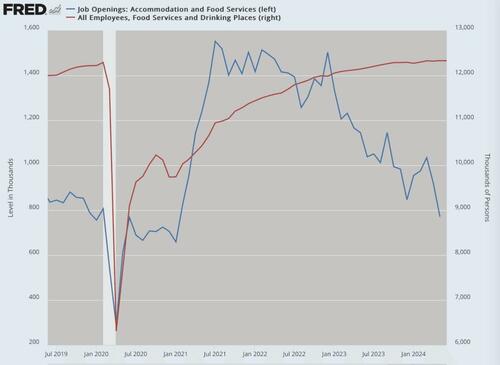
(Data: Federal Reserve Economic Data (FRED), St. Louis Fed; Chart: Jeffrey A. Tucker)
Hard times are coming and most people get this. It’s going to be difficult for the new presidential administration. There is no magic solution, as much as we might want one. All budgets, including government budgets, must be cut severely. We have no choice but austerity. It is going to come whether we want it or not.
The flight to value will continue. The new fashion will be for real jobs, real balance sheets, real assets, and real lives. It’s about time. Nothing in the political theater of our times will change this. These are extremely uncertain days, ripe for all sorts of possibilities. Let us all hope that we will choose freedom and sound money as the only real alternative to stagnation and collapse.
|
|
[Markets]
Is this ETF a ‘meme stock’ now? Google searches are spiking for one small-cap fund.
Investors have been increasingly looking for ways to join in on the rally in small-cap stocks, with Google searches for one small-cap ETF surging to a multiyear high last week.
Published:7/23/2024 4:50:20 PM
|
|
[Markets]
The surprising way the bond market is reacting to Trump vs. Harris
Published:7/23/2024 4:33:08 PM
|
|
[Markets]
Visa’s stock falls after earnings as payment-volume growth slows
Published:7/23/2024 3:49:38 PM
|
[Markets]
Alphabet Shares Unimpressed Despite Top- & Bottom-Line Beat
Alphabet Shares Unimpressed Despite Top- & Bottom-Line Beat
Alphabet reported better than expected top- and bottom-lines for the second quarter after the bell tonight.
-
Revenue $84.74 billion, estimate $84.37 billion
-
Revenue ex-TAC $71.36 billion, estimate $70.7 billion
-
EPS $1.89, estimate $1.84
Cloud revenues were particularly strong as the rest of the business segments were basically in line (with Ad revenue solid)...
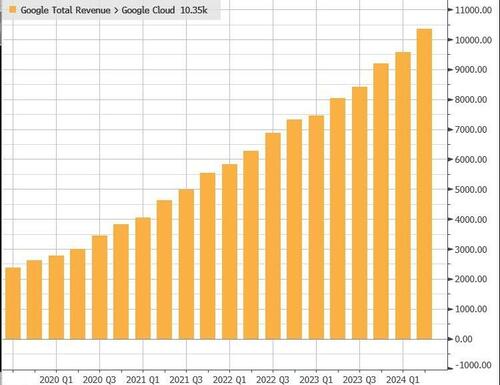
Ruth Porat, President and Chief Investment Officer; CFO said:
“We delivered revenues of $85 billion, up 14% year-on-year driven by Search as well as Cloud, which for the first time exceeded $10 billion in quarterly revenues and $1 billion in operating profit.
As we invest to support our highest growth opportunities, we remain committed to creating investment capacity with our ongoing work to durably re-engineer our cost base.”
Sundar Pichai, CEO, said:
“Our strong performance this quarter highlights ongoing strength in Search and momentum in Cloud. We are innovating at every layer of the AI stack.
Our longstanding infrastructure leadership and in-house research teams position us well as technology evolves and as we pursue the many opportunities ahead.”
The initial kneejerk reaction was 3-4% lower (perhaps on the lack of big beat), but that has reversed and GOOGL is trading higher in the after-hours...
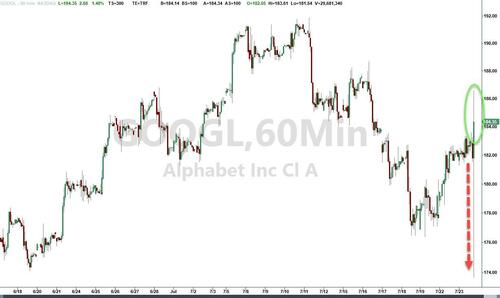
Let's see if this can hold...
|
|
[Markets]
Tesla earnings: Follow live coverage as EV maker's stock falls on profit miss
Published:7/23/2024 3:15:35 PM
|
|
[Markets]
U.S. stocks finish lower as investors await Tesla, Alphabet earnings
Published:7/23/2024 3:06:41 PM
|
[Markets]
Reuters 'Shock Poll' Finds Kamala Leading Trump, There's Just One Catch...
Reuters 'Shock Poll' Finds Kamala Leading Trump, There's Just One Catch...
With the Democrat corporate media machine in full swing behind Kamala Harris following President Joe Biden's shock announcement on Sunday that he's abandoning his 2024 presidential campaign, it was only a matter of time before a 'shock' poll had her beating Trump in a hypothetical matchup.

And here it is:

A new Reuters/Ipsos poll has found that Harris leads Trump 44% to 42% in the national poll (with a 3% margin of error).
Yet, there's a catch. As we noted in the 2016 and 2020 elections, pollsters had their thumb on the scale by oversampling Democrats.
Well, they've done it again - sampling 426 Democrat voters vs. 376 Republicans and 341 Independents.
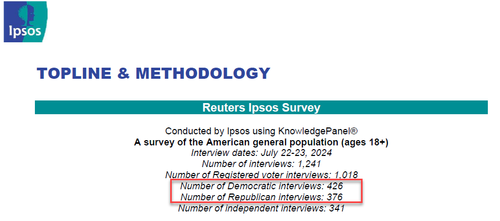
Meanwhile, other polls have Trump smoking Harris.
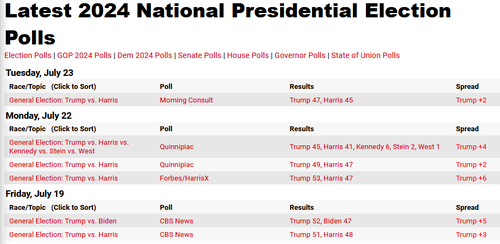
The prediction markets (PredictIt) show Harris trailing Trump 43 to 58.
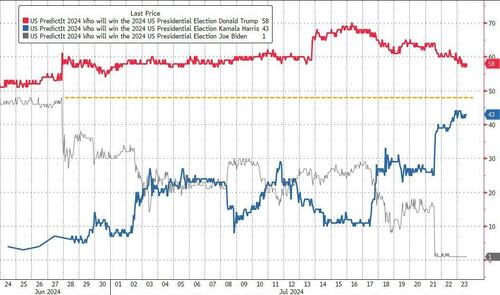
We can't wait for PBS to come out with their latest...
|
|
[Markets]
Southwest Airlines safety incidents draw FAA scrutiny
Published:7/23/2024 2:05:40 PM
|
|
[Markets]
Why a Harris victory and GOP Senate takeover is best outcome for consumer stocks
Published:7/23/2024 1:56:43 PM
|
|
[Markets]
Ethereum ETFs could be a game changer — turning big money investors into crypto converts
With spot ether ETFs now trading in the U.S., regulation builds confidence among institutional buyers.
Published:7/23/2024 1:56:43 PM
|
[Markets]
"He's Alive!!"
"He's Alive!!"
Update (1400ET): After six days of darkness, the leader of the free world has made a physical appearance, exiting a vehicle, mumbling incoherently at reporters, and carefully ascending the stairs of the smaller AF1...
"He's Alive!!"
Unless this is a 'cheap fake'? We'll wait to hear from KJP for confirmation.
* * *
As QTR submitted earlier via Fringe Finance, before I even start with my analysis, I want to make the point that I hope President Biden is doing fine and on the path to recovery from Covid, as his doctor claimed in a letter (I’ll discuss below) that he was. I hope we can take the administration at their word, but I also think it’s helpful to not ignore mounting critical questions for our country.
I don’t want to start the morning off with hyperbole or sensationalism, honestly, but rather with what, in my opinion, has developed as a legitimate question over the last 24 to 48 hours: is the current President of the United States still alive and/or fit to lead?
Ever since dropping out of the presidential race on Sunday via a letter with a signature that has been in question and conspicuously lacking the seal of the White House or President of the United States, President Joe Biden has failed to turn up anywhere in person.
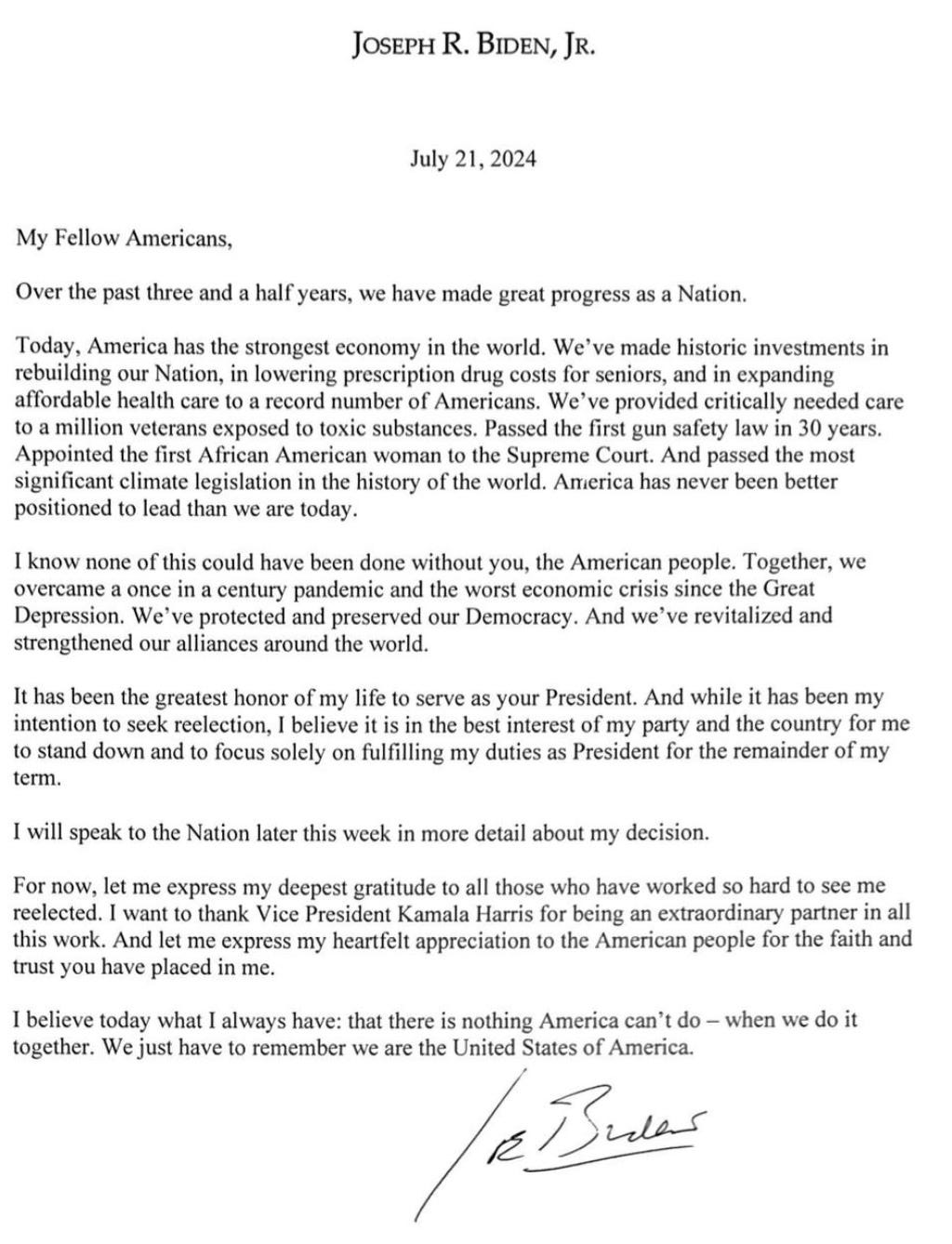
The swift decision to drop out of the race, combined with the announcement last week that Biden tested positive for Covid and would “self-isolate” —which incidentally came out after Biden said he would consider dropping out if it were due to a ‘medical condition’—combined with endless unproven rumors swirling on social media about a medical emergency, have left people no choice but to sadly consider a worst-case scenario.
Since Biden was last spotted on July 17 exiting Air Force One, he hasn’t been seen publicly, though reports have put him at his home “recovering” in Rehoboth Beach, Delaware.

As questions about Biden’s health began to swirl more and more over the last 48 hours, Biden‘s doctor released a note supposedly claiming Biden is on the path to recovery from Covid and had been administered Paxlovid. He wrote:
"President Biden completed his eighth dose of Paxlovid [an antiviral COVID-19 medication] this morning," O'Connor wrote. "His symptoms have improved significantly. His pulse, blood pressure, respiratory rate, and temperature remain absolutely normal. His oxygen saturation continues to be excellent on room air. His lungs remain clear.
"The President continues to tolerate treatment without any difficulty and will continue Paxlovid as planned. He continues to perform all of his presidential duties."
There was one little peccadillo I found interesting enough about this letter that I wanted to point out. Maybe it is overanalyzing and reading too much into things, but as an English major who sat through hundreds of hours of linguistics courses, I can’t help but notice things sometimes.
?? 50% OFF FOR LIFE: Zero Hedge readers take 50% off a Fringe Finance annual subscription for life by using this link: ZH50
The use of the word “absolutely” before “normal” in the above paragraph is a filler word. It’s unnecessary. It doesn’t add anything to the point that the sentence is trying to make, namely that Biden’s temperature is normal.
I have found that in some cases people add filler words when they’re trying to be overly convincing. I’m not saying this is the case in this instance, but every single news anchor who gave Donald Trump shit for constantly using the words “tremendous,” “strong,” “powerful,” and “big league” should tap back into that instinct, read this letter from Biden’s doctor, and let me know if I’m onto something or not.
Then we had Biden calling into a Kamala Harris campaign event yesterday. His scratchy voice boomed from the sky while a staffer hurriedly affixed a Presidential seal to the podium, as if he were there in person. Bizarre.
During the same endorsement, Kamala Harris appeared to almost admit Biden was on a recording (as opposed to being on the phone live).
Also bizarre is that the whole power structure of the Democratic Party and the 2024 campaign has shape-shifted without the presence of the current President of the United States in about three days. We’ve gone from Biden saying he won’t run again to Kamala Harris securing his delegates, fundraising cash and the backing of the entire party in less than 72 hours.
Why can’t government display this shocking level of efficiency all the time?
From there, last night Biden took the step of delegating some of his authority to support Ukraine to the Secretary of the Treasury and Secretary of State.

Biden has also, as of this morning, reportedly cancelled nine trips that were scheduled for the next two weeks, according to the New York Post. That doesn't sound like the travel schedule of someone on their way to a full recovery to taking back the Presidency for the next 5 months.
All told, I’m not going to try and play the “conspiracy theorist” again, but this site does admittedly “exist on the fringe” and does pride itself on trying to construct the objective truth using evidence, whether circumstantial or direct.
Right now, circumstantial evidence is, one stroke at a time, starting to paint a picture of it potentially being reasonable to question whether or not the President is healthy. After all, Democrats have lied about Biden’s mental health for years now — why wouldn’t they lie about his physical health?
Now, with every minute and hour that goes by, the whereabouts of President Biden will be the topic of discussion until he resurfaces, or at least shows his face.
Through a series of endorsements and behind-the-scenes string-pulling, all of Joe Biden’s necessary delegates have transferred to Kamala Harris in the short span of just a couple of days. Tens of millions of dollars in capital that have been raised for Biden have drifted to Kamala Harris via political osmosis. Rumors are abound about what additional turns the party may take at its own convention.
I would not be surprised to see a major geopolitical event take place this week given the precarious nature of the political situation in the United States right now. This is why it is extremely important for Democrats to level with the public and consolidate power behind somebody — Blinken, Harris, throw a dart — as quickly as possible.
This isn’t a time for window dressing; it’s a time to remind the world that somebody is still running the country for the next five months until the election.
If we do find out that President Biden is doing worse than expected or has tragically passed away this week, it’s going to beget a new host of questions: namely, how long has the President been in such a position, and who has been communicating publicly on his behalf, and with the approval of whom?
My guess is by the end of the week we’re going to have plenty more answers, but waiting in presidential limbo for the time being becomes an Achilles heel for the country. I’d say this no matter what party was in power: this situation needs to be dealt with swiftly, seriously, and transparently, not with PR spin, bluster, lies, and opacity.
Now, it isn’t just the party: the country is in disarray. We need answers.
I welcome your thoughts on the matter at our ongoing discussion here.
Now read:

QTR’s Disclaimer: Please read my full legal disclaimer on my About page here. This post represents my opinions only. In addition, please understand I am an idiot and often get things wrong and lose money. I may own or transact in any names mentioned in this piece at any time without warning. Contributor posts and aggregated posts have been hand selected by me, have not been fact checked and are the opinions of their authors. They are either submitted to QTR by their author, reprinted under a Creative Commons license with my best effort to uphold what the license asks, or with the permission of the author. This is not a recommendation to buy or sell any stocks or securities, just my opinions. I often lose money on positions I trade/invest in. I may add any name mentioned in this article and sell any name mentioned in this piece at any time, without further warning. None of this is a solicitation to buy or sell securities. These positions can change immediately as soon as I publish this, with or without notice. You are on your own. Do not make decisions based on my blog. I exist on the fringe. The publisher does not guarantee the accuracy or completeness of the information provided in this page. These are not the opinions of any of my employers, partners, or associates. I did my best to be honest about my disclosures but can’t guarantee I am right; I write these posts after a couple beers sometimes. I edit after my posts are published because I’m impatient and lazy, so if you see a typo, check back in a half hour. Also, I just straight up get shit wrong a lot. I mention it twice because it’s that important.
|
|
[Markets]
Lineage anchors busiest dollar-volume week for IPOs so far in 2024
Published:7/23/2024 1:11:06 PM
|
|
[Markets]
Tesla needs to show off its AI muscle the way Nvidia already has
Nvidia seems a better value than Tesla now, but both stocks have compelling upside potential.
Published:7/23/2024 1:01:58 PM
|
|
[Markets]
The energy transition from fossil fuels will power these stocks —including Big Oil
Natural gas, LNG and pipeline plays will be a bridge to renewables from petroleum and coal.
Published:7/23/2024 12:53:06 PM
|
[Markets]
The Party Of 'Democracy" Will Now Choose Your Candidate For You
The Party Of 'Democracy" Will Now Choose Your Candidate For You
Authored by Ryan McMaken via The Mises Institute,
On Sunday, July 21, President Biden dropped out of the 2024 presidential campaign via a text-only post on Twitter/X.
Less than an hour later, Biden - also via a text-only post on Twitter/X - endorsed vice president Kamala Harris for the presidency.
Thus, in just a few minutes, the ruling party in Washington completely erased the primary election process from one of the country’s major parties.
That is, the same Democratic party that tells us it is the party of “democracy” just completely cut ordinary voters out of the selection process for the Democratic nominee.

Instead, the Democratic nominee in 2024 will be chosen by a small group of elite party insiders. We’re told there will be an “open convention” in Chicago to choose the nominee, but all that means is that that there is no pre-determined nominee going into the convention. In any case, however, the nominee will be chosen by delegates and superdelegates (i.e., wealthy party elites like Hillary Clinton and Barack Obama) behind closed doors.
The Democratic party’s efforts to circumvent the primary process are quite remarkable for a ruling coalition that lectured the general public endlessly in 2020 about how Donald Trump was allegedly a “threat to democracy” and how “democracy is on the ballot.”
Yet, this is what we’ve come to expect from political elites who use the term “democracy” as a propaganda term. For these people, the term has no objective meaning, it just means “something we like.” “Anti-democratic,” in contrast, just means “something we don’t like.”
Moreover, its use as a propaganda term can be seen in the way that “democracy” is used in the same way as “revolutionary” by Marxist regimes. In such cases “revolutionary” is code for “in favor of the ruling elites” and “something we like.” Similarly, the opposite of “democracy” in a Marxist regime is “counterrevolutionary” or “bourgeois.” Those terms were essentially code for “against the ruling party” and “thing we don’t like.”
Such terms have no actual content in the usual sense of a word. Thus, the term “democracy” simply means “good” and “not democratic” means “evil.”
For example, President Joe Biden delivered two major speeches in 2022 on how “democracy” will supposedly be abolished if his opponents win. In November of that year, former president Barack Obama solemnly intoned that if Republicans win in Arizona, “democracy as we know it may not survive.” This is repeated among the party’s media allies. One writer at Salon chastised voters for daring to let their votes be influenced by economic concerns when “democracy is under threat.” One New York Times headline bemoaned the apparent reality that voters don’t seem interested in “saving democracy” when it’s supposedly all so clear that “democracy is in peril.” At no point in these jeremiads is it ever explained how a vote for the out-of-favor candidate will actually end elections or universal suffrage or any other event or institution associated with democracy.
In Biden’s September 2022 speech in Philadelphia, he went on for twenty minutes about an imagined threat to democracy, without ever actually defining what democracy is. One was reminded of Fidel Castro howling in his multi-hour speeches about the threat to “the revolution” from insidious imperialists and counterrevolutionaries—by which he meant anyone who opposed his regime. The term “revolutionary” had no connection to actual revolution in this context. It simply meant “something my regime likes.”
Meanwhile, the elites have gone to great lengths to ensure that no actual democracy—in the technical or traditional sense—has taken place in the nomination process. The Democratic Party made it clear that it would not allow any presidential hopefuls to challenge Biden to a debate. Early Democratic challengers Congressman Dean Phillips and Marianne Williamson were told to get lost. The most significant challenger within the party, Robert F. Kennedy, Jr., was effectively expelled from the party in October 2023. He was forced to declare his candidacy as an independent candidate soon after.
So, after denying Democratic voters the chance to vote on Kennedy or anyone else, the party has now also denied the voters the chance to vote on Harris or whoever else the party elites will decide is the nominee in 2024.
I don’t mention any of this to burnish the reputation of the Republican Party, by the way. Those of us who remember the Ron Paul campaigns in 2008 and 2012 remember how the GOP conspired to torpedo his campaign, going so far as to change the convention rules, ex post facto, to deny Paul a prime-time speaking position and to disenfranchise his delegates.
Yet, it’s not the GOP that’s claiming to be the guardian of the vox populi while conspiring to undermine that vox at every turn.
Rather, the alleged protectors of democracy carry on the tradition of redefining the term “democracy” to serve the interests of the elites whenever it suits their purposes. We see this not only in America, but globally. Any time the “wrong” people win an election—”wrong” according to global elites—the outcome of the election is declared a “threat to democracy.” We see this repeatedly in European politics where “democracy” is defined as support for the unelected European commission. German political elites, meanwhile, have repeatedly declared the rightwing AfD party a “threat to democracy” because party members keep winning elections. In Latin America, “democracy” means to support the social-democratic left. When rightwing Jair Bolsonaro was elected in Brazil, that was denounced as anti-democratic. When leftwing Brazilian president Dilma Rousseff was impeached by a democratically elected legislature, that was denounced as an anti-democratic coup. Democratically elected Javier Milei was denounced by uber-establishment magazine The Economist as “a danger for democracy.”
It is now clear that to be in favor of democracy in 2024 is to support whatever the ruling party elites want you to support. To be “pro-democracy” now apparently means to vote for the candidate selected for you by party elites in secret meetings. According to the ruling elites, in a true “democracy,” there’s no voting allowed.
|
|
[Markets]
Prescription-drug middlemen face mounting bipartisan criticism on Capitol Hill
Top executives at the largest U.S. pharmacy-benefit managers sought to defend their business practices on Capitol Hill on Tuesday, as lawmakers on both sides of the aisle excoriated the industry’s impact on the cost and accessibility of prescription drugs.
Published:7/23/2024 12:01:13 PM
|
|
[Markets]
AMC debt restructuring sparks more buying in the movie-theater chain’s junk bonds
Movie-theater chain and original meme stock AMC’s debt-restructuring deal has sparked buying activity in the company’s bonds.
Published:7/23/2024 10:58:05 AM
|
[Markets]
DOJ Magically Finds 117 Pages Of Biden Transcripts
DOJ Magically Finds 117 Pages Of Biden Transcripts
The Department of Justice admitted to a federal judge on Monday that it has located 117 pages of transcripts it previously denied having, related to President Joe Biden's interviews with a biographer which played a role in the recently completed criminal investigation of his handling of classified material before he became president.
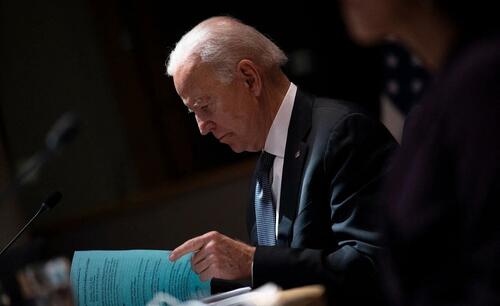 Photo: Brendan Smialowski, Getty Photo: Brendan Smialowski, Getty
The investigation from special counsel Robert Hur found concluded that while Biden likely mishandled classified info, no reasonable prosecutor would bring charges against him for coming off as "a well-meaning, elderly man with a poor memory."
What followed was a flood of Freedom of Information Act (FOIA) requests from news organizations and conservative groups seeking information - including audio recordings of Biden's interviews with Hur - which the DOJ refuses to release over fears that they could be used to create 'deepfakes' of the president. The groups, meanwhile, maintain that the DOJ is covering up Biden's severe cognitive decline.
It’s unclear whether his exit from the race will affect the handling of Hur’s materials by the Justice Department, which has argued that the release of audio of Biden’s interviews with Hur would violate the president’s privacy, lead to potential abuse — such as deepfakes — and deter other witnesses from agreeing to recorded interviews. Biden asserted executive privilege over the audio recordings of his interviews in a bid to head off House Republicans’ effort to hold Attorney General Merrick Garland in contempt of Congress for refusing to release the recordings. -Politico
At one hearing last month, the DOJ told US District Judge Dabney Friedrich that it would be 'highly time-consuming' to process other audio files containing Biden's interviews with biographer Mark Zwonitzer, which apparently consist of some 70 hours of recordings that the DOJ says is far more difficult to review and process than written material.
"We don’t have some transcript that’s been created by the special counsel that we can attest to its accuracy," said DOJ attorney Cameron Silverberg in a June 18 hearing in front of Friedrich, in a suit brought by the Heritage Foundation, Politico reports.
On Monday, however, Silverberg admitted in the Monday filing that the department had "in the past few days" confirmed that Hur's office had created transcripts of Biden's discussions with Zwonitzer for memoirs published in 2007 and 2017.
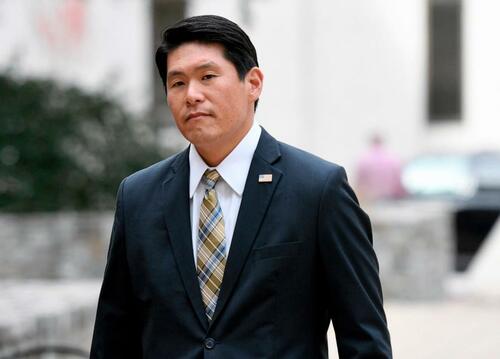
Hur's team determined that some of those conversations contained classified information, however the DOJ barred prosecutors from pursuing charges against a sitting president.
"In the past few days…the Department located six electronic files, consisting of a total of 117 pages, that appeared to be verbatim transcripts of a small subset of the Biden-Zwonitzer audio recordings created for the SCO by a court-reporting service," reads the new filing.
|
|
[Markets]
Home prices hit fresh record high, pushing sales down for fourth straight month
Published:7/23/2024 10:49:40 AM
|
|
[Markets]
Here’s why General Motors’ beat and raise was not enough to lift the stock
Unexpected loss in China drags down GM’s stock, while carmaker will also take $600 million charge for troubled Cruise autonomous-vehicle unit
Published:7/23/2024 10:32:37 AM
|
|
[Markets]
Delta under investigation for its handling of flight delays after IT outage
Transportation Secretary Pete Buttigieg said officials have begun an investigation into Delta Air Lines after a global IT outage that left thousands of passengers stranded.
Published:7/23/2024 10:23:29 AM
|
